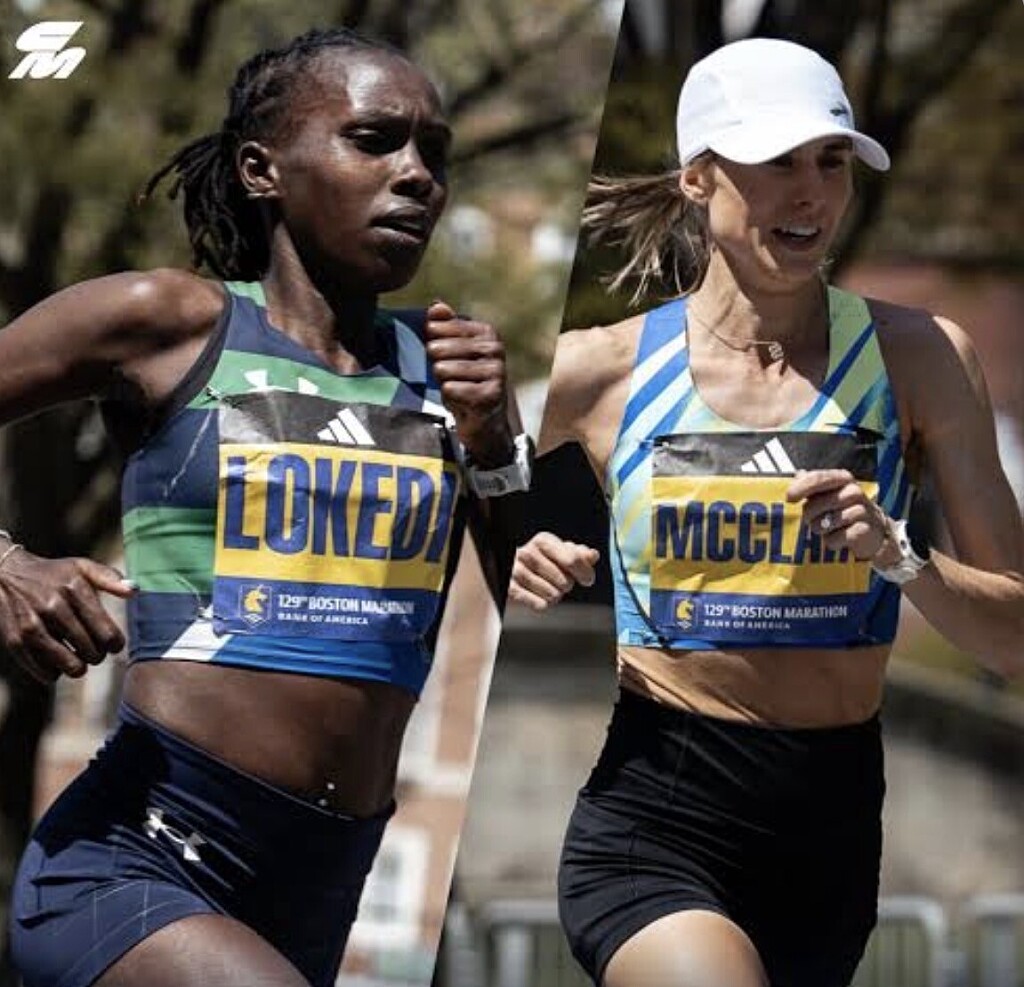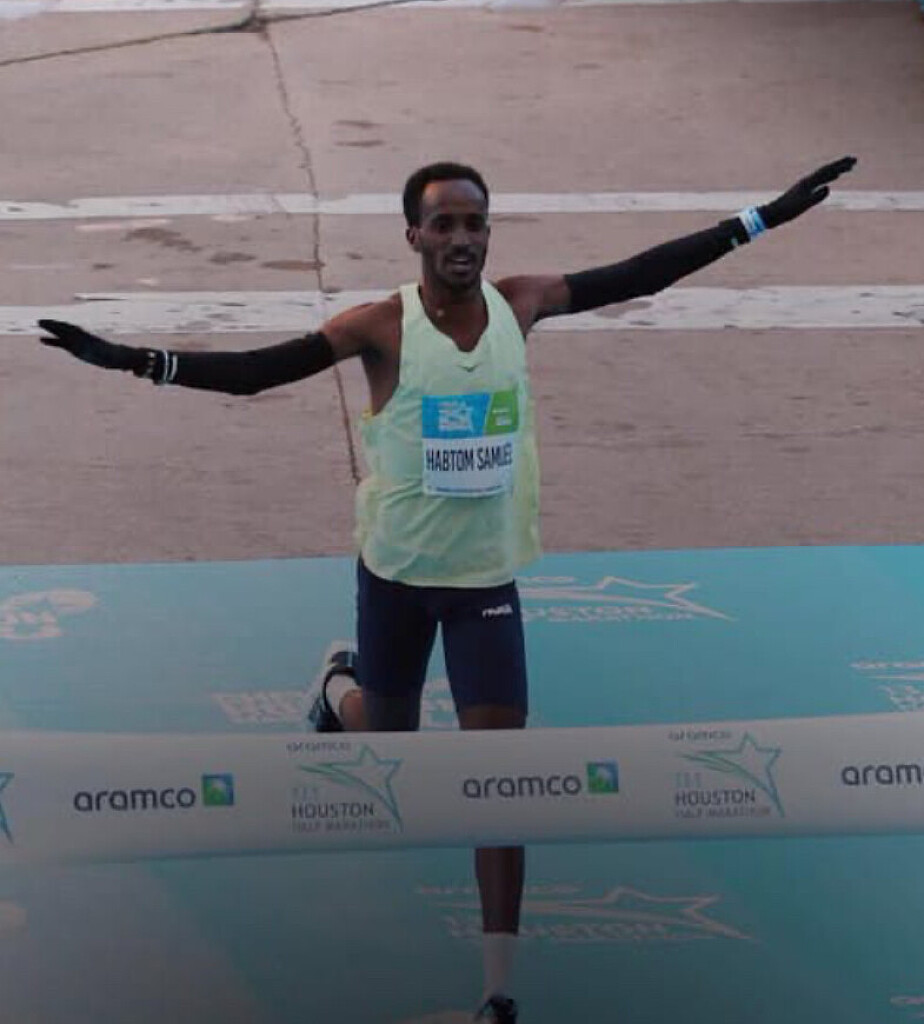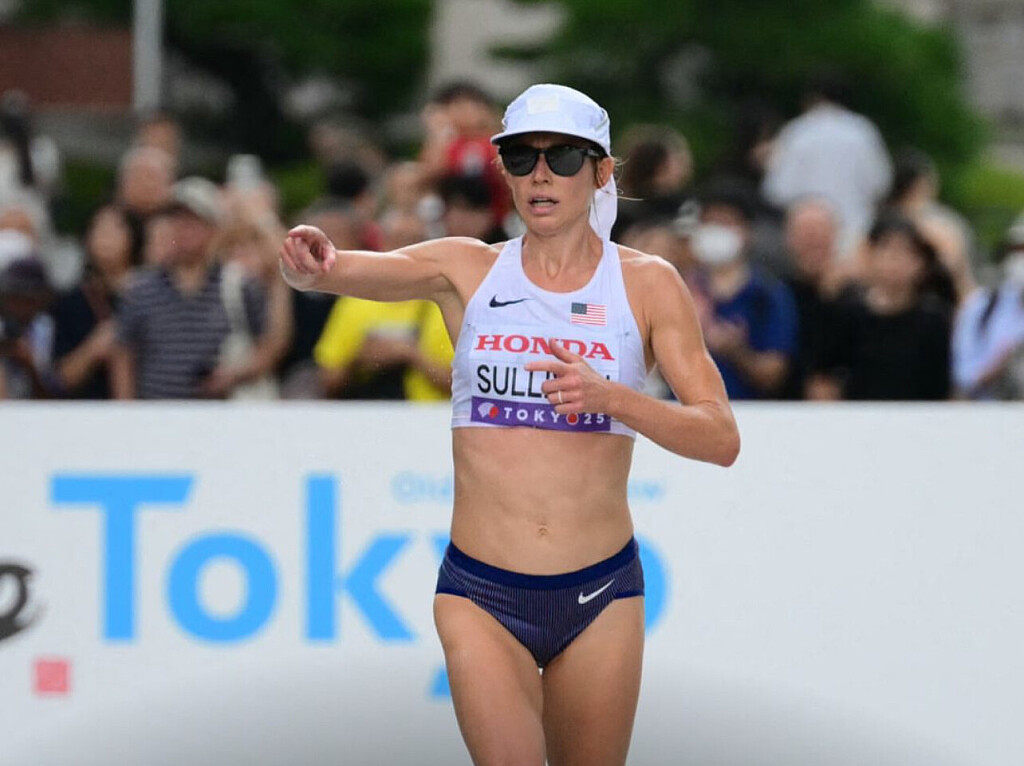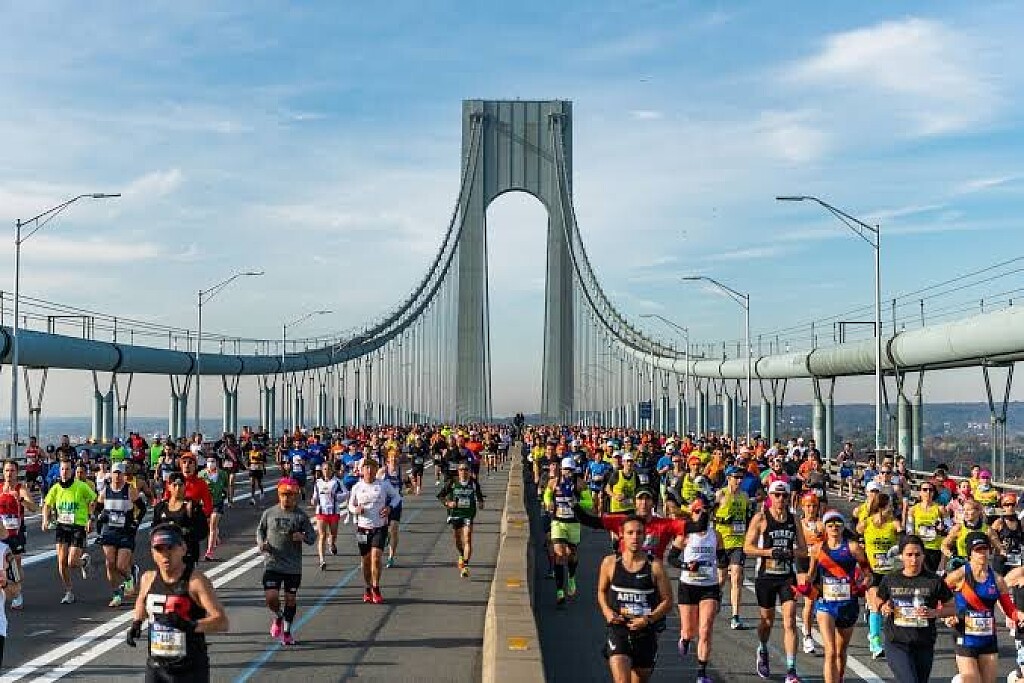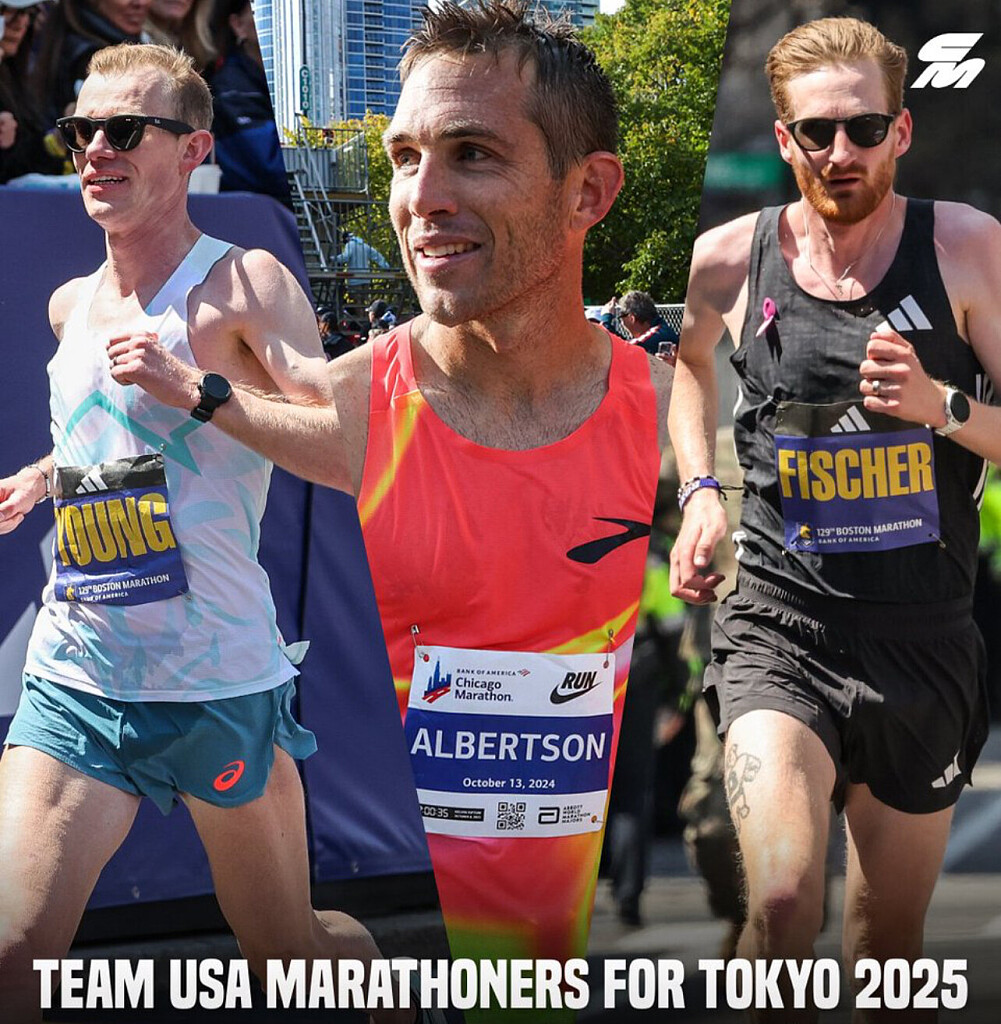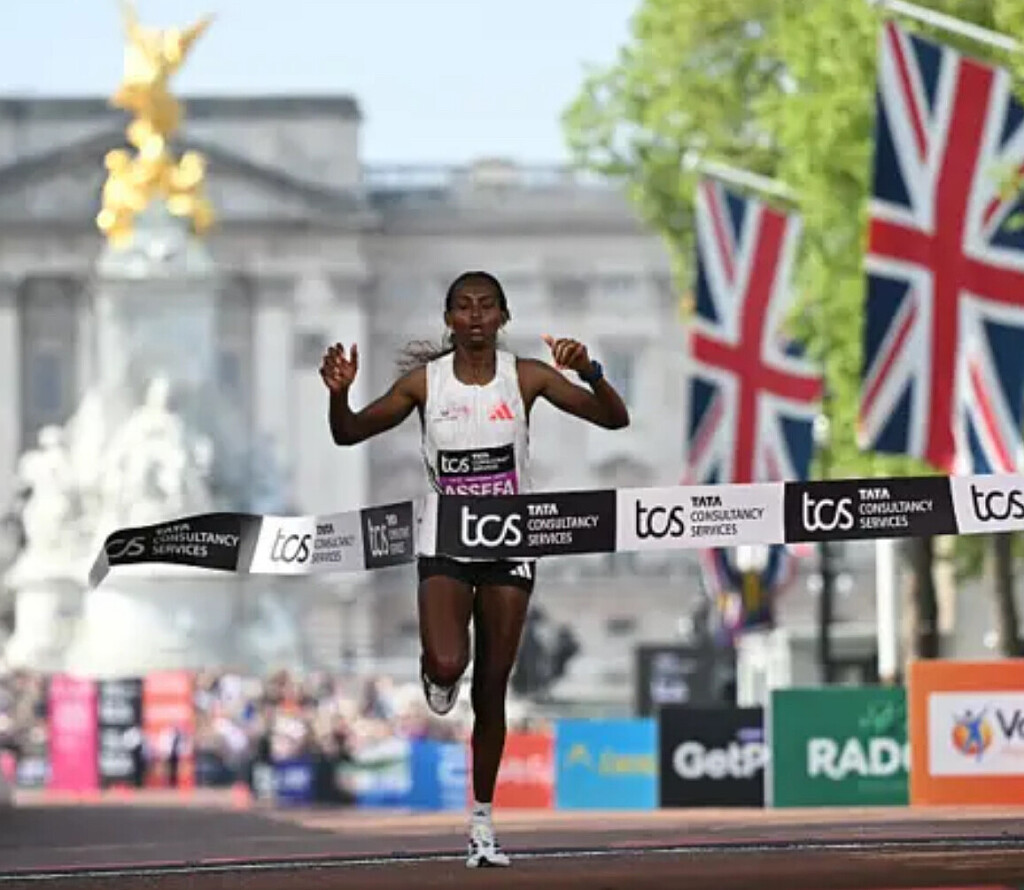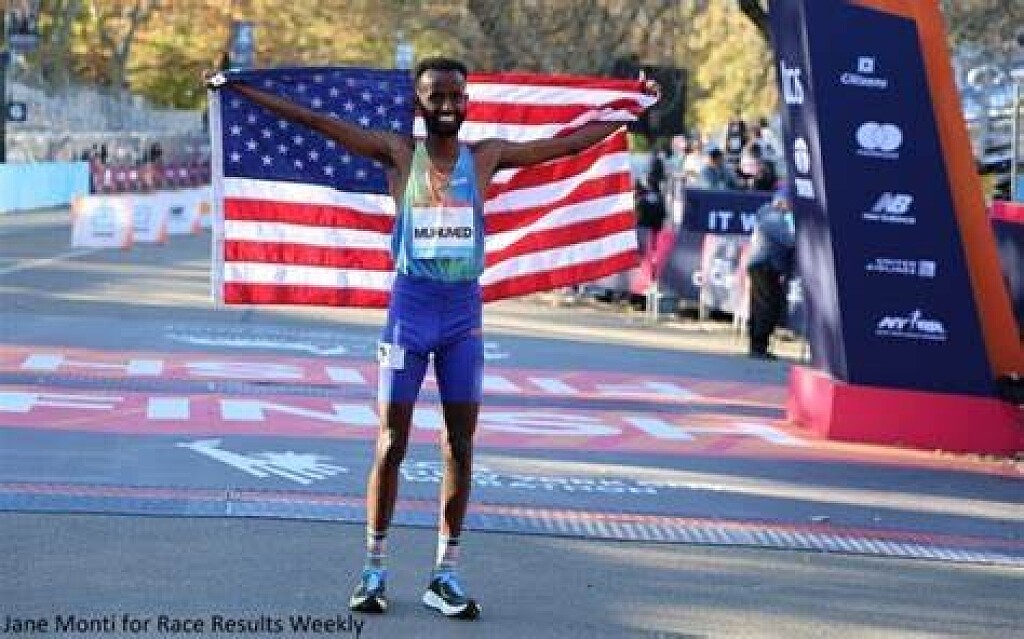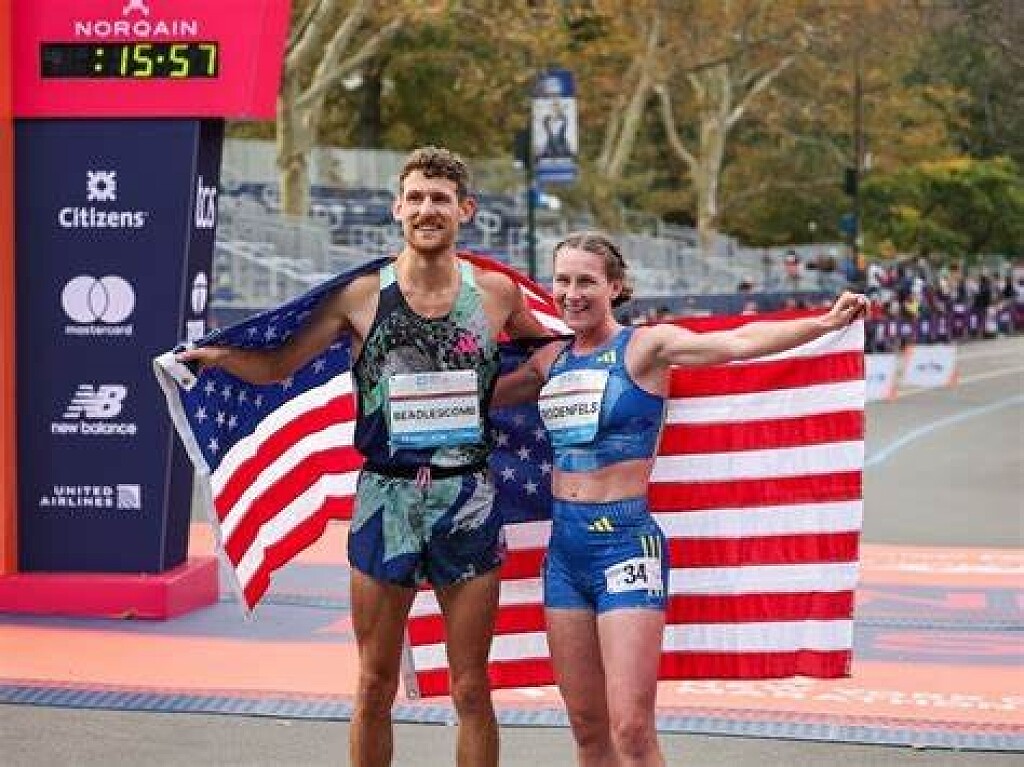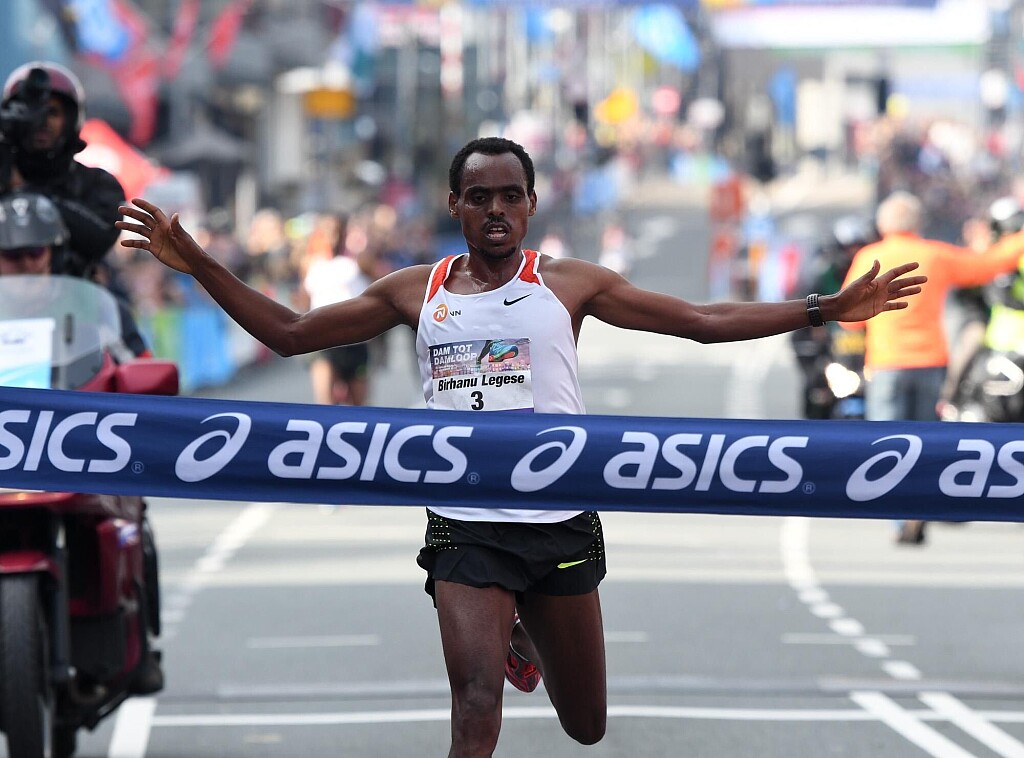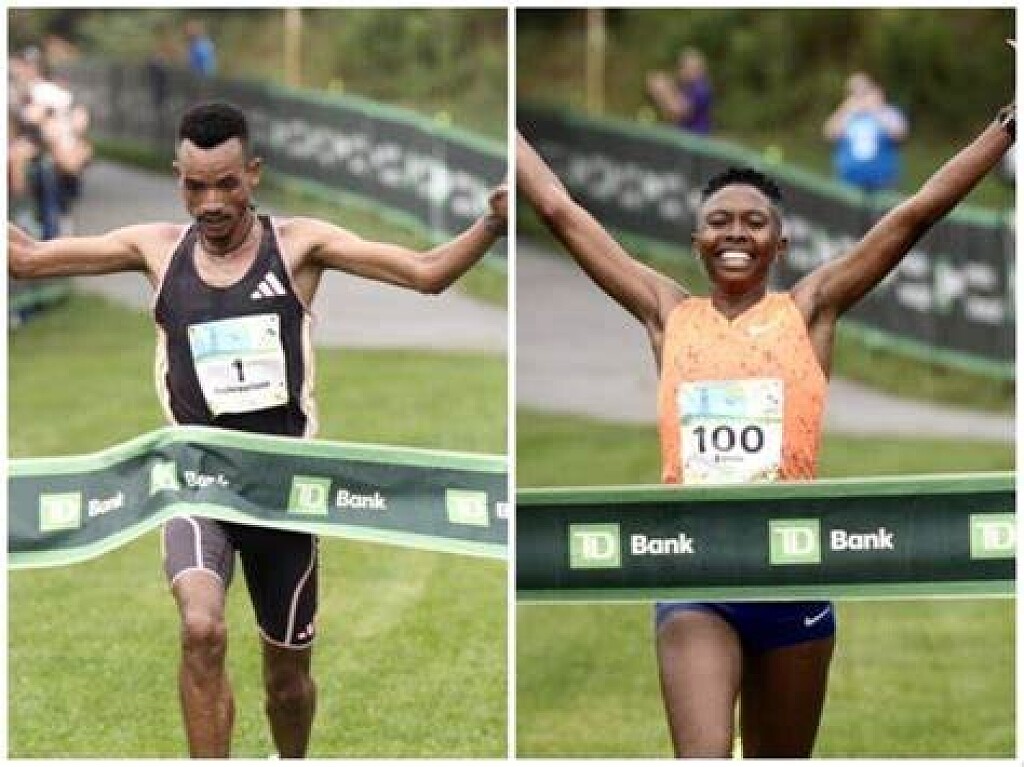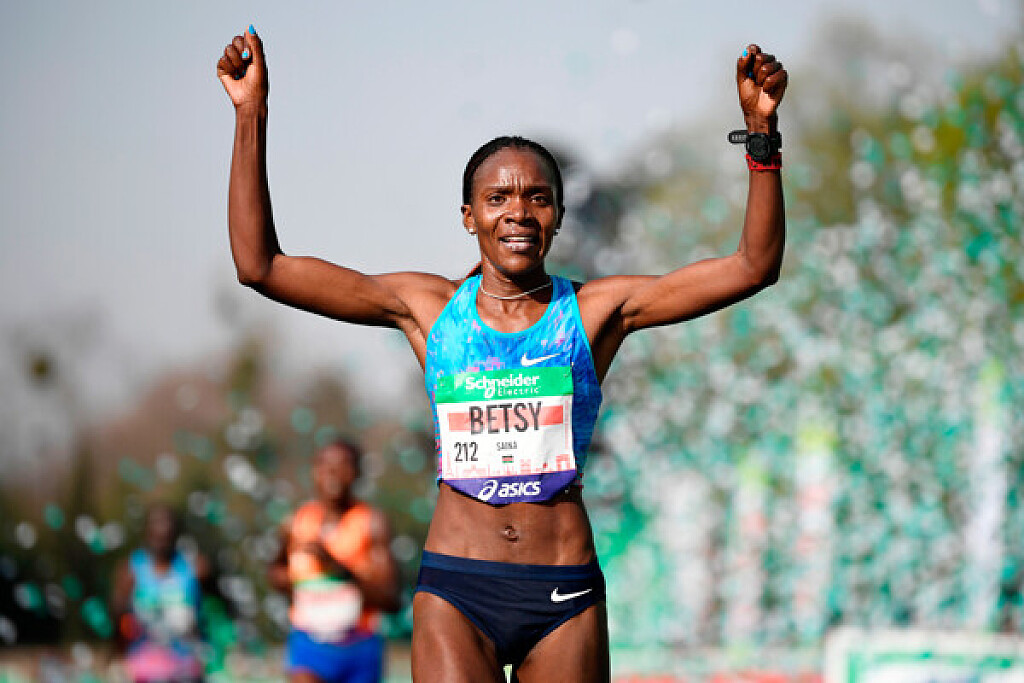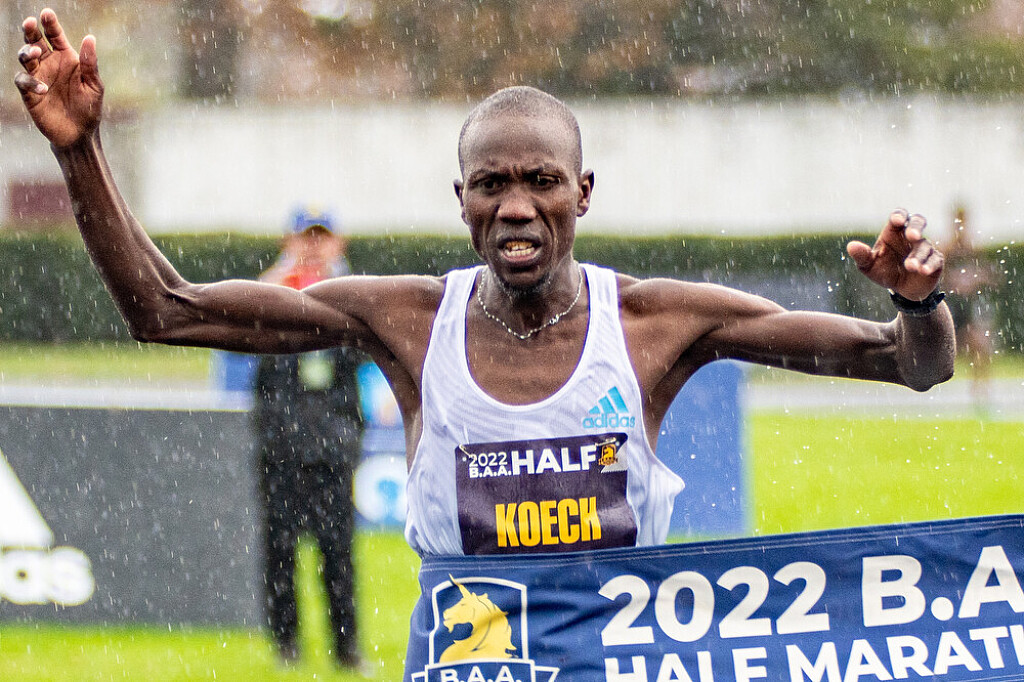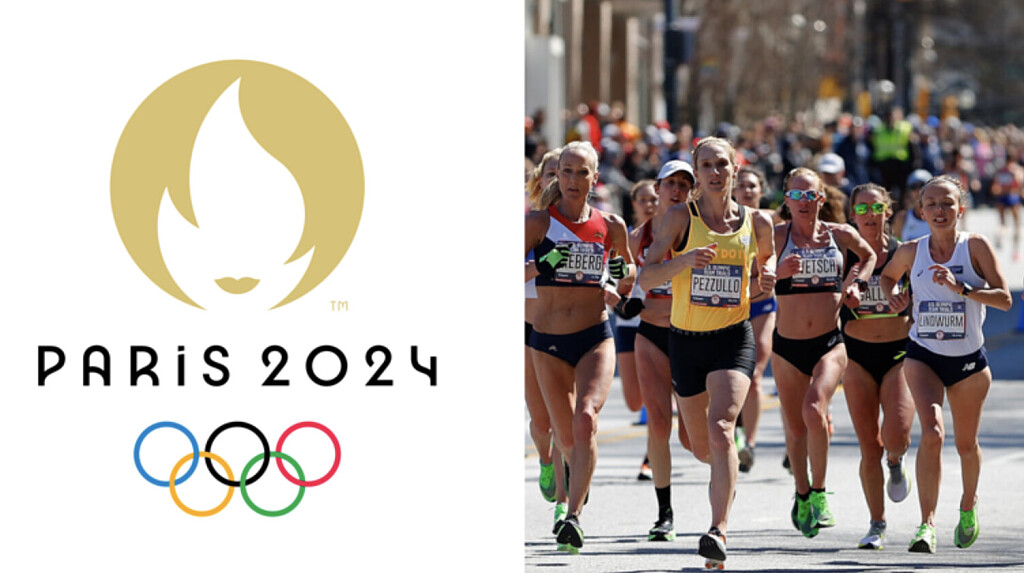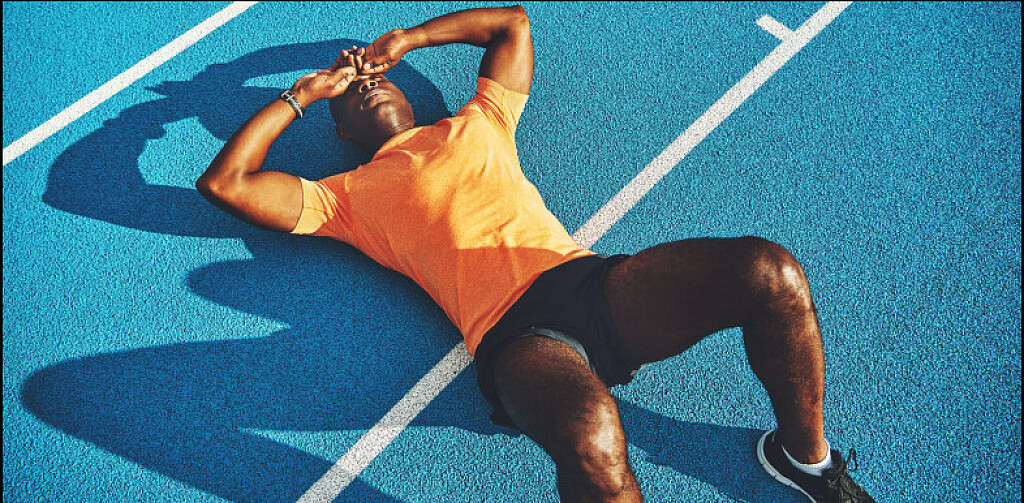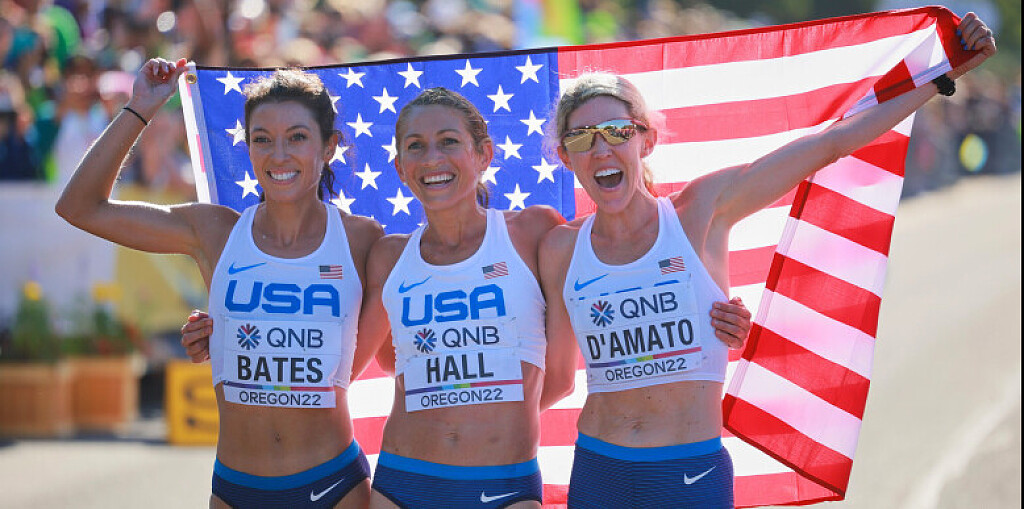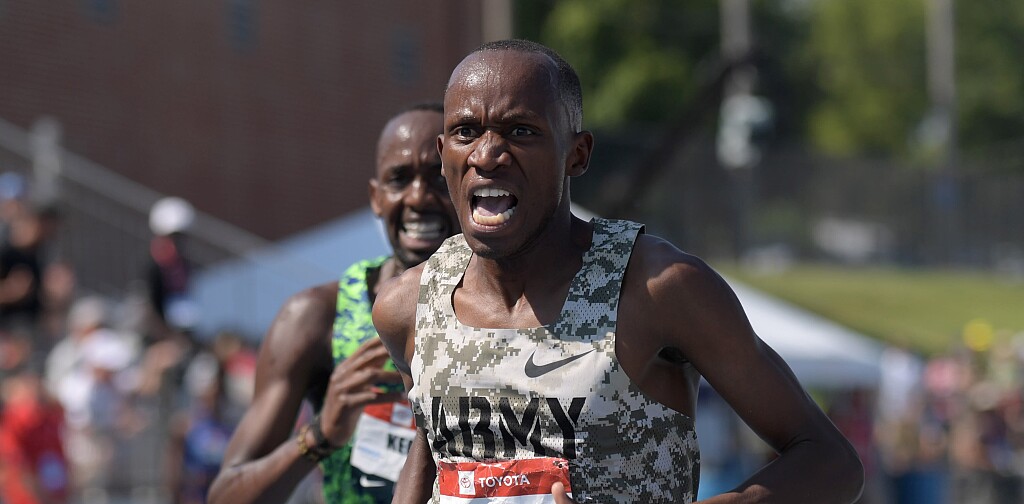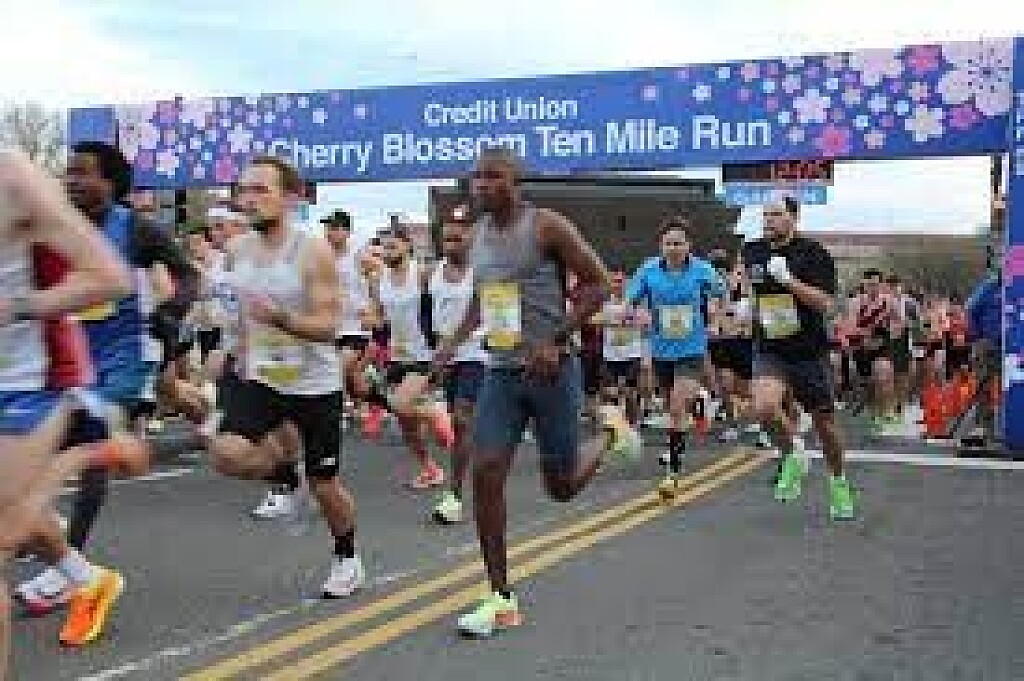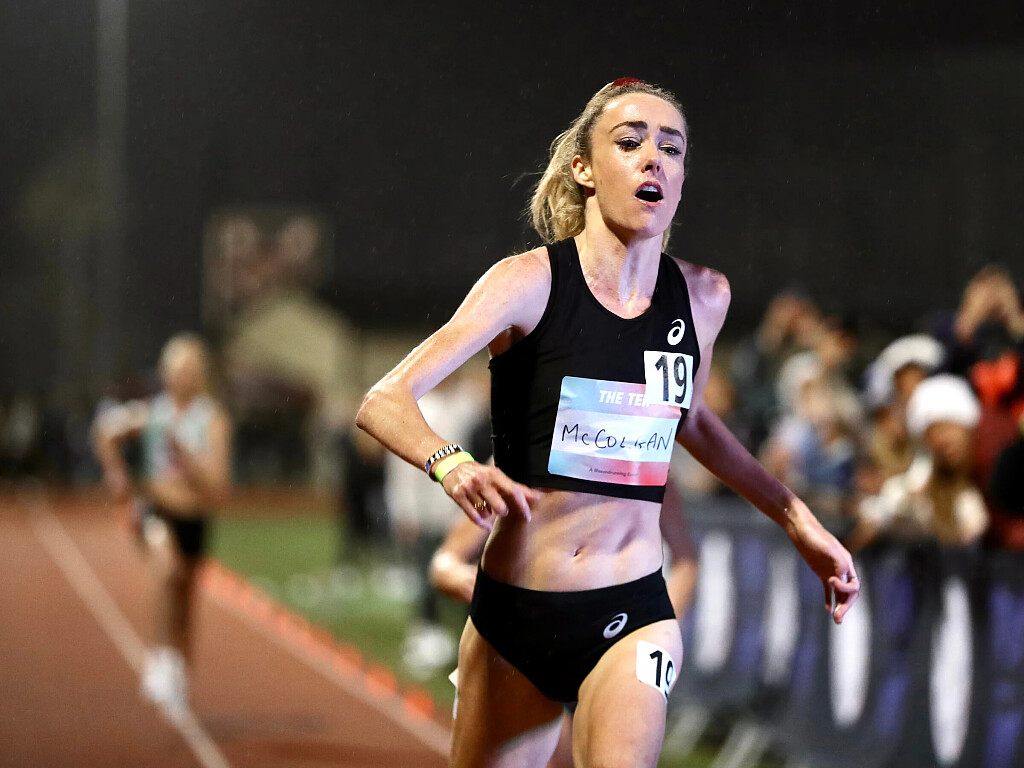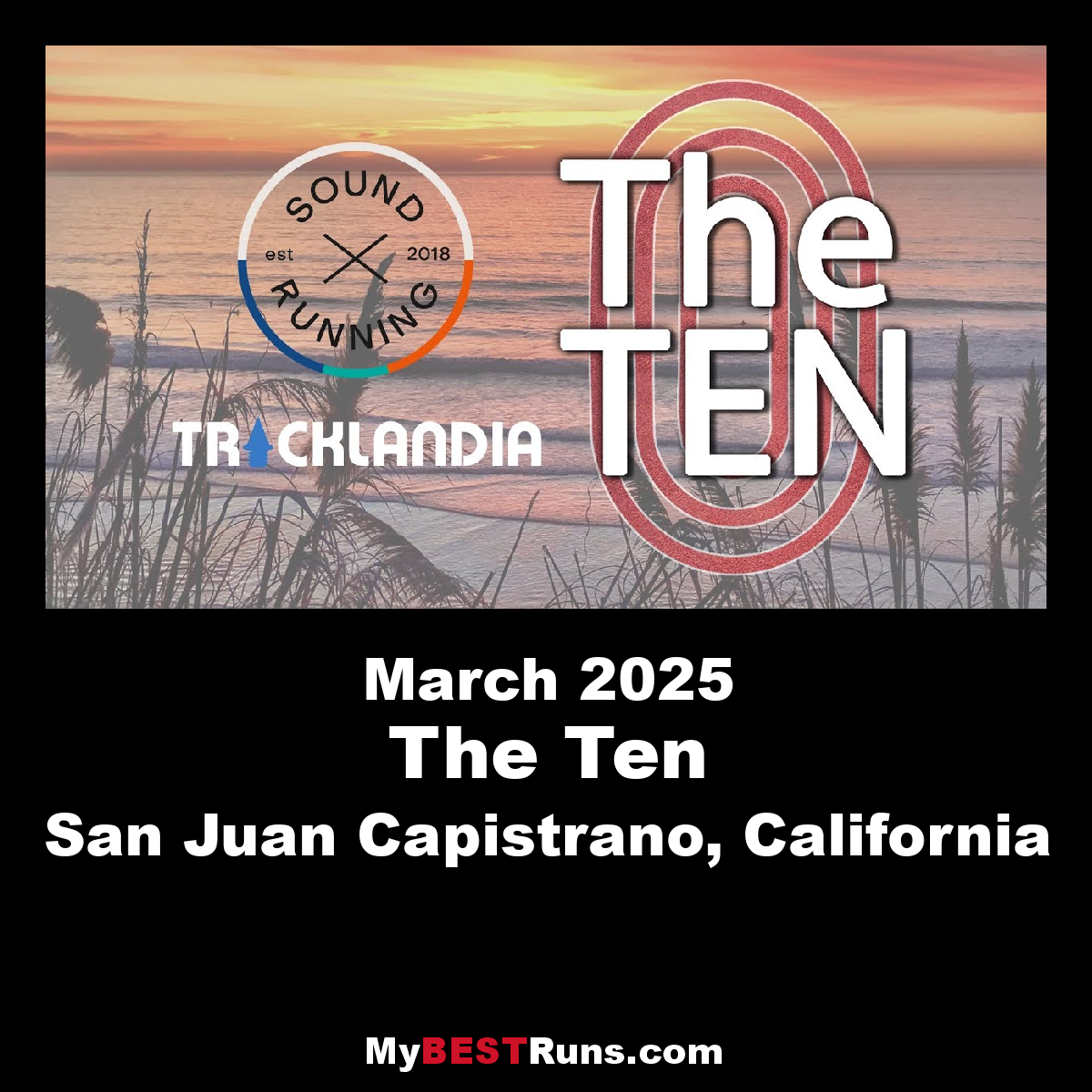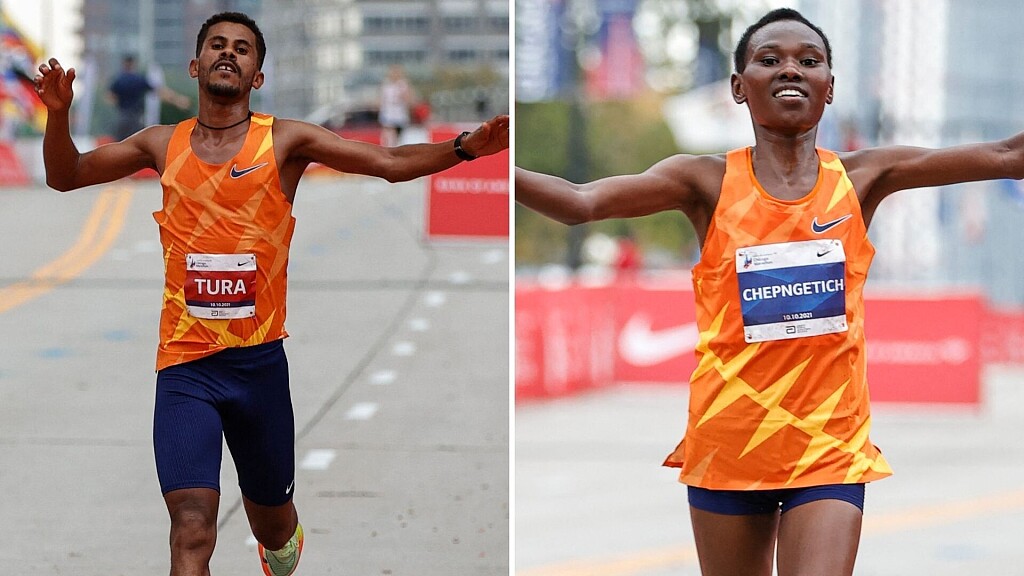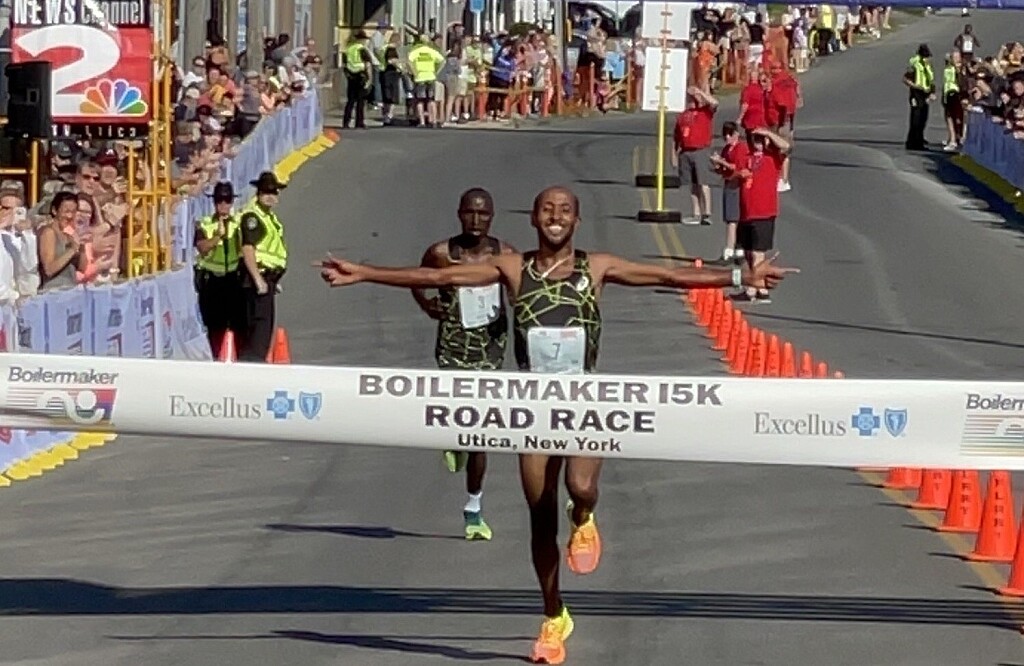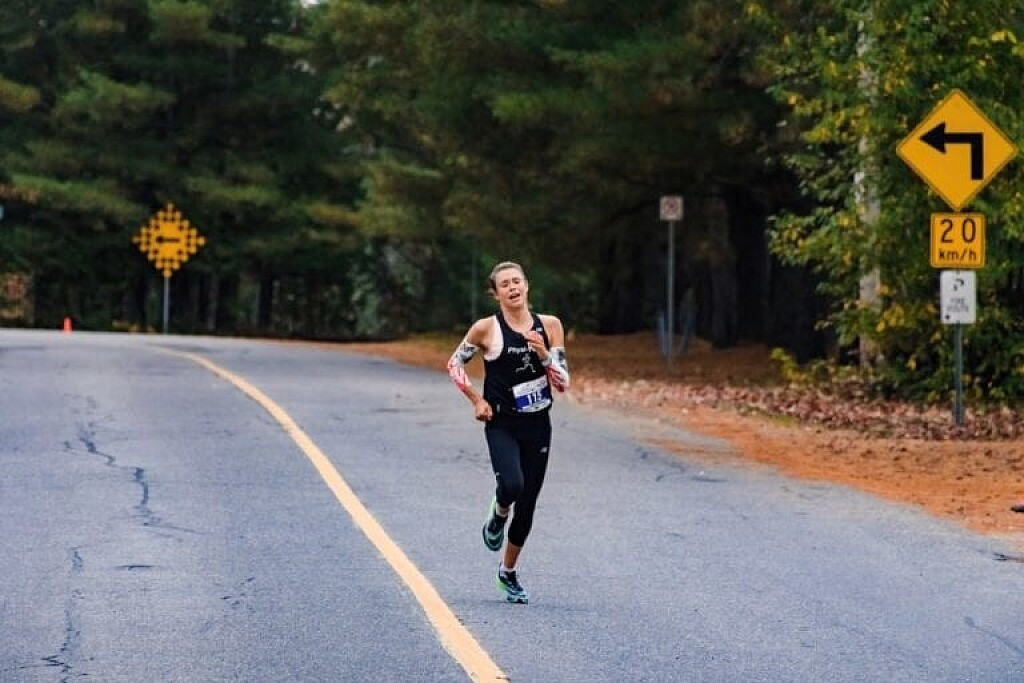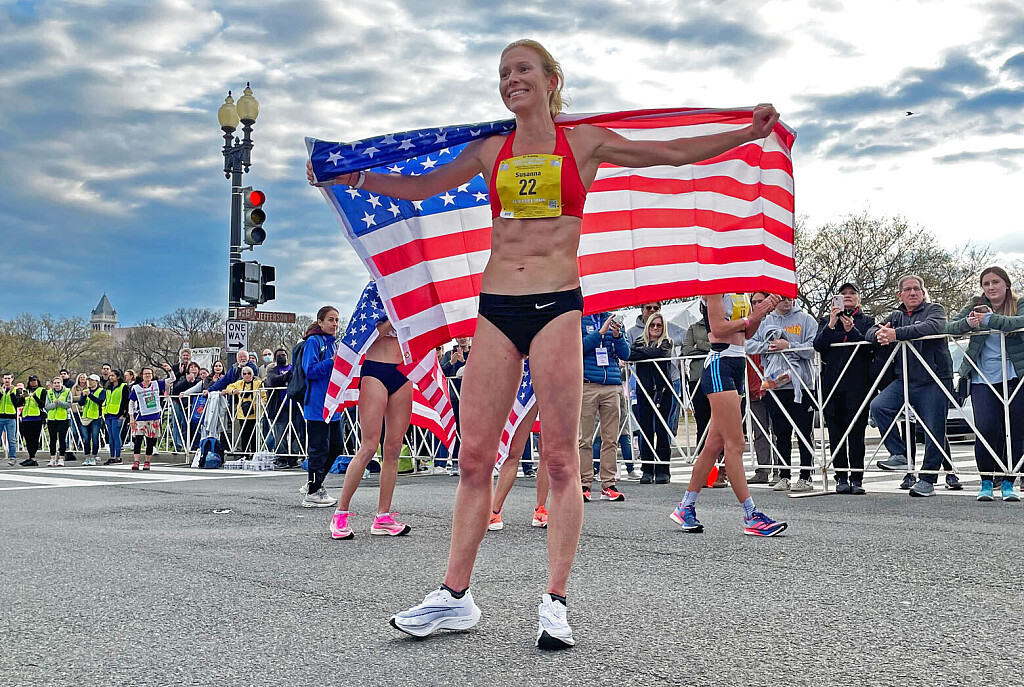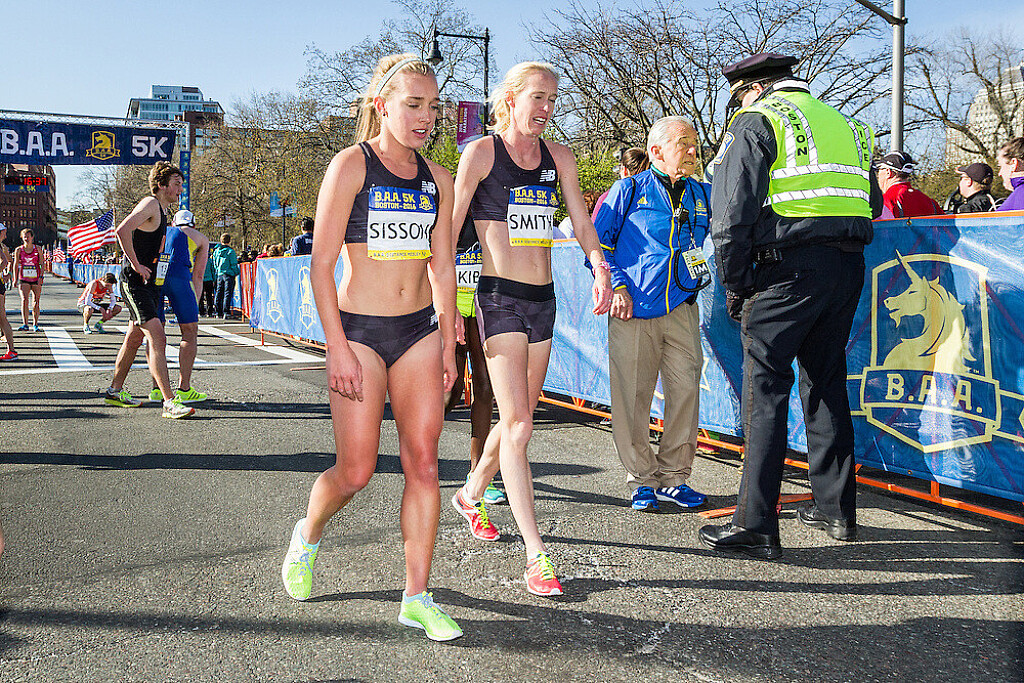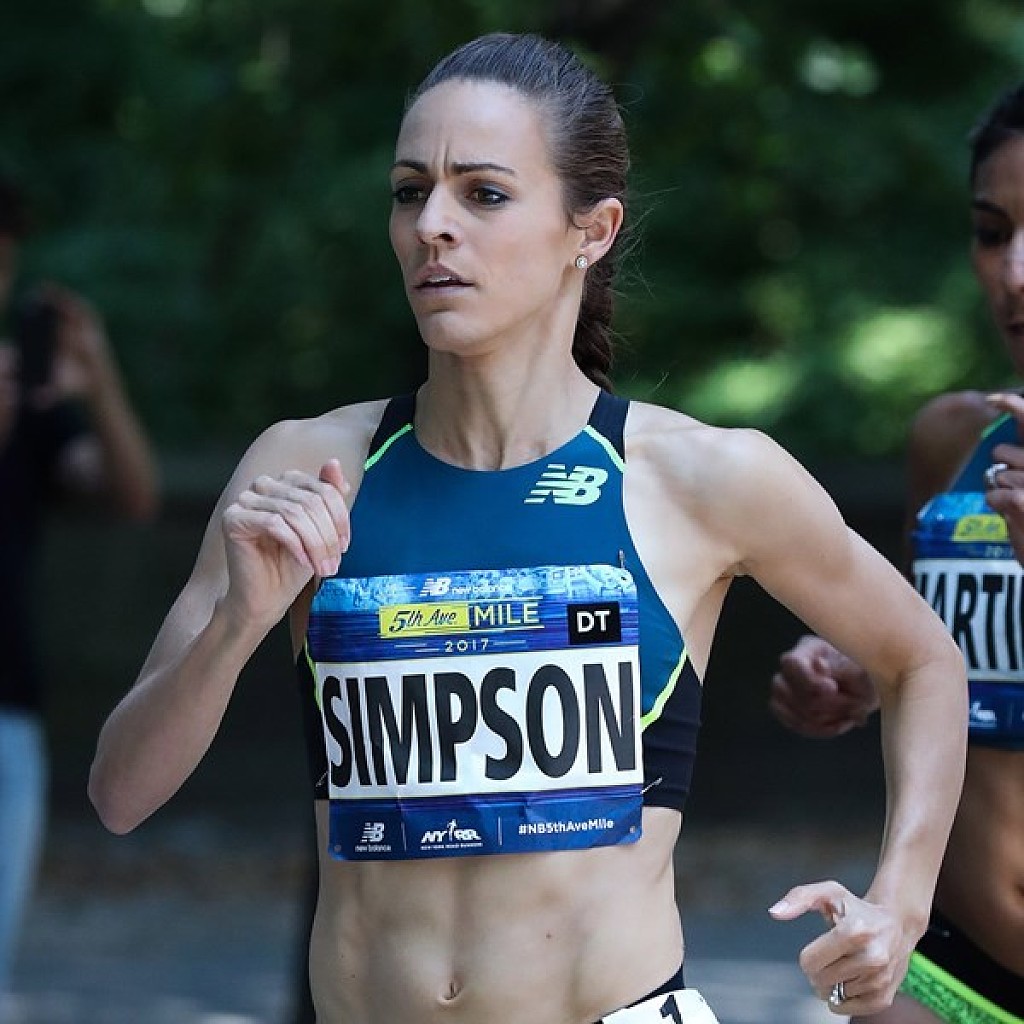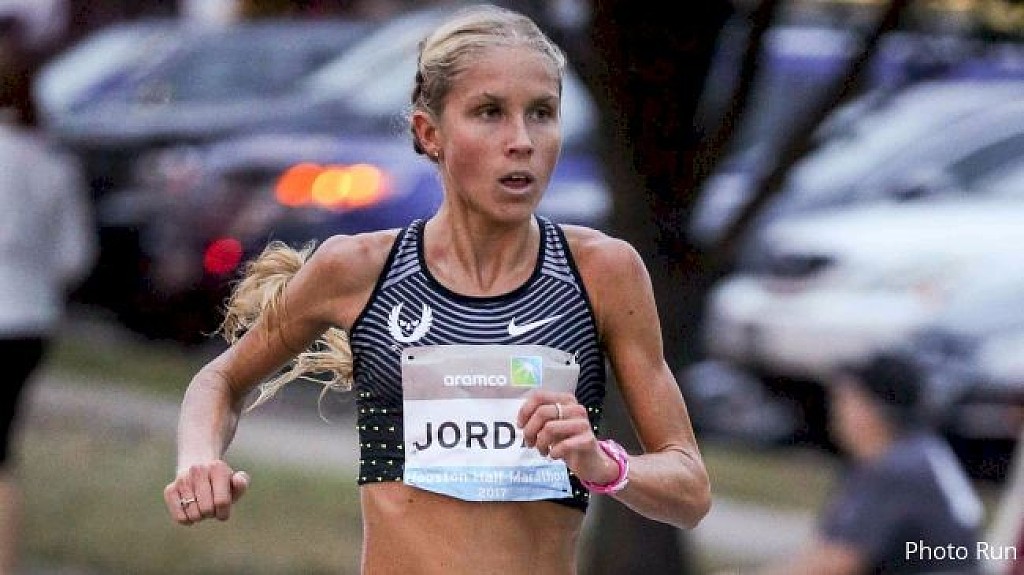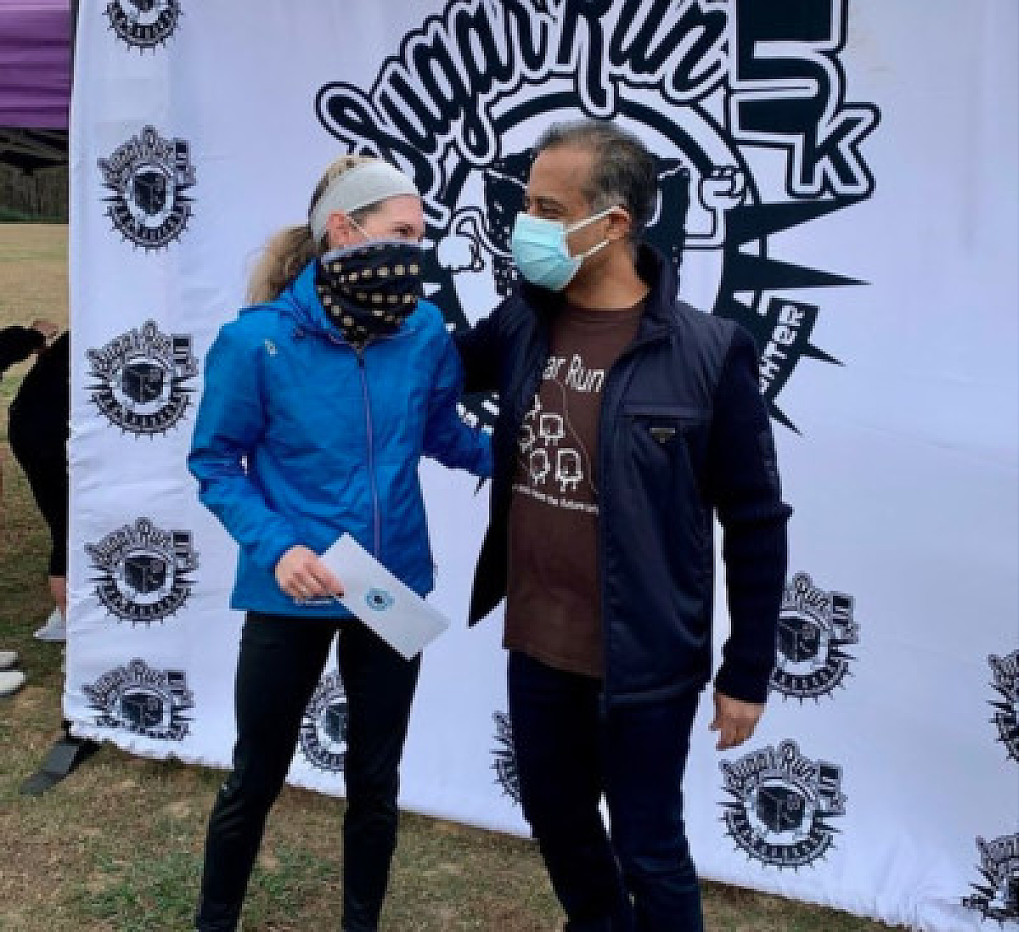Running News Daily
Running News Daily is edited by Bob Anderson. Send your news items to bob@mybestruns.com Advertising opportunities available. Train the Kenyan Way at KATA Kenya and Portugal owned and operated by Bob Anderson. Be sure to catch our movie A Long Run the movie KATA Running Camps and KATA Potato Farms - 31 now open in Kenya! https://kata.ke/
Index to Daily Posts · Sign Up For Updates · Run The World Feed
Articles tagged #Susanna Sullivan
Today's Running News
American Depth Meets Global Firepower in Women’s Field for 130th Boston Marathon
The Boston Athletic Association (B.A.A.) has unveiled the women’s professional field for the 130th Boston Marathon presented by Bank of America, and the lineup signals one of the most competitive women’s races in event history. Athletes representing 18 countries will take the start, led by what may be the deepest American contingent ever assembled in Boston.
Thirteen U.S. women in the field have broken 2:26 for the marathon, setting the stage for aggressive racing on a course where experience and tactics often matter as much as raw speed.
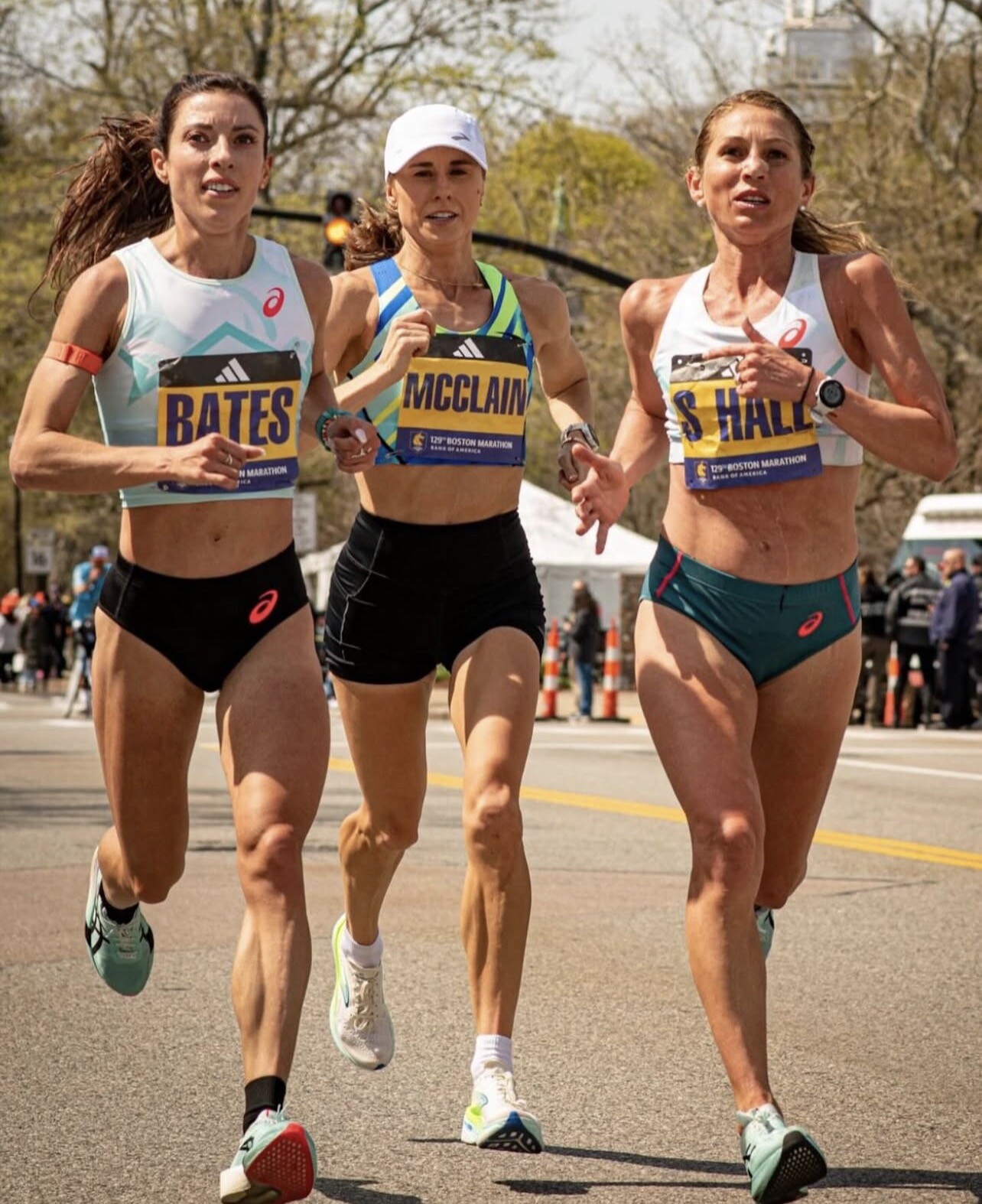
“The 130th edition of the Boston Marathon presented by Bank of America will feature unrivaled depth and head-to-head racing,” said Mary Kate Shea, Chief Operating Officer of the B.A.A. “The strength of the American field combined with the international experience sets the stage for a thrilling race on Boylston Street.
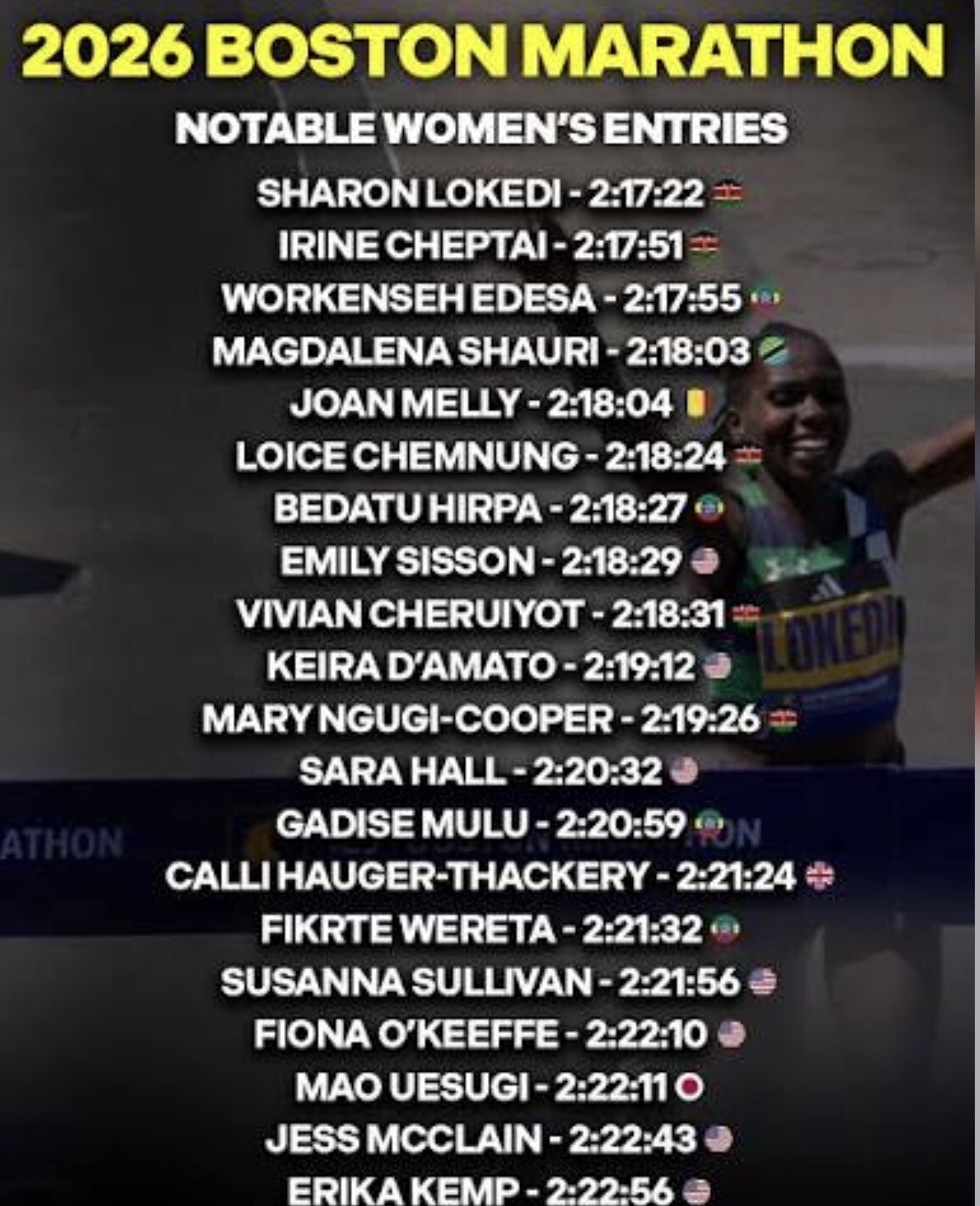
Headlining the U.S. squad is the full 2024 Olympic Marathon team: Emily Sisson, Fiona O’Keeffe, and Dakotah Popehn. Sisson enters as the American record holder at 2:18:29, while O’Keeffe is coming off a strong fourth-place finish at the 2025 New York City Marathon. Popehn posted a lifetime best of 2:24:21 at Chicago last fall.
Joining them is the entire U.S. team from the World Championships Marathon in Tokyo: Susanna Sullivan, Jess McClain, and Erika Kemp. McClain was the top American at Boston last year, finishing seventh in 2:22:43, while Kemp owns a personal best of 2:22:56, the fastest marathon ever run by a U.S.-born Black woman.
Annie Frisbie, eighth in Boston last year, returns after a fifth-place finish in New York, and Keira D’Amato, the former American record holder, will make her third Boston appearance. Veteran Sara Hallalso returns after a runner-up finish at the Houston Marathon in January.
Several Americans will make their Boston debuts, including Megan Sailor, Natosha Rogers, and Amanda Vestri, underscoring the breadth of U.S. talent now entering the marathon ranks.
Internationally, the challenge remains formidable. Defending champion Sharon Lokedi returns after her course-record 2:17:22 victory last year, joined by fellow Kenyans Irine Cheptai and Vivian Cheruiyot. Ethiopia is represented by Workenesh Edesa and Bedatu Hirpa, both proven winners on the global circuit.
Experience on Boston’s unforgiving course will be key for Calli Hauger-Thackery, who enjoyed a breakout 2025 season, and Kenya’s Mary Ngugi-Cooper, a five-time Boston top-ten finisher with a personal best of 2:19:25.
In the women’s wheelchair division, defending champion Susannah Scaroni leads the field after a dominant 2025 season that included victories in Boston, Chicago, New York, and Sydney. Switzerland’s Catherine Debrunner and Manuela Schär return as top challengers, with Schär holding the course record.
With elite depth across disciplines and generations, the women’s race at the 130th Boston Marathon is shaping up as one of the most compelling editions in recent memory—where tactics, experience, and courage will once again decide who claims glory on Boylston Street.
by Boris Baron
Login to leave a comment
Boston Marathon
Among the nation’s oldest athletic clubs, the B.A.A. was established in 1887, and, in 1896, more than half of the U.S. Olympic Team at the first modern games was composed of B.A.A. club members. The Olympic Games provided the inspiration for the first Boston Marathon, which culminated the B.A.A. Games on April 19, 1897. John J. McDermott emerged from a...
more...Habtom Samuel Commands Houston: Historic Half Marathon Debut with Course Record
On a cool Sunday morning, the streets of Houston became the stage for a remarkable debut and two fiercely contested elite races at the Aramco Houston Half Marathon. Eritrean distance runner Habtom Samuel, representing the University of New Mexico, delivered one of the most memorable performances in the event’s history, winning his first-ever half marathon in 59:01 and breaking the course record.
Minutes earlier, the women’s elite race produced its own drama, as Ethiopia’s Fentaye Belaynehoutkicked compatriot Tsigie Gebreselama in the final metres to claim victory in 1:04:49, capping a tactical and tightly controlled contest.
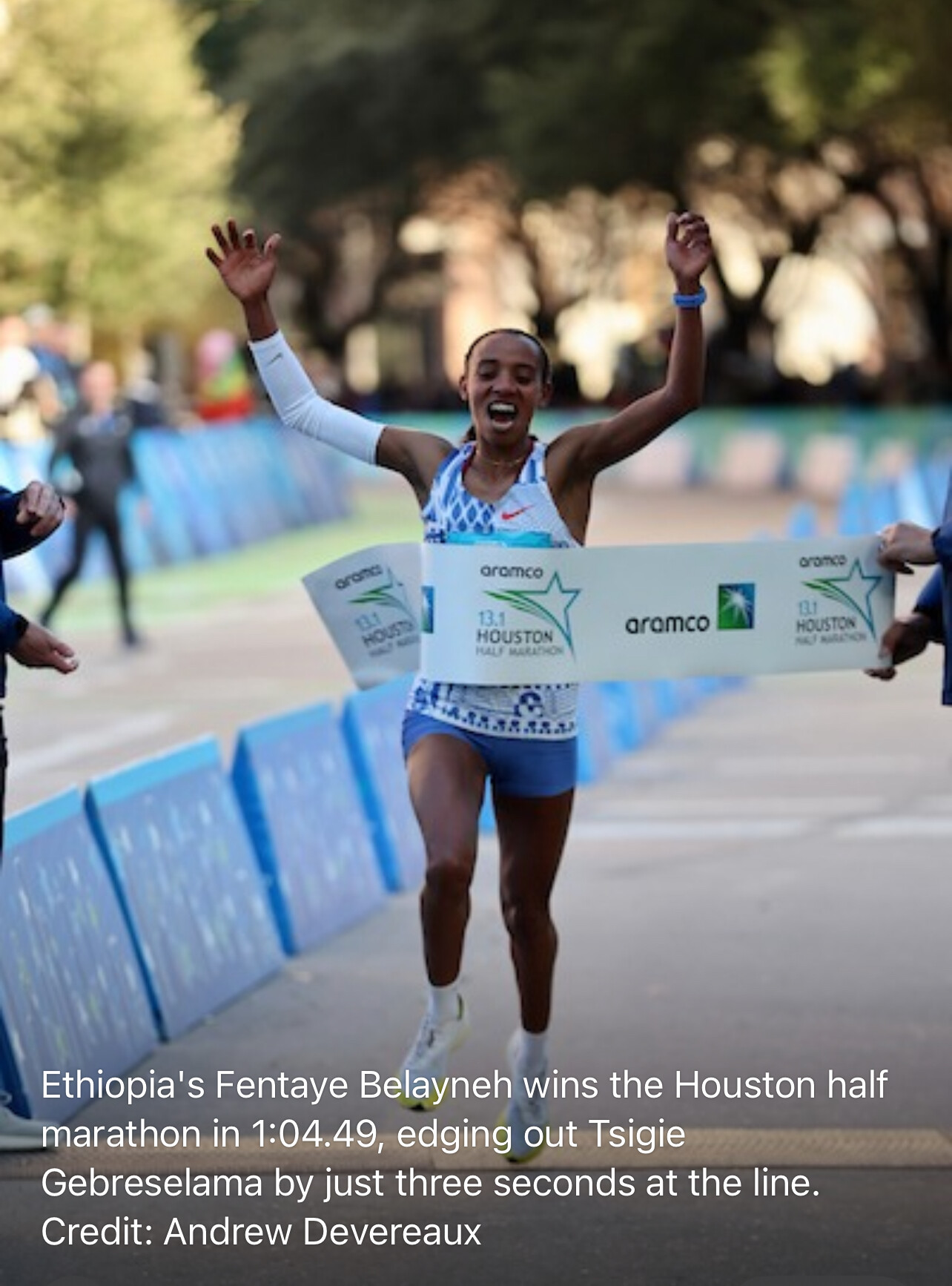
A Breakthrough Debut on the Roads
Samuel arrived in Houston quietly confident, but fully aware of the depth of the field. Known primarily for his NCAA cross-country titles and success on the track—particularly at 10,000 meters—he had spoken before the race about wanting to “test myself on the roads and see how I stack up against top professional athletes outside of track and cross country.”
That mindset guided his approach from the gun.
The men’s race unfolded at a measured tempo, with the lead pack carefully monitoring one another through the early miles. Kenya’s Patrick Kiprop briefly asserted control, opening a small gap and forcing the contenders to respond. Samuel remained composed, running efficiently just off the lead, conserving energy and reading the race with veteran patience.
Observers noted the maturity of Samuel’s tactics—an athlete clearly prepared not just physically, but mentally. His decision to race Houston, which he had described simply as “trying something different,” revealed itself as a calculated experiment executed to perfection.
Tactical Racing in the Women’s Field
In the women’s race, a similar theme of intelligent pacing played out. From early on, runners such as Taylor Roe and Buze Diriba Kejela pressed the pace, but it was Belayneh and Gebreselama who separated decisively by the halfway mark.
The Ethiopian duo worked together through much of the second half, steadily distancing themselves from the chase pack. Americans in the field pushed hard, but the early separation proved decisive, setting the stage for a head-to-head sprint finish.
Decisive Moves and a Record Falls
As the men’s race passed the 10-mile mark, the lead group began to fracture. Samuel moved with precision, smoothly closing on Kiprop before launching his decisive surge in the final mile. Once he moved to the front, the gap opened immediately—and decisively.
His final kilometers were controlled, powerful, and confident, culminating in a 59:01 finish that rewrote the course record on one of America’s fastest half-marathon routes.
Though post-race interviews were not yet available at the time of writing, Samuel’s body language and execution spoke volumes. The performance suggested not just success, but the arrival of a serious new force in elite road racing.
Belayneh’s finish was equally compelling. Timing her move perfectly, she edged Gebreselama in the closing strides, securing victory in 1:04:49 in one of the strongest women’s fields assembled this season.
Setting the Bar in Houston
Samuel’s course-record performance was remarkable not only because it came in his debut, but because it was achieved against a deep international field packed with experienced professionals.
Belayneh’s victory further reinforced Ethiopia’s depth in women’s distance running, while American Taylor Roe emerged as the top U.S. finisher in 1:06:20, continuing her steady rise on the road circuit.
A Launchpad for What’s Next
The significance of Houston extends well beyond one morning’s results. For Samuel, the transition from collegiate standout to elite road racer could not have been more emphatic. His debut suggests a future filled with major opportunities over longer distances.
For Belayneh, the win reaffirmed her tactical sharpness and finishing speed in a discipline that continues to deliver thrilling, high-level competition.
Houston once again proved why it remains one of the premier proving grounds in road racing—and why performances here often signal what’s coming next.
Top 10 Results — Aramco Houston Half Marathon 2026
Men’s Half Marathon
1. Habtom Samuel (ERI / University of New Mexico) — 59:01
2. Patrick Kiprop (KEN) — 59:14
3. Mohammed El Youssfi (MAR) — 59:21
4. Alex Maier (USA) — 59:23
5. Casey Clinger (USA) — 59:34
6. Ryan Ford (CAN) — 59:48
7. Rory Linkletter (CAN) — 59:49
8. Isai Rodriguez (USA) — 59:57
9. Hillary Bor (USA) — 1:00:04
10. Vincent Ngetich (KEN) — 1:00:29
Women’s Half Marathon
1. Fentaye Belayneh (ETH) — 1:04:49
2. Tsigie Gebreselama (ETH) — ~1:04:52
3. Buze Diriba Kejela (ETH) — approx.
4. Taylor Roe (USA) — 1:06:20
5. Natosha Rogers (USA) — 1:07:30
6. Makenna Myler (USA) — 1:07:37
7. Amanda Vestri (USA) — 1:07:43
8. Erika Kemp (USA) — 1:08:42
9. Susanna Sullivan (USA) — 1:08:44
10. Dakotah Popehn (USA) — ~1:08:54
by Robert Kibet for My Best Runs
Login to leave a comment
Aramco Houston Half Marathon
The Chevron Houston Marathon provides runners with a one-of-a-kind experience in the vibrant and dynamic setting of America's fourth-largest city. Renowned for its fast, flat, and scenic single-loop course, the race has earned accolades as the "fastest winter marathon" and the "second fastest marathon overall," according to the Ultimate Guide to Marathons. It’s a perfect opportunity for both elite athletes...
more...Susanna Sullivan — The Teacher Who Runs Among the World’s Best Set to run NYC Sunday
American marathoner Susanna Sullivan continues to prove that world-class athleticism and everyday life can coexist. A sixth-grade math and science teacher from McLean, Virginia, Sullivan has quietly become one of the top American women in marathon history — balancing the classroom with 120-mile training weeks and remarkable consistency on the roads.
From Humble Beginnings to World Class
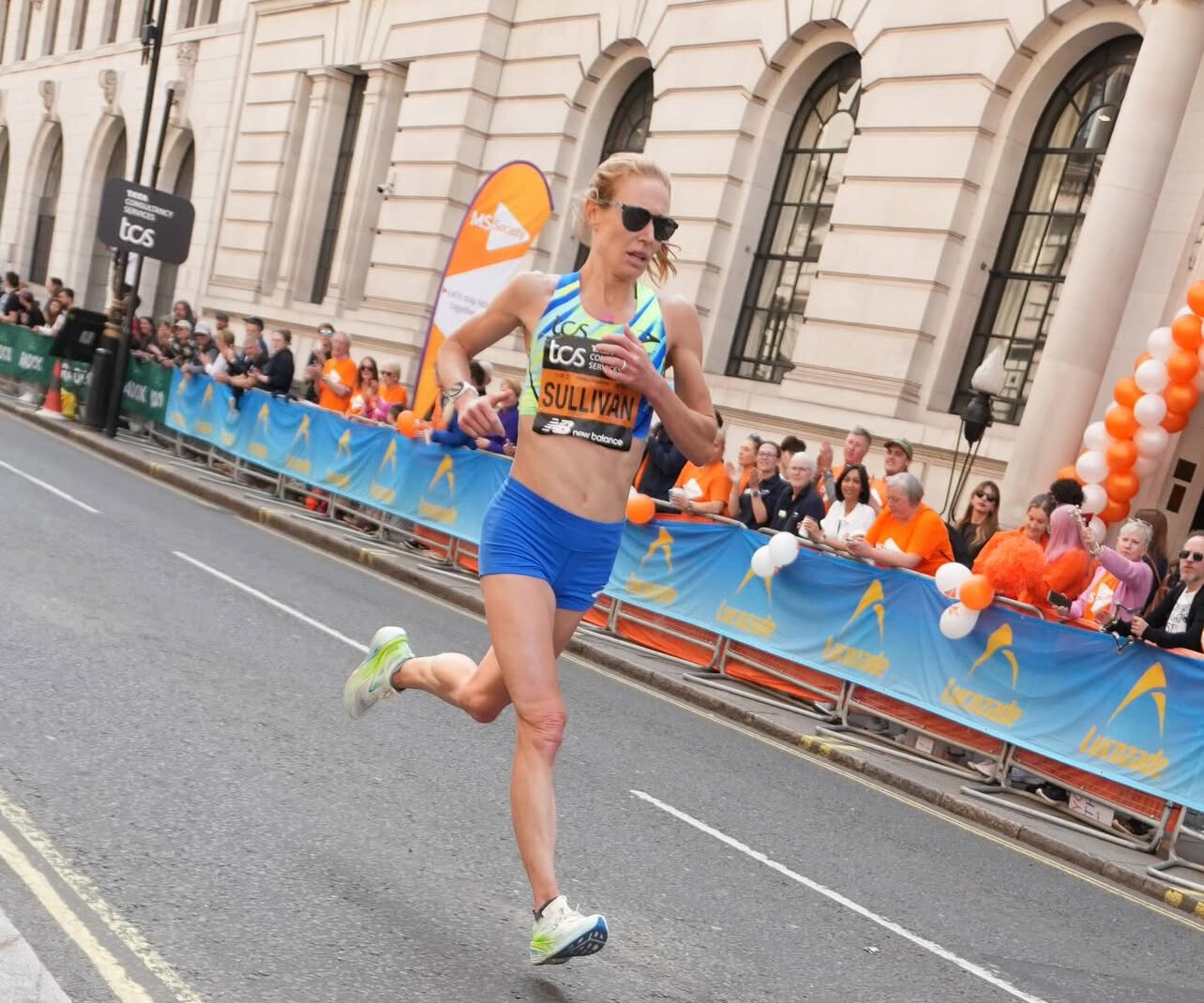
Born May 13, 1990, in West Palm Beach, Florida, and raised in Virginia, Sullivan’s early success came at George Mason High School, where she earned multiple state titles in cross-country and track. After competing at the University of Notre Dame, she battled injuries and fatigue but never lost her love for the sport.
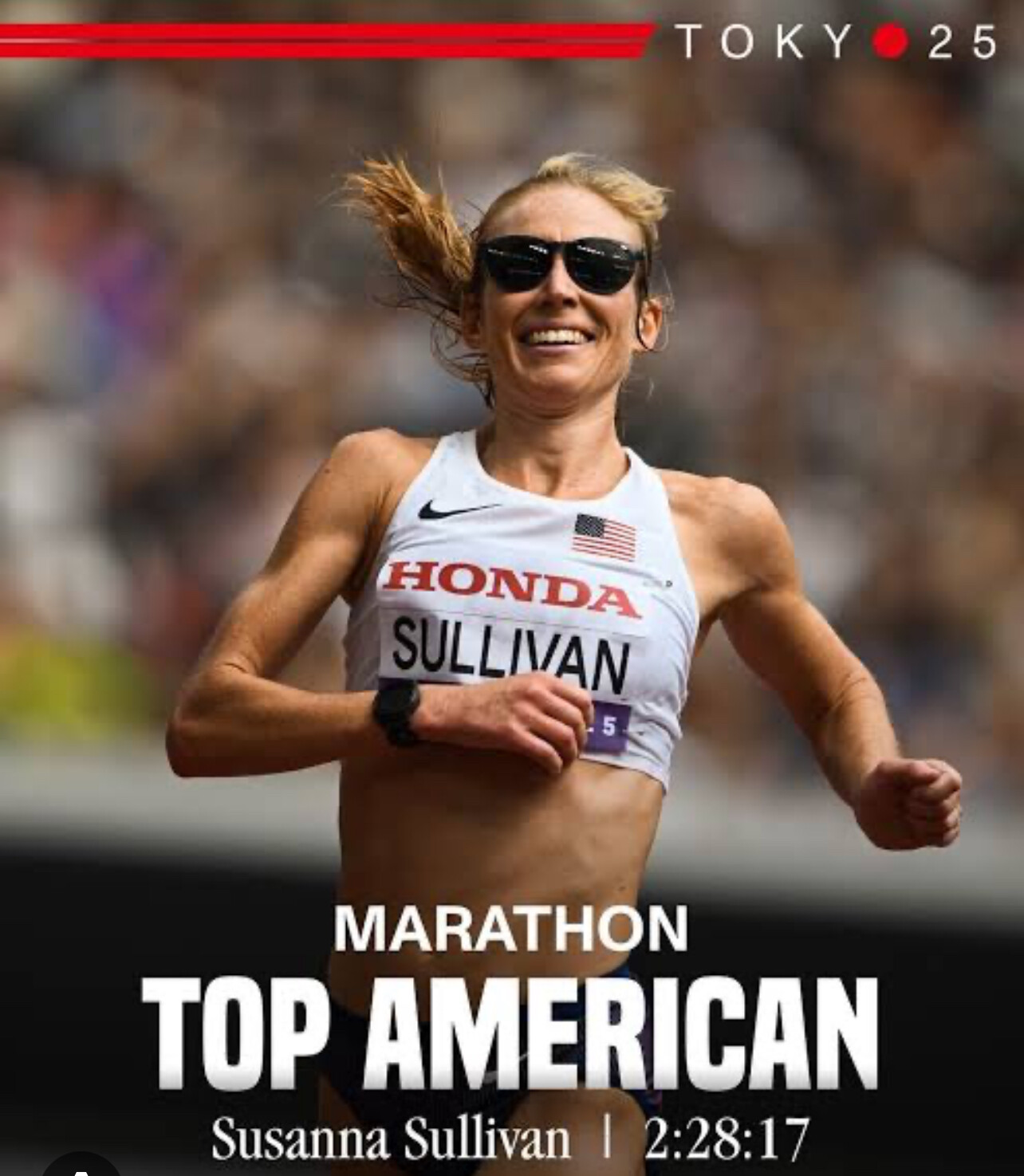
Her marathon debut came in 2015 at Grandma’s Marathon in Minnesota, where she clocked 2:35:37 for 9th place. Over the next decade, she quietly built momentum, cutting time from race to race. The breakthrough arrived in 2024 at the Chicago Marathon, where she finished 7th overall — and first American — in 2:21:56, a personal best that placed her among the top ten fastest U.S. women of all time.
Fourth at the 2025 World Championships in Tokyo
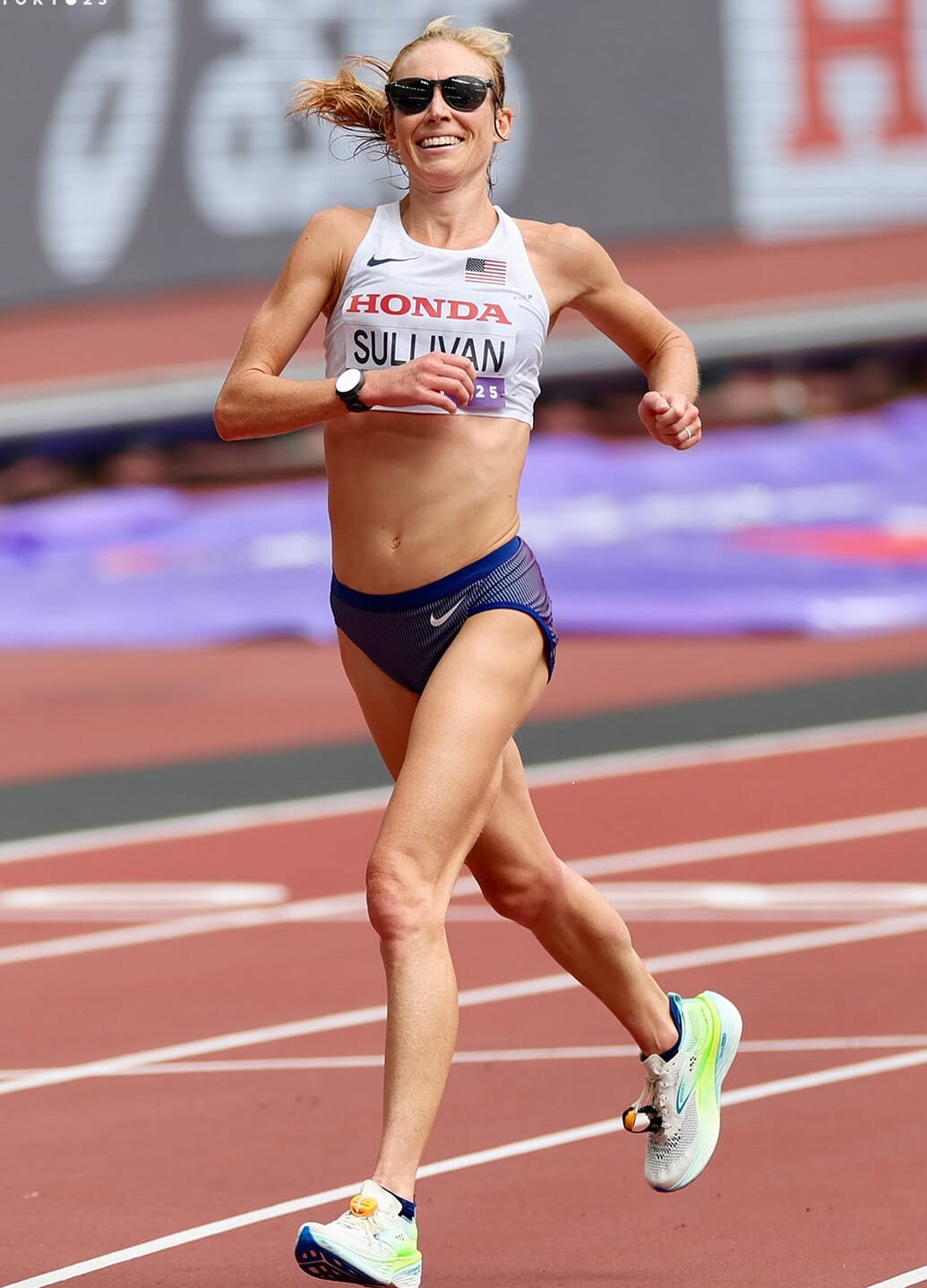
On September 14, 2025, Sullivan delivered one of her finest performances at the World Athletics Championships Marathon in Tokyo, finishing fourth in 2:28:17.
Under sweltering heat and high humidity, Sullivan courageously led much of the race, setting the pace through 25 kilometers before the eventual medalists pulled away. Her performance — the top American finish — underscored her strength, tactical intelligence, and resilience on one of the sport’s biggest stages.
It also marked a full-circle comeback. Two years earlier, at the 2023 World Championships, Sullivan fractured her kneecap mid-race and limped home in 58th place. Her return to the top five in Tokyo symbolized perseverance and renewed confidence.
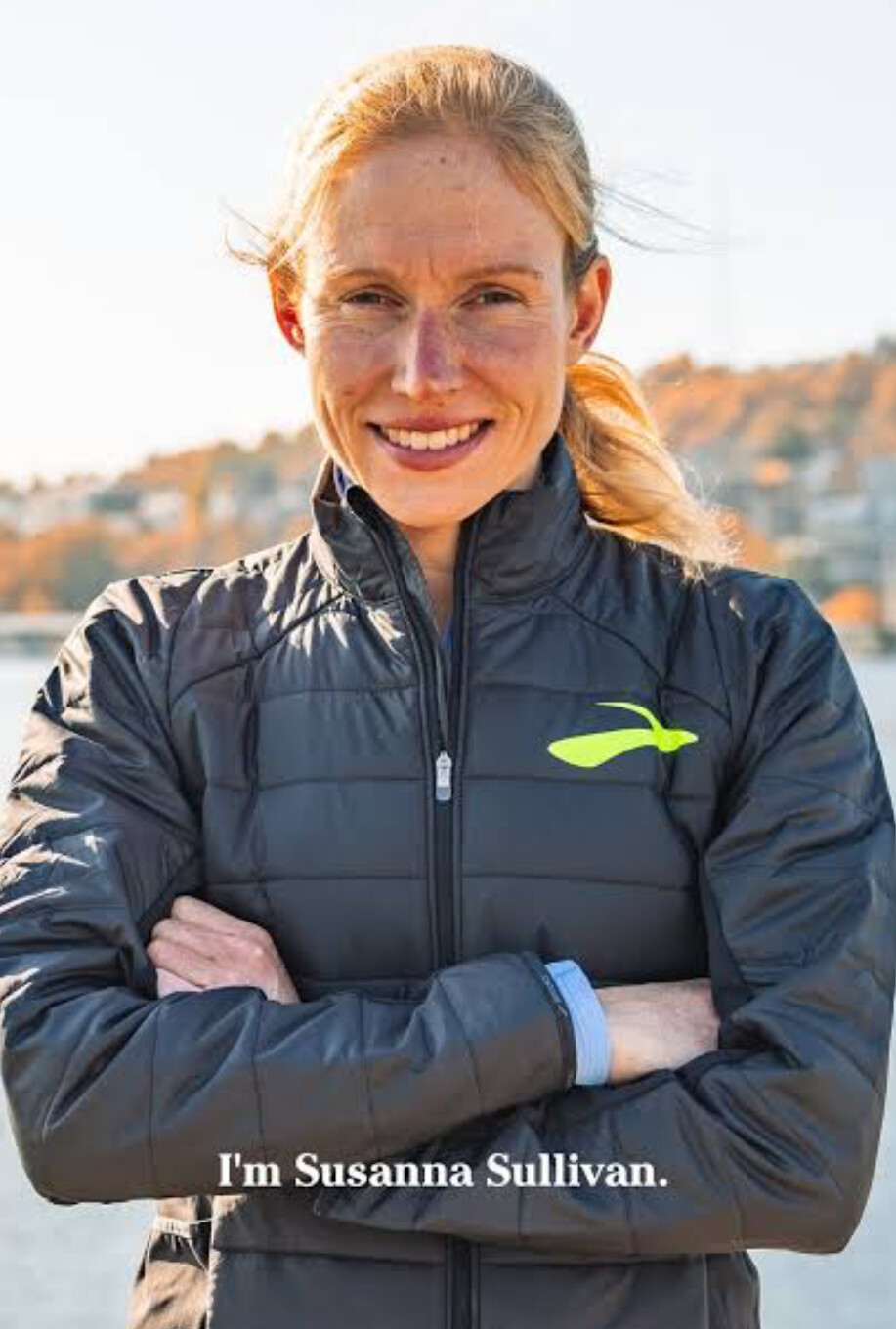
The Balance of Two Worlds
While most professional runners build their lives around training, Sullivan still starts her mornings in the classroom. She teaches sixth-grade advanced math and science, grading papers and designing lessons between workouts.
“Running gives me perspective,” she has said in interviews. “It keeps me grounded. Teaching reminds me there’s more to life than splits and finish times.”
Her ability to balance two demanding worlds has made her an inspiration for runners who juggle careers, families, and athletic dreams.
On to New York
Next up, Sullivan is set to compete in the 2025 TCS New York City Marathon on Sunday, November 2. She enters as one of the leading Americans to watch in a stacked international field that includes Olympians and major-marathon champions.
After her stellar run in Tokyo, many eyes will be on how she handles the challenging hills and bridges of New York — a course that rewards experience and toughness rather than speed alone. Few embody those traits better than Sullivan.
Lessons from Her Journey
• Patience and perseverance — her steady rise from 2:35 to 2:21 shows the value of long-term commitment.
• Balance — proof that excellence isn’t limited to full-time athletes.
• Resilience — recovering from injuries and setbacks only to climb higher.
• Leadership — both in the classroom and in leading a world championship field
Career Highlights
• Marathon PR: 2:21:56 – Chicago (2024)
• World Championships Tokyo (2025): 4th Place, 2:28:17
• London Marathon (2023): 10th Place, 2:24:27 (top American)
• Cherry Blossom 10-Mile (2022): Champion, 52:32
• Half Marathon PR: 1:08:59 – January 2025
A Runner to Watch
Susanna Sullivan’s story reminds us that greatness doesn’t always come from perfect conditions or full-time focus. Sometimes it comes from a quiet classroom in Virginia, where a teacher grades homework — and then goes out to train like one of the best marathoners in the world.
Her journey is far from over, and as she lines up in New York, she represents not just American distance running but every runner chasing balance, progress, and purpose — one mile at a time.
by Boris Baron
Login to leave a comment
Chasing New York: What to Watch at the 2025 TCS New York City Marathon
Every November, the streets of New York City transform. Five boroughs become a stage. Dreams meet asphalt.
The 2025 TCS New York City Marathon is fast approaching — and for runners, coaches, and fans alike, it remains one of the most electric events on the global running calendar.
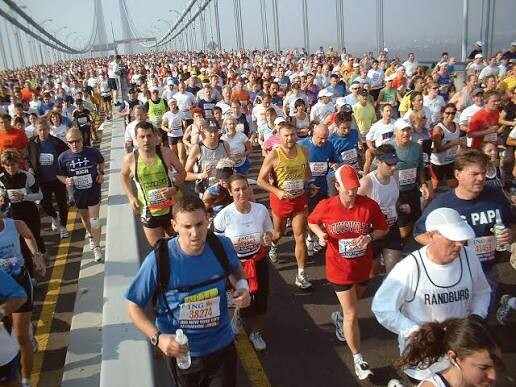
The Big Picture
• Date: Sunday, November 2, 2025
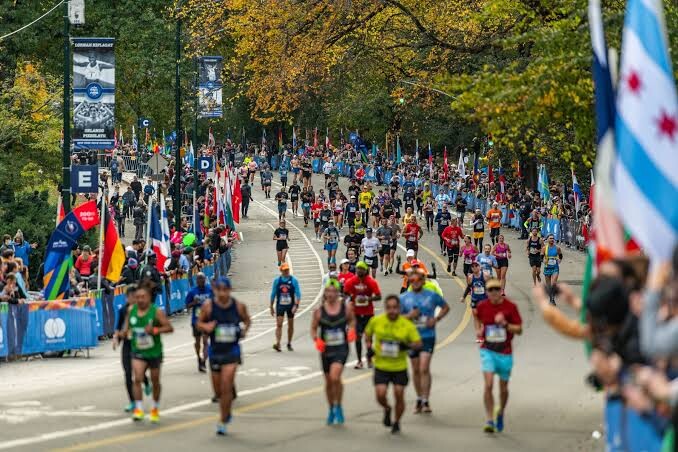
• Field size: More than 55,000 runners representing over 130 nations will take on the 26.2-mile journey from Staten Island to Central Park.
• Defending champions: Abdi Nageeye (Netherlands) and Sheila Chepkirui (Kenya) return to defend their crowns.
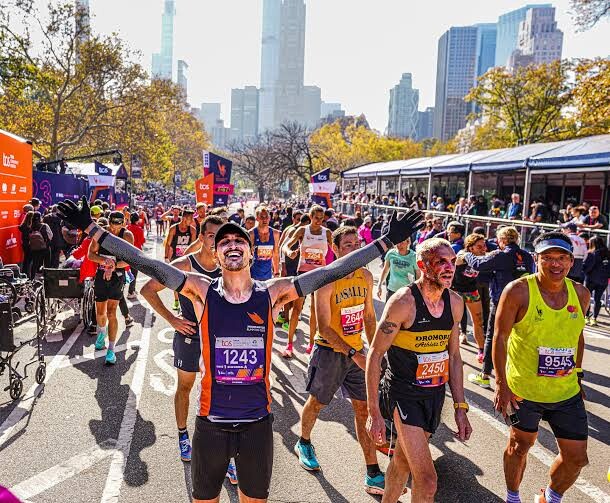
• Debut stars: Marathon legend Eliud Kipchoge and Olympic champion Sifan Hassan will make their long-awaited New York debuts — a storyline that has the running world buzzing.
• Classic route: The course again threads through all five boroughs, starting at Fort Wadsworth on Staten Island, crossing the Verrazzano-Narrows Bridge, and finishing in Central Park.
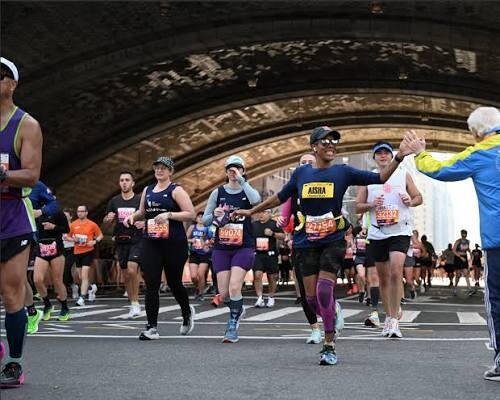
• Sustainability focus: Organizers at New York Road Runners (NYRR) continue to expand environmental initiatives, including recyclable aluminum water bottles and reduced single-use plastics.
Course Records
• Men’s Record: 2:04:58 – Tamirat Tola (2023)
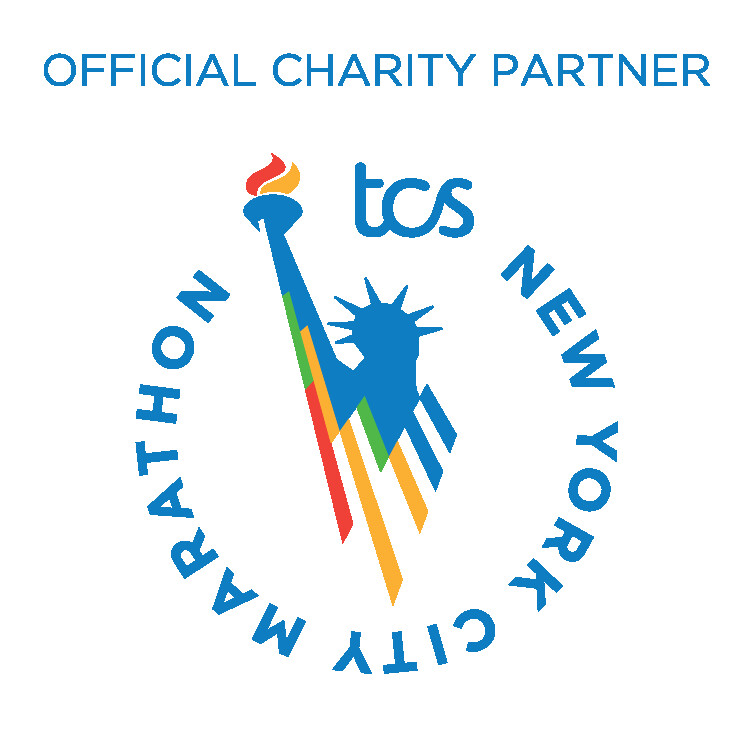
• Women’s Record: 2:22:31 – Margaret Okayo (2003)
Both marks remain tough to challenge on New York’s rolling, bridge-laden course — but with Kipchoge, Chebet, and Nageeye in the men’s field, and Hassan, Obiri, and Lokedi among the women, the potential for history is very real.
Men’s Elite Highlights
• Eliud Kipchoge (Kenya) – two-time Olympic champion, 2:01:09 PB, running NYC for the first time.
• Abdi Nageeye (Netherlands) – defending champion and Olympic silver medalist.
• Evans Chebet (Kenya) – two-time Boston Marathon champion.
• Benson Kipruto (Kenya) – Chicago 2022 winner.
• Albert Korir (Kenya) – former NYC champion.
• Joe Klecker (USA) – U.S. Olympian making his marathon debut.
• Hillary Bor (USA) – U.S. steeplechase champion transitioning to the roads.
• Charles Hicks (USA) – NCAA cross-country champion now turning professional.
Women’s Elite Highlights
• Sifan Hassan (Netherlands) – Olympic champion, winner in London (2023) and Chicago (2024).
• Hellen Obiri (Kenya) – Boston 2023 and NYC 2023 champion.
• Sharon Lokedi (Kenya) – NYC 2022 winner, still a local favorite.
• Sheila Chepkirui (Kenya) – defending NYC champion.
• Emily Sisson (USA) – current American marathon record holder (2:18:29).
• Molly Seidel (USA) – Tokyo Olympic bronze medalist.
• Fiona O’Keeffe (USA) – 2024 U.S. Olympic Trials marathon champion.
• Susanna Sullivan (USA) – Top-10 finisher at Boston 2023, consistent national contender.
This year’s field features 49 Olympians and Paralympians, nine past major marathon winners, and 16 medalists from Olympic or World Championship events — arguably the deepest lineup in New York history.
What Makes New York Unique (and Brutal)
• Rolling terrain and bridges: The Verrazzano, Pulaski, Queensboro, and Willis bridges each sap rhythm and energy.
• Crowd power: Two million spectators line the course, creating unmatched atmosphere — and volume.
• Late-season unpredictability: Weather can swing from cold drizzle to crisp fall perfection.
• Tactical racing: With its uneven pacing demands, NYC rewards strategy over pure speed.
Storylines to Watch
• Kipchoge’s debut: The marathon GOAT takes on the sport’s loudest stage. Can he master New York’s relentless hills and twists?
• Hassan’s bold quest: Coming off London and Chicago wins, can she complete the trifecta in her first NYC appearance?
• Lokedi vs. Obiri: The Kenyan duo continue their fierce rivalry on familiar ground.
• Nageeye’s defense: Last year’s champion faces his toughest test yet with Chebet and Kipruto in pursuit.
• American charge: Sisson, Seidel, O’Keeffe, and Sullivan lead the most complete U.S. women’s team in years — while Klecker and Bor look to ignite the next chapter for American men’s marathoning.
• Record watch: Tola’s 2:04:58 may finally be tested, and Okayo’s 22-year-old mark could fall if conditions align.
For Runners and Coaches
• Train the bridges. Practice long tempo runs that mimic New York’s undulating rhythm.
• Respect the pace. The roar of Brooklyn can trick even the best into going out too fast.
• Fuel flexibly. NYRR’s eco-station setup may differ from other majors — plan accordingly.
• Stay mentally sharp. The final 10 K through Central Park can break anyone unprepared for its hills.
• Layer smartly. Start slightly chilled; the crowds and effort will warm you fast.
The Bottom Line
The 2025 TCS New York City Marathon blends star power, unpredictability, and history like no other race. From Kipchoge’s long-awaited debut to the fiercest women’s field ever assembled in New York, every mile promises drama.
For runners chasing personal bests, and for millions of spectators lining the streets or watching from afar, November 2 will again remind us why this marathon is more than a race — it’s a celebration of endurance, spirit, and the human story that unfolds across 26.2 miles of the world’s greatest city.
by Boris Baron
Login to leave a comment
TCS New York City Marathon
The first New York City Marathon, organized in 1970 by Fred Lebow and Vince Chiappetta, was held entirely in Central Park. Of 127 entrants, only 55 men finished; the sole female entrant dropped out due to illness. Winners were given inexpensive wristwatches and recycled baseball and bowling trophies. The entry fee was $1 and the total event budget...
more...Team USA Names Marathon Stars for Tokyo 2025
USA Track & Field has officially announced its six-member marathon team for the 2025 World Athletics Championships, set for September 13–21 in Tokyo, Japan. This global event brings together the top track and field athletes from over 200 countries, with the marathon races scheduled for the final weekend and expected to be among the most anticipated events of the Championships.
With a challenging course, warm and humid conditions, and the return to a city steeped in marathon history, Tokyo 2025 is shaping up as a true test of strategy, stamina, and speed. Team USA’s roster features a mix of proven veterans and breakthrough performers, all poised to take on the world.
USA Men’s Marathon Team
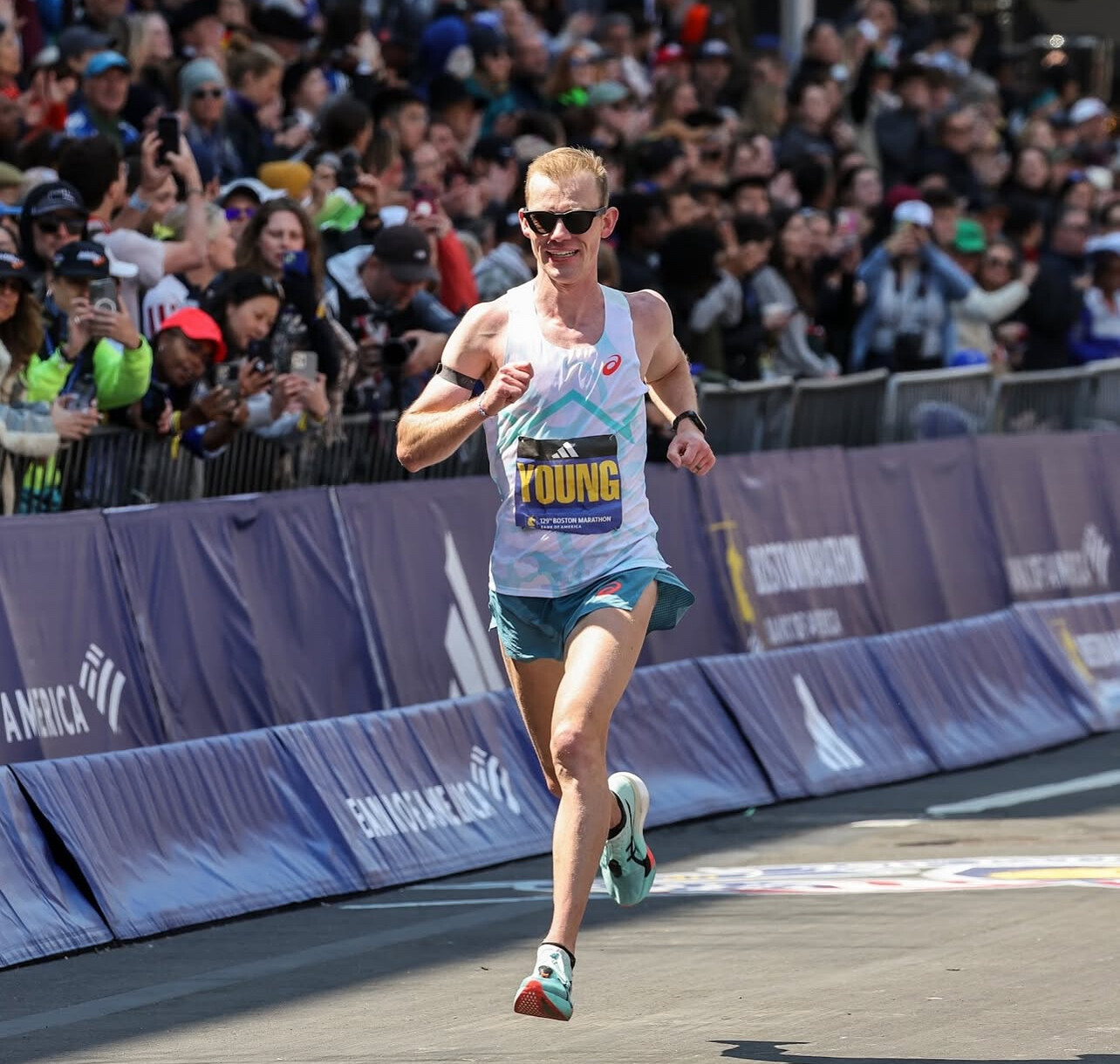
Clayton Young headlines the team following a standout 2:07:04 performance at the 2025 Boston Marathon. After placing 9th at the 2024 Paris Olympics, Young’s Boston result marked a significant leap forward and positioned him as a top contender in Tokyo.
Joining him is CJ Albertson, known for his bold tactics and relentless pacing. He set a personal best of 2:08:17 in Chicago and brings a fearless approach to championship racing.
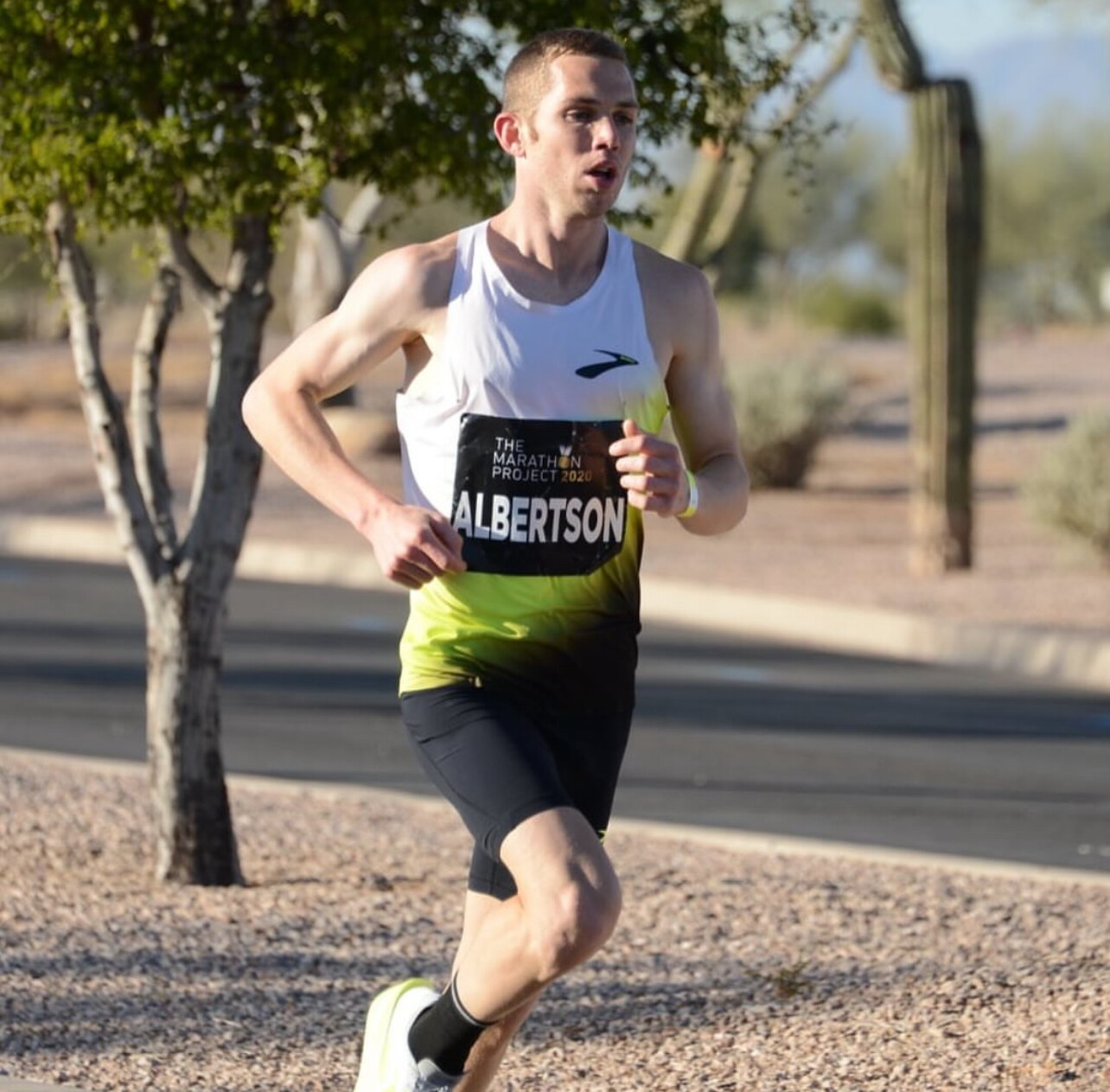
Reed Fischer rounds out the men’s trio, earning his spot through consistent performances and a 2:10:14 finish in Chicago. His steady progression and racing smarts add valuable depth to the squad.
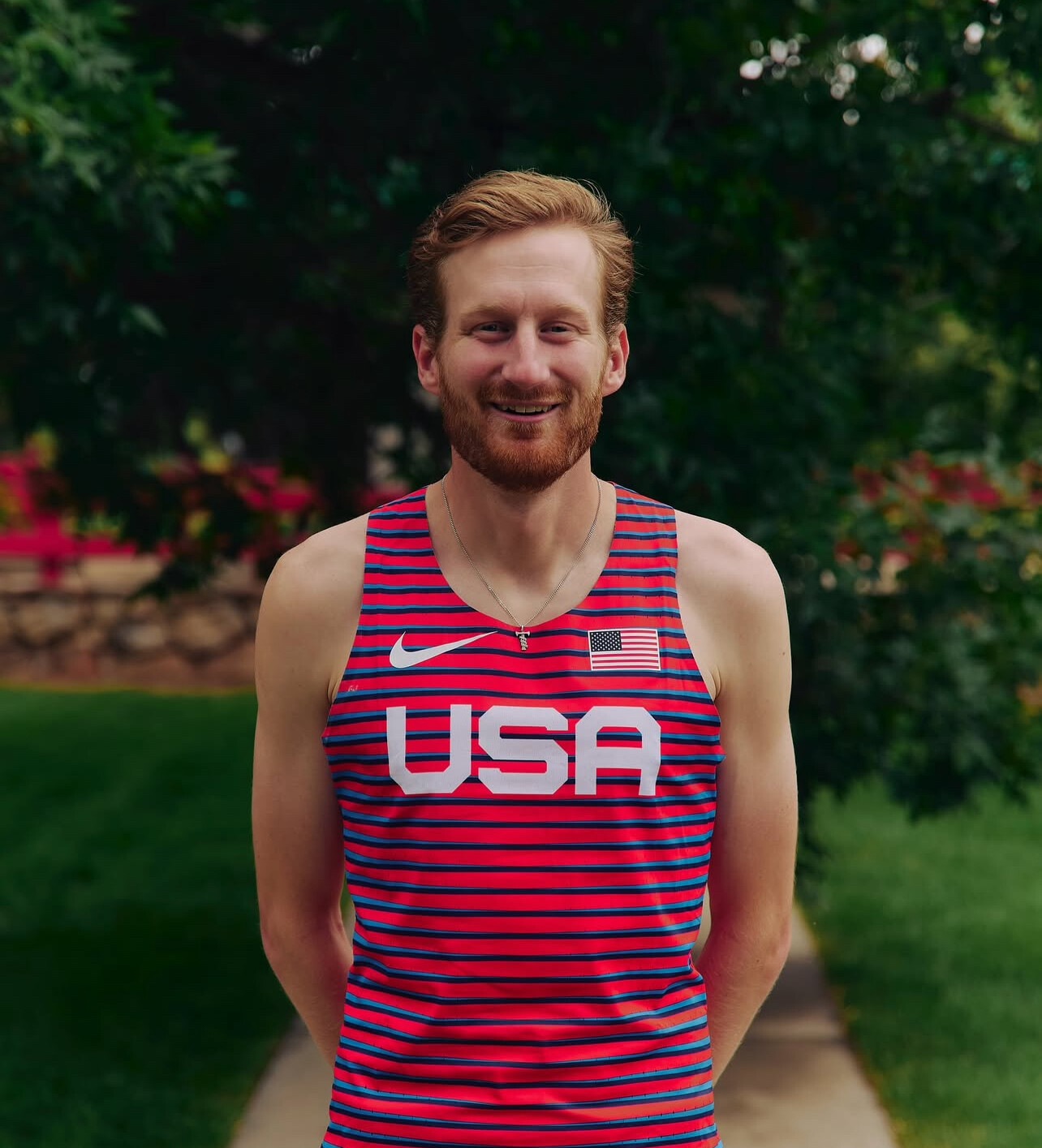
USA Women’s Marathon Team
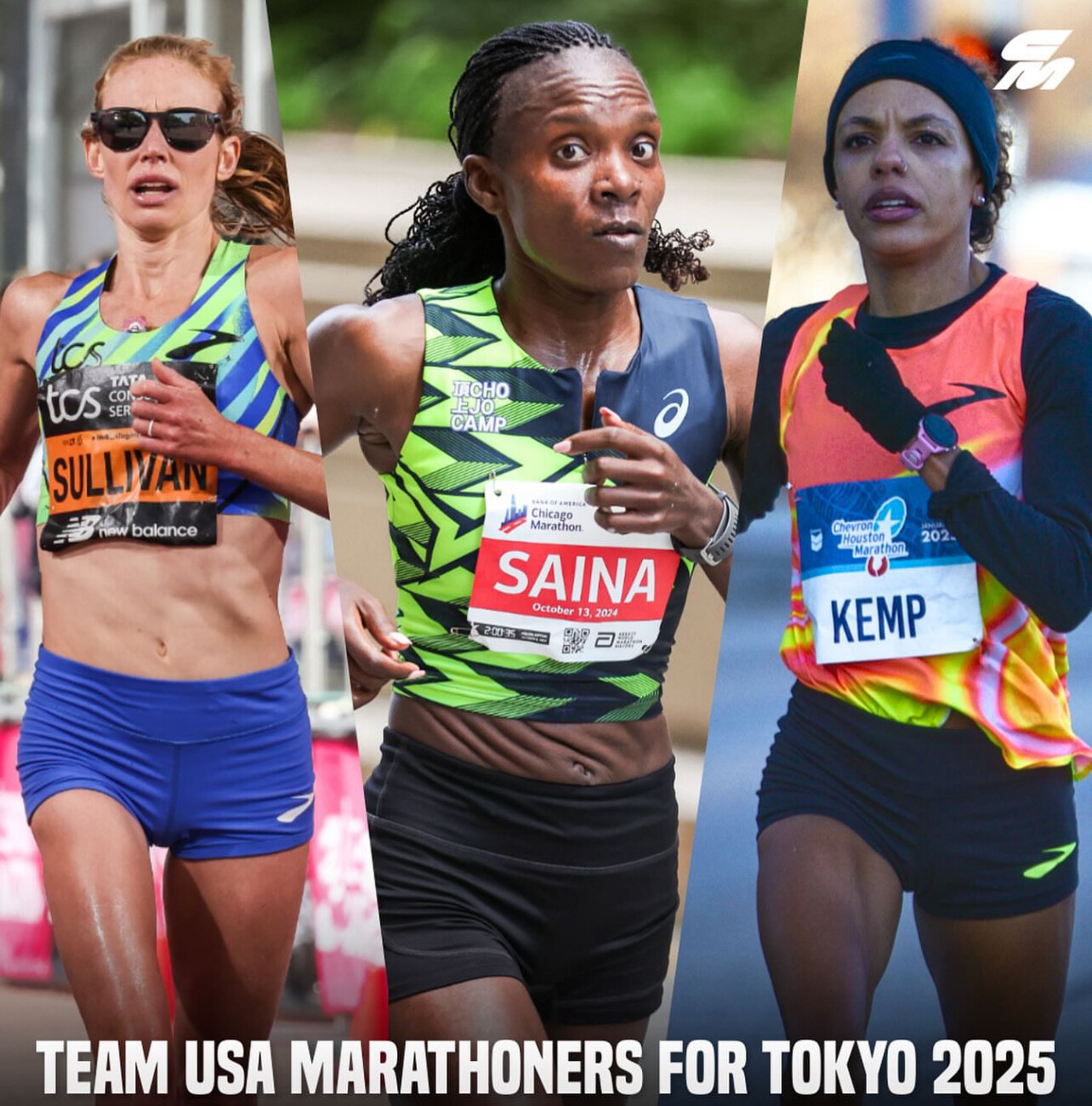
Betsy Saina, the fastest U.S. marathoner this year with a 2:19:17 at the Tokyo Marathon, leads the women’s lineup. The former Kenyan Olympian, now representing the U.S., brings international experience and high expectations into this championship season.
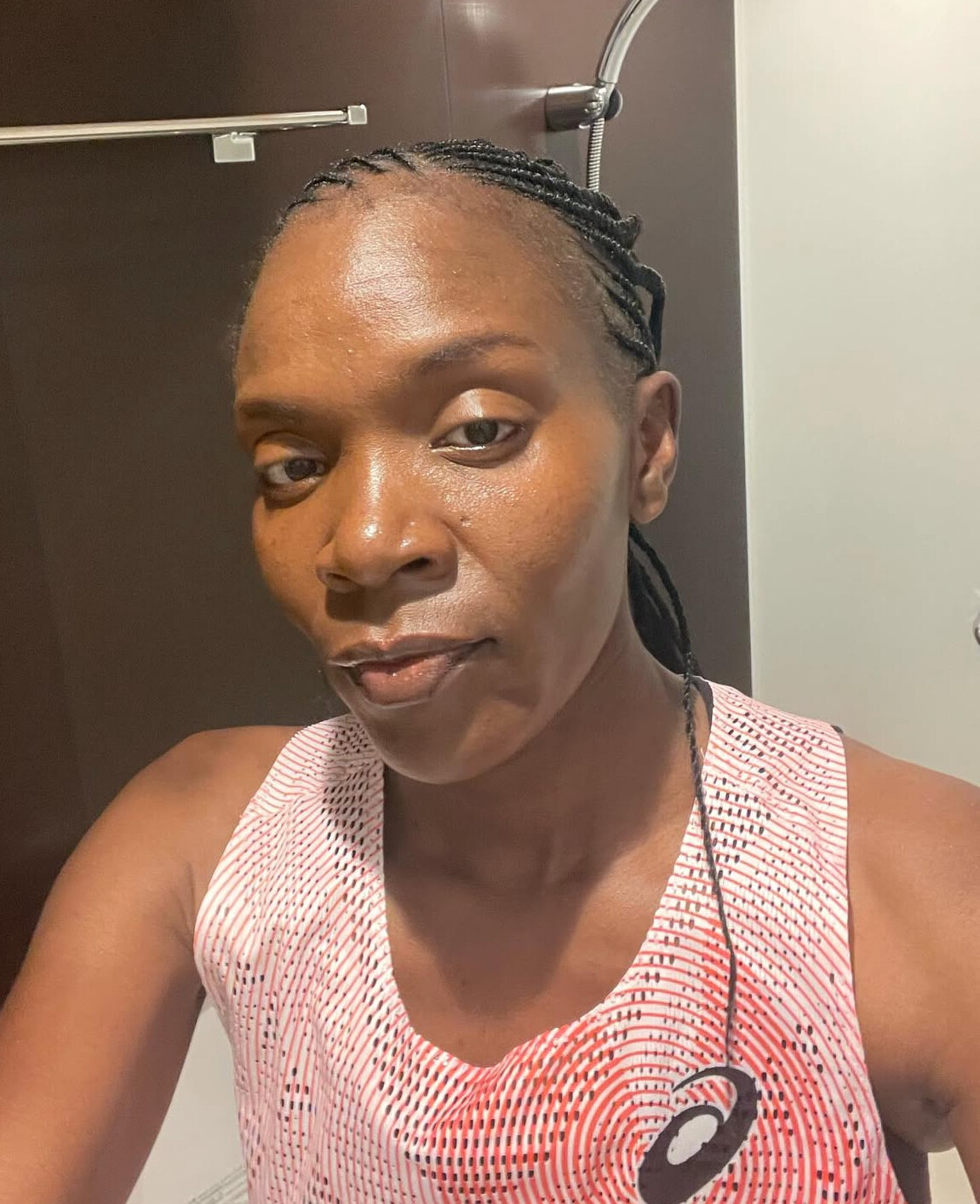
Susanna Sullivan has been one of America’s most consistent distance runners, clocking a 2:21:56 in Chicago and placing high in multiple national events. She’s known for her tactical strength and steady pacing.
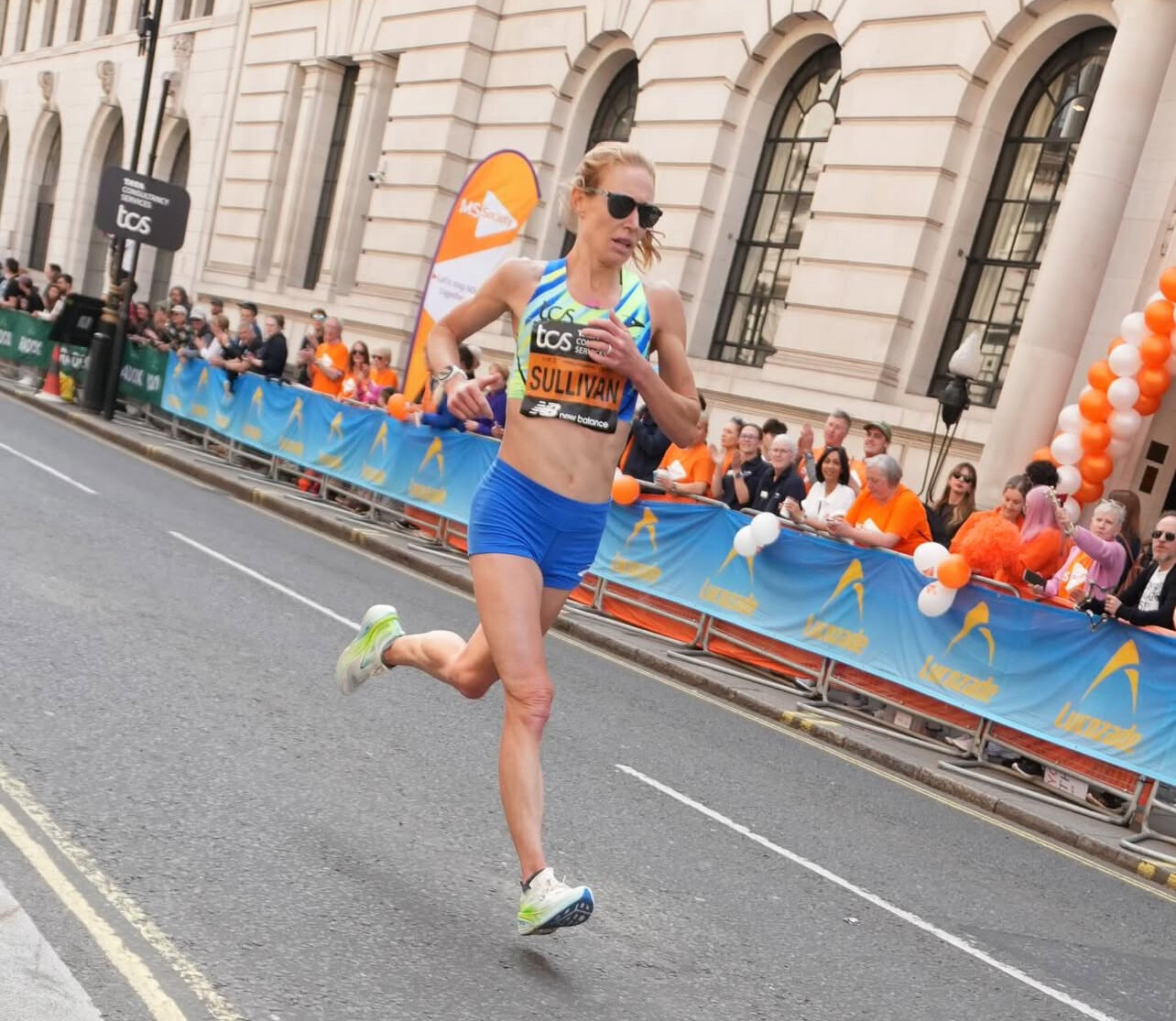
Erika Kemp, a former track standout, continues her successful transition to the marathon with a personal best 2:22:56 from Houston. Her rise in the U.S. distance scene adds fresh energy to the team.
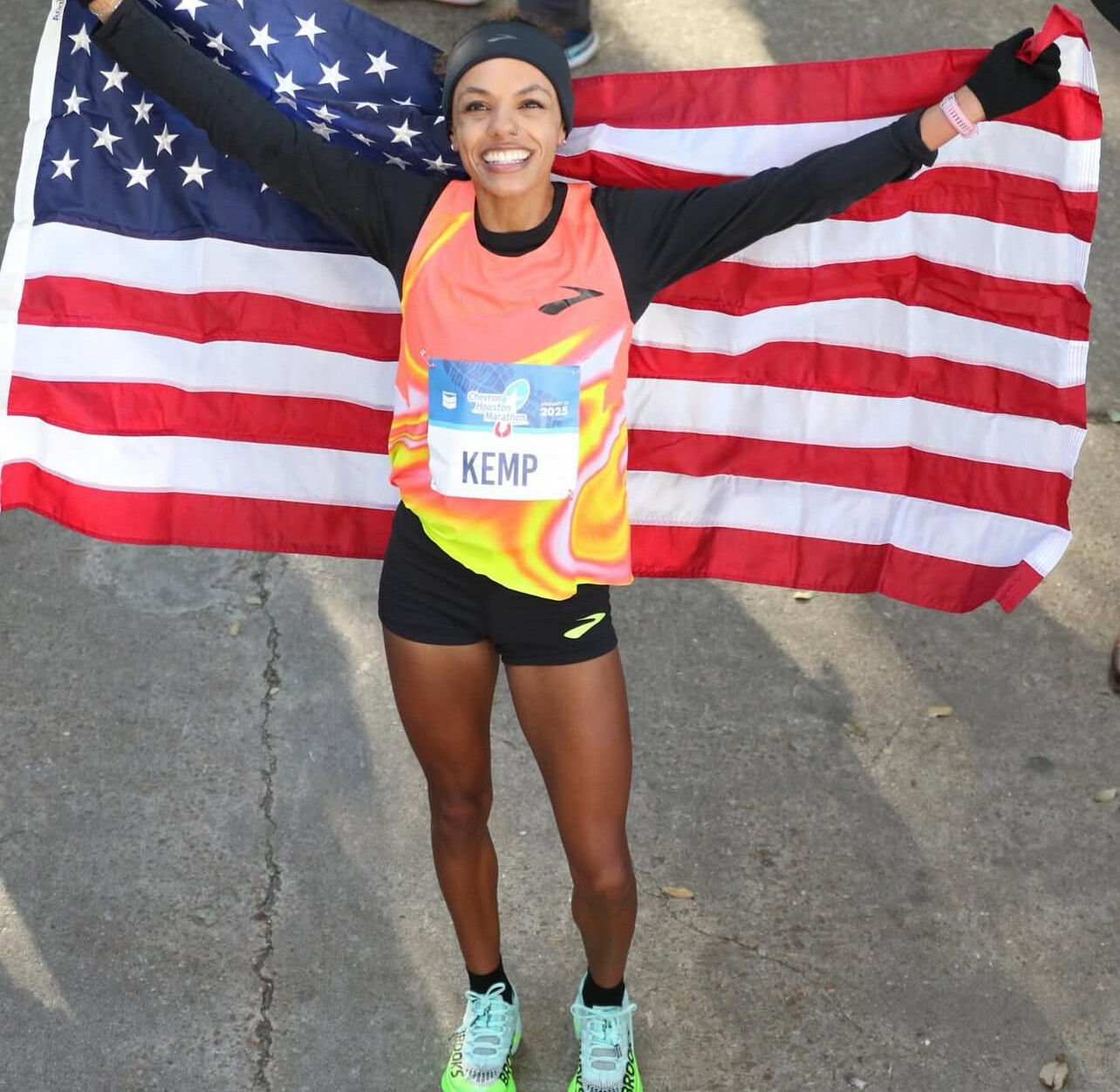
Marathon Schedule – World Championships, Tokyo 2025
• Women’s Marathon: Saturday, September 14 at 8:00 AM JST
• Men’s Marathon: Sunday, September 15 at 8:00 AM JST
The marathon course will take runners through central Tokyo, starting and finishing at the National Stadium. The route is expected to be spectator-friendly but physically demanding, with rising humidity levels adding to the challenge.
This will mark Tokyo’s second time hosting the World Championships (after 1991) and its first major global track event since the 2021 Olympic Games.
Spotlight on Clayton Young
Clayton Young continues to build momentum on the world stage. After placing 9th at the Paris Olympics, his 2:07:04 in Boston this spring confirmed his place among America’s elite. That time ranks as one of the fastest ever by a U.S. marathoner and reinforces his role as a leading medal hopeful.
In announcing his selection, Young wrote:
“I am honored… 101 days. Let the build begin.”
Now with major championship experience and peak form, Young will lead Team USA’s charge in Tokyo.
Why This Year Matters
• Historic Depth: For the first time, Team USA sends multiple sub-2:08 men and three sub-2:23 women to a World Championship marathon.
• Olympic Implications: Performances in Tokyo could shape strategies and selections for Los Angeles 2028.
• Global Showdown: With defending champions, Olympic medalists, and national record holders from around the world competing, the marathon fields will be among the strongest ever assembled.
Team USA’s marathon lineup for the 2025 World Championships reflects both strength and balance. With Clayton Young and Betsy Saina leading the charge, and a deep roster behind them, the Americans are ready to compete at the highest level.
As Tokyo prepares to welcome the world, this year’s marathon is more than a race — it’s a proving ground for the next generation of distance legends.
by Boris Baron
Login to leave a comment
Tigst Assefa Shatters Women’s-Only World Record at the 2025 London Marathon
History was made on the streets of London this morning. Ethiopia’s Tigst Assefa surged to victory at the 2025 TCS London Marathon, setting a new women’s-only world record with an unofficial time of 2:15:50.
With cool, crisp conditions early in the race, Assefa quickly established her dominance. Pulling away from her rivals by the halfway point, she maintained a strong and steady pace through the final miles. In the closing stages, it was clear the race against the clock had begun — and she delivered in spectacular fashion, crossing the finish line with a commanding lead of over a minute ahead of second-place Joyciline Jepkosgei.
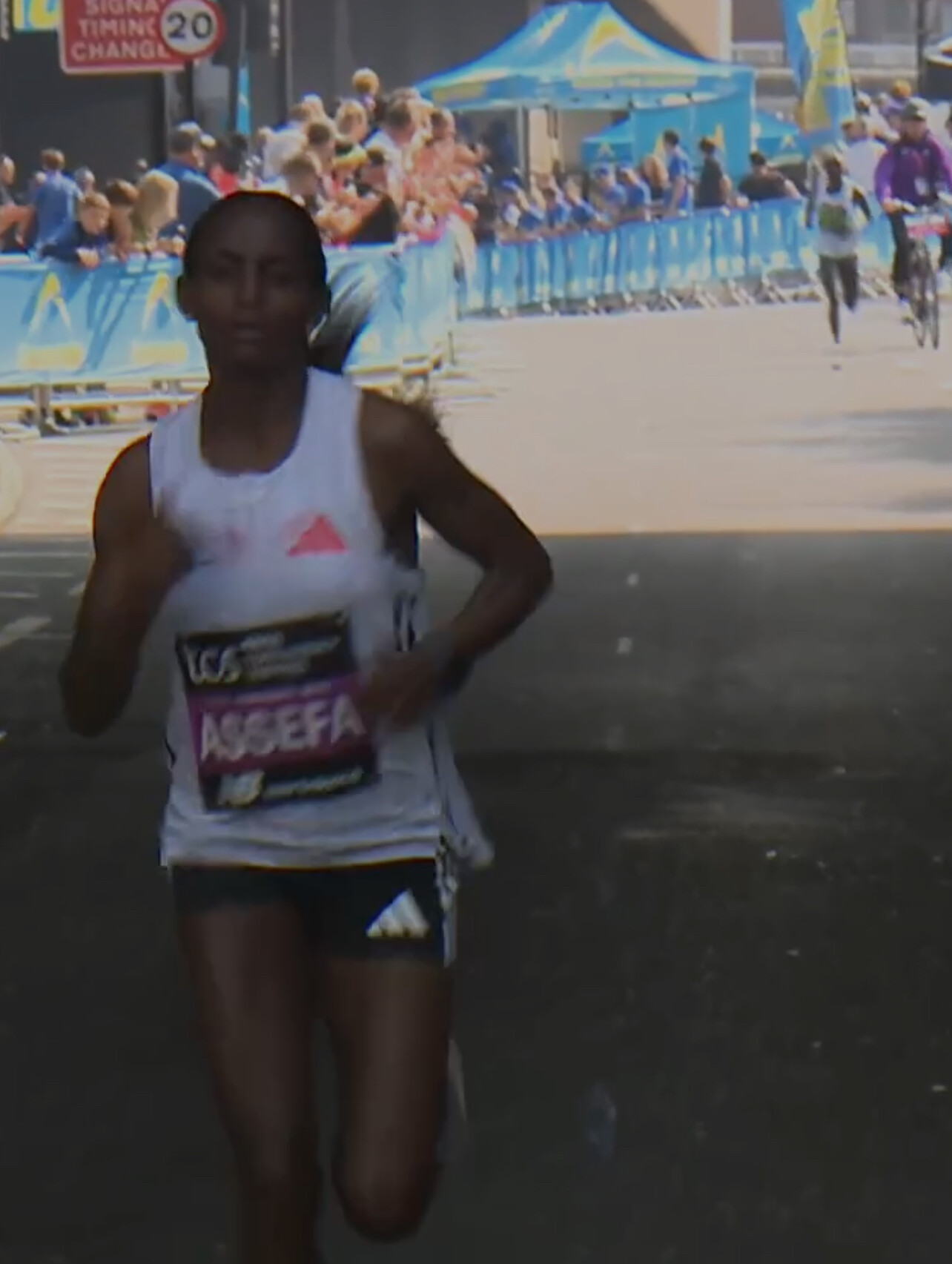
The previous women’s-only world record was held by Britain’s Paula Radcliffe, whose 2:17:01 mark from London in 2005 had stood for two decades. Assefa’s breakthrough performance, pending official ratification, trims over a minute from that legendary time.
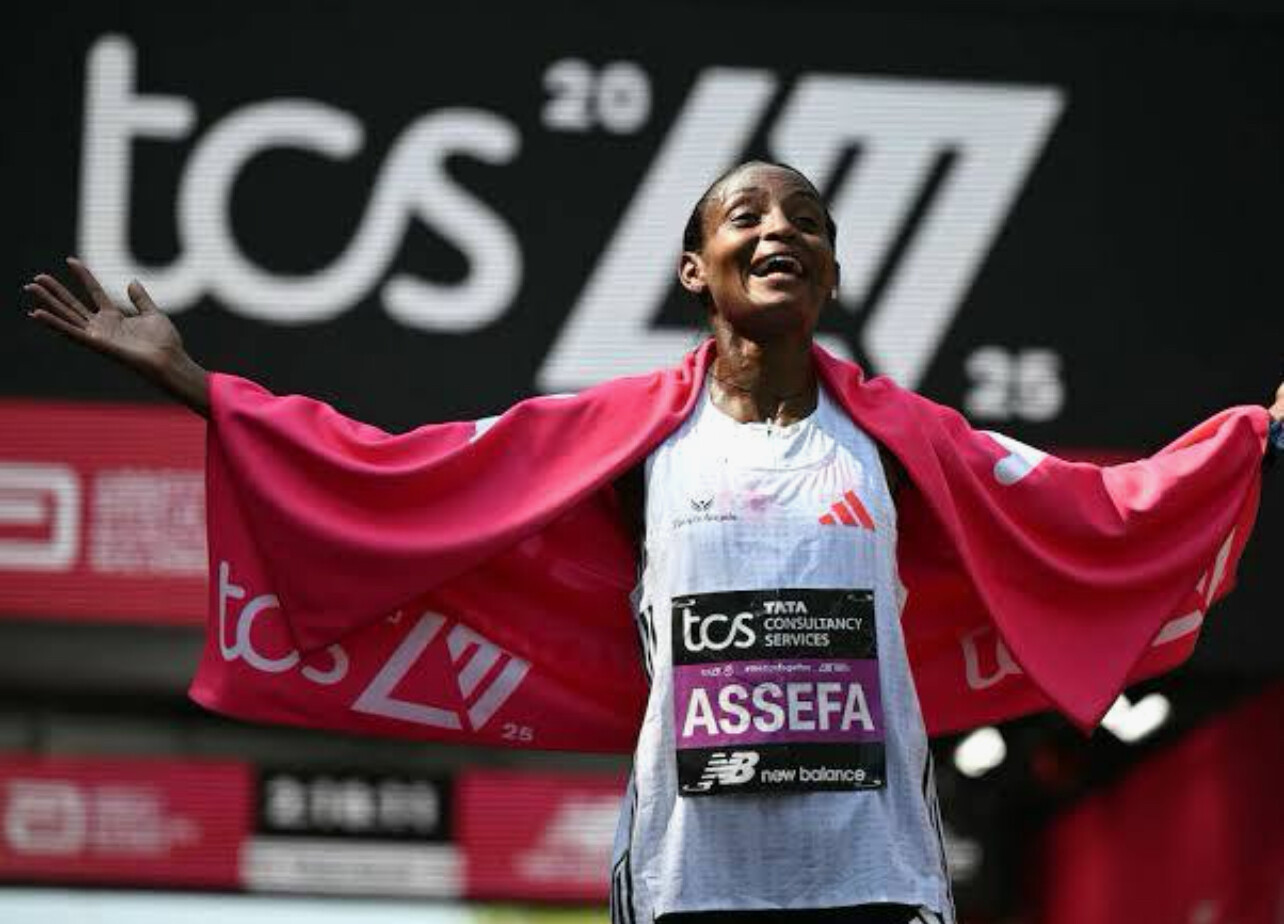
Tigst Assefa had already stunned the running world with her mixed-race world record of 2:11:53 set in Berlin in 2023. Today, she confirmed her place among the all-time greats by dominating a race staged without male pacemakers, underlining her incredible solo strength.
Assefa’s record run headlined what has already become one of the most memorable editions of the London Marathon, with over 56,000 participants and perfect spring weather creating an electric atmosphere.
Paula Radcliffe posted "That was a phenomenal race so hats off to Tigst Assefa for being brave enough to go out in the pace she did!
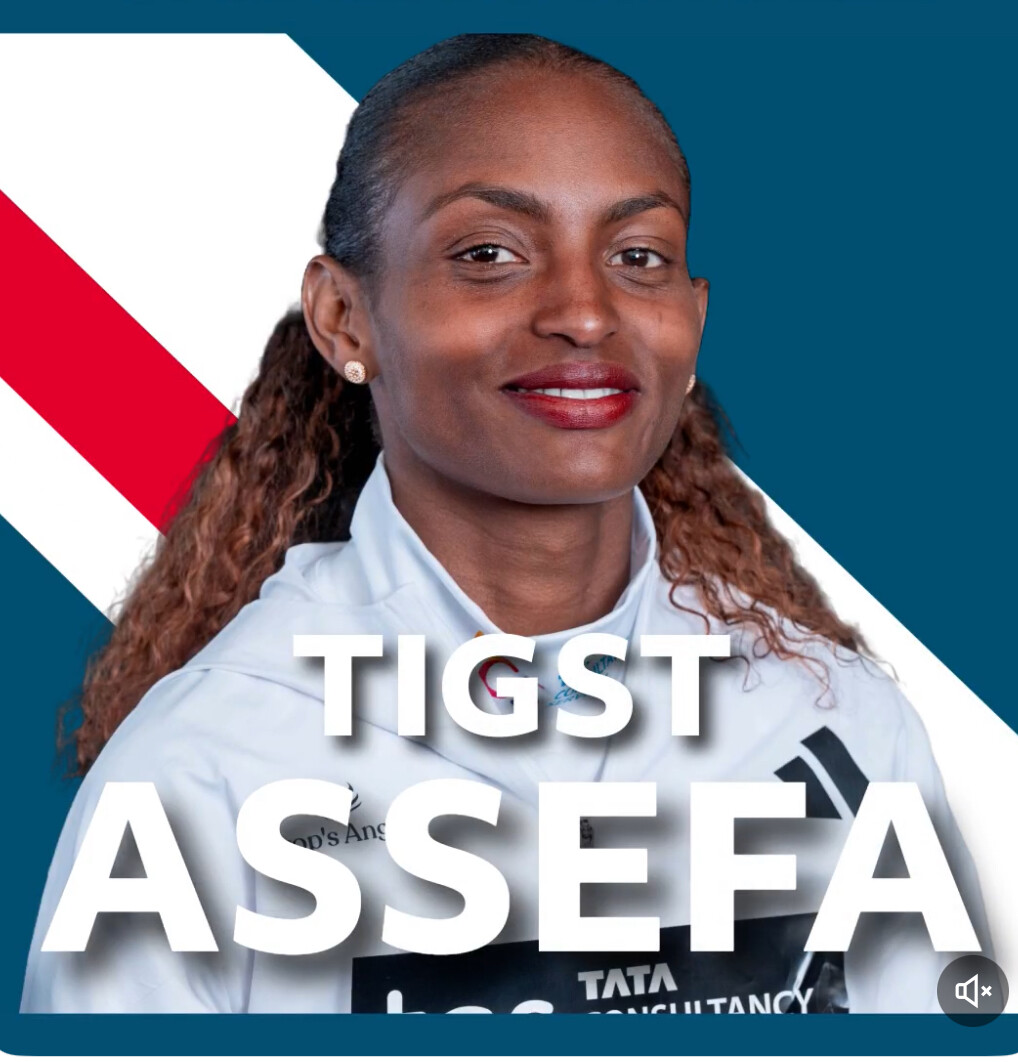
The manner in which she lifted herself to get across the line as well.
You can see how much it means to her. It's more to build on for her moving forward."
Eilish McColgan picks up the pace as she comes across the line in 02:24:25 for eighth place.
She's tired on her marathon debut but has done one thing she wanted - beat her mum Liz's best time. Liz McColgan won here in 1996.
A decent effort for a first attempt.
Top 13 Women’s Elite Finishers
1. Tigst Assefa (ETH) – 2:15:50
2. Joyciline Jepkosgei (KEN) – 2:18:44
3. Sifan Hassan (NED) – 2:19:00
4. Haven Hailu Desse (ETH) – 2:19:17
5. Vivian Cheruiyot (KEN) – 2:22:32
6. Stella Chesang (UGA) – 2:22:42
7. Sofiia Yaremchuk (ITA) – 2:23:14
8. Eilish McColgan (GBR) – 2:24:25
9. Rose Harvey (GBR) – 2:25:01
10. Susanna Sullivan (USA) – 2:29:30
11. Phily Bowden (GBR) – 2:30:28
12. Molly Bookmyer (USA) – 2:32:31
13. Holly Archer (GBR) – 2:39:45
Ethiopia’s Tigst Assefa delivered a historic performance, setting a new women-only world record with a time of 2:15:50. She broke away from the pack after the 30-kilometer mark and maintained her lead to the finish line.
Kenya’s Joyciline Jepkosgei secured second place with a strong finish at 2:18:44, while the Netherlands’ Sifan Hassan completed the podium in third with a time of 2:19:00.
Notably, Great Britain’s Eilish McColgan finished eighth, setting a new Scottish marathon record with her time of 2:24:25.
by Boris Baron
Login to leave a comment
2024 USATF 5K: Ahmed Muhumed And Annie Rodenfels Win
Annie Rodenfels went back-to-back while Ahmed Muhumed claimed his second US title of the year at the 2024 USATF 5K Road Championships on Saturday morning in Central Park. Rodenfels, who runs for the B.A.A. High Performance Team, broke away from Emily Venters and Emma Grace Hurley in the final mile to win in 15:20.
Muhumed, who won the US 8k road title in July and was the runner-up here last year, dropped the field with a hard move at 2 miles and held off a late charge from Sam Prakel to win in 13:38 to Prakel’s 13:39.
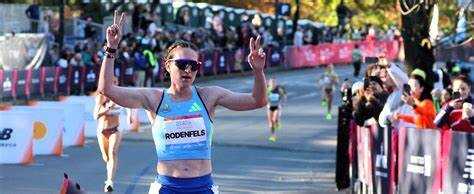
Top 10 results
Men
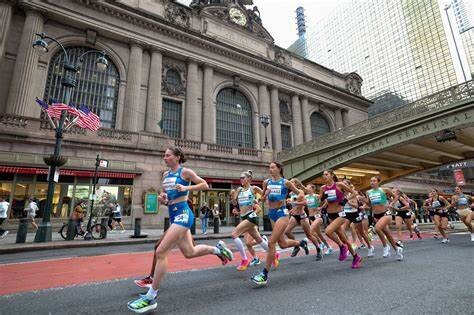
1. Ahmed Muhumed, HOKA NAZ Elite 13:38
2. Sam Prakel, adidas 13:39
3. Brian Barraza, Roots Running Project 13:42
4. Kirubel Erassa, unattached 13:44
5. Hillary Bor, HOKA One One 13:45
6. Anthony Rotich, US Army 13:48
7. Drew Bosley, unattached 13:49
8. Afewerki Zeru, McKirdy Trained 13:52
9. Abbabiya Simbassa, Under Armour 13:57
10. Morgan Beadlescomb, adidas 13:59
Women
1. Annie Rodenfels, B.A.A. 15:20
2. Emily Venters, Nike 15:25
3. Emma Grace Hurley, Asics 15:31
4. Bailey Hertenstein, Nike 15:32
5. Susanna Sullivan, Brooks 15:36
6. Abby Nichols, HOKA NAZ Elite 15:41
7. Paige Wood, HOKA NAZ Elite 15:41
8. Taylor Roe, Puma 15:43
9. Natosha Rogers, Puma 15:45
10. Molly Born, Puma 15:47
by Jonathan Gault
Login to leave a comment
Dash to the Finish Line
Be a part of the world-famous TCS New York City Marathon excitement, run through the streets of Manhattan, and finish at the famed Marathon finish line in Central Park—without running 26.2 miles! On TCS New York City Marathon Saturday, our NYRR Dash to the Finish Line 5K (3.1 miles) will take place for all runners who want to join in...
more...Defending champions Morgan Beadlescomb and Annie Rodenfels return to the Abbott Dash to the Finish Line 5k
New York City Marathon weekend kicks off with a much-anticipated USATF 5 km Championships at the Abbott Dash to the Finish Line 5k on Saturday, November 2, taking place the day before the 53rd running of the TCS New York City Marathon.
The USATF 5 km Championships at the Abbott Dash to the Finish Line 5k are the 11th stop on the 2024 USATF Running Circuit. Live coverage of this year’s championships will be broadcast on USATF.TV, starting at 8:20 a.m. ET, with the men’s race going off at 8:30 a.m. and the women starting five minutes after at 8:35 a.m.
Defending champions Morgan Beadlescomb and Annie Rodenfels return to the streets of Midtown Manhattan after winning last year’s USATF 5km Championships in their respective races.
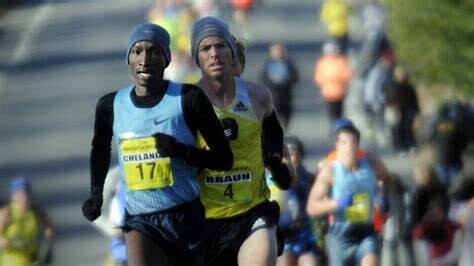
The former Michigan State Spartan Beadlescomb surged away from Ahmed Muhumed, Tai Dinger and Daniel Schaffer in the final stretch to win last year’s men’s title in 13:44, besting the field by a comfortable three seconds to claim his first USATF crown.
Looking to become the first men’s repeat champion since Ben True in 2011-12 when the USATF 5 km Championships were held in Providence, R.I., Beadlescomb will take on another tough field that will feature Muhumed (second), Schaffer (fourth) and Brian Barazza (fifth) from last year’s race, as well as a handful of others with impressive credentials.
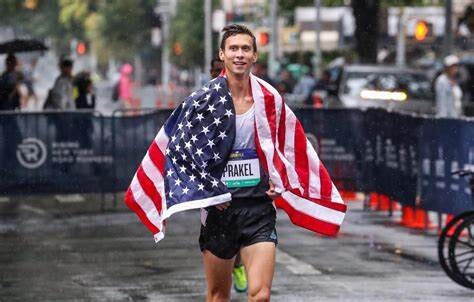
Beadlescomb could also become the first male athlete to win two USATF 5 km Championships titles at the Abbott Dash to the Finish Line 5k course, along with 2019 USATF 5 km champion Anthony Rotich making his way back into the field for the first time since winning the 2019 title.
Muhumed is the only competitor in the field that has won a USATF title this year on the USATF Running Circuit, winning the USATF 8 km Championships back in July in Kingsport, Tennessee. The USATF 8 km Championships were also the last time Muhumed raced this year.
Sam Chelanga, Sam Prakel and Josh Thompson join Beadlescomb, Rotich and Muhumed as three more USATF national champions set to race, bringing the total to six national champions in Saturday’s field.
Chelanga, a two-time USATF champion, will go after his first USATF national title since 2016 when he won the USATF 10 Mile title. He’s raced twice this season on the USATF Running Circuit, finishing third at the USATF 10 km Championships and fourth at the USATF 20 km Championships.
Prakel, the 2023 USATF Road Mile champion, and Thompson, the 2020 USATF Indoor 1500 champion, are both eyeing a second national title of their own.
Parlympian and New York native Michael Brannigan is slated to race after competing for the United States at the 2024 Paris Paralympic Games, where he came away with his second Parlympic medal in the men’s T20 1500, earning bronze to go with his 2016 gold from the Rio Games.
Derek Johnson, Titus Winder and Kirubel Erassa will be other names to watch out for in the men’s race.
Rodenfels earned her first USATF national title by defeating Rachel Smith by four seconds in last year’s women’s race, running 15:22.
Rodenfels has since won another USATF national title earlier this season, winning the 2024 USATF 6 km Championship race by 13 seconds on July 13 in Canton, Ohio.
With a win on Saturday, Rodenfels could join Weini Kelati as the only competitors to repeat as USATF 5 km champions at the Abbott Dash to the Finish Line 5k course and the sixth woman to complete consecutive national titles in the history of the USATF 5 km Championships.
Challenging Rodenfels will be Emma Grace Hurley, who will be racing in her seventh USATF Running Circuit race this year, with her latest effort being a third-place finish at the USATF 10 km Championships in Northport, New York, on September 21.
Hurley, who was ninth at last year’s USATF 5 km Championships, has finished as high as second place in two USATF Running Circuit races this year at the USATF 8 km Championships and the USATF Cross Country Championships.
Susanna Sullivan and Natosha Rogers are a pair of veterans coming off great races in their recent outings looking to mix it up in the top half of the field.
Sullivan completed this year’s Chicago Marathon as the top American, running a lifetime best of 2:21:56 to finish seventh overall, making her the 10th-fastest American marathoner in history.
Rogers won the Medtronic Twin Cities 10 Mile in St. Paul/Minneapolis, Minnesota, on October 6, in 52:29 just two weeks after finishing second at the USATF 10 km Championships.
Logan Jolly, Cailie Logue and Elena Hayday are other competitors entered in this year’s USATF 5 km Championships with past results on this year’s USATF Running Circuit.
2023 Cross Country champion Katie Wasserman adds some intrigue to the field, running in her first road race since 2022.
About the USATF Running Circuit
The USATF Running Circuit is a USATF road series featuring USATF championships from one mile through marathon and consistently attracts the best American distance runners with more than $500,000 awarded in total prize money. A total of $60,000 in prize money will be awarded at the USATF 5 km Championships.
The first ten U.S. runners earn points at each USATF Running Circuit race. For the USATF 5 km Championships, scoring is set as 15 for first, 12 for second, 10 for third, 7, 6, 5, 4, 3, 2, and 1, with those earning the most points receiving prize money at the end of the series.
The mission of the USATF Running Circuit is to showcase, support and promote U.S. runners. Since its inception in 1995, the USATF Running Circuit and its race have provided over $7 million to U.S. Distance runners.
by Keenan Gray
Login to leave a comment
Dash to the Finish Line
Be a part of the world-famous TCS New York City Marathon excitement, run through the streets of Manhattan, and finish at the famed Marathon finish line in Central Park—without running 26.2 miles! On TCS New York City Marathon Saturday, our NYRR Dash to the Finish Line 5K (3.1 miles) will take place for all runners who want to join in...
more...Legese and Chepngetich lead Chicago Marathon fields
Ruth Chepngetich heads to the Bank of America Chicago Marathon on the hunt for a hat trick, while Birhanu Legese is the fastest in the men’s field for the World Athletics Platinum Label road race on Sunday (13).
The women’s race features a clash between Chepngetich, her Kenyan compatriot Joyciline Jepkosgei and Ethiopia’s Sutume Kebede – three sub-2:17 runners who form part of a field that includes another six women to have dipped under 2:20.
Chepngetich, the 2019 world marathon champion, won in Chicago in 2021 and 2022, and followed that with a runner-up finish to Sifan Hassan last year. She clocked 2:14:18 on that occasion, while her PB of 2:14:18 set in Chicago in 2022 makes her the fourth fastest women’s marathon runner in history.
She ran 2:24:36 for her most recent marathon, in London in April, and placed ninth, but then clocked 1:05:58 to win the 21k Buenos Aires half marathon in August.
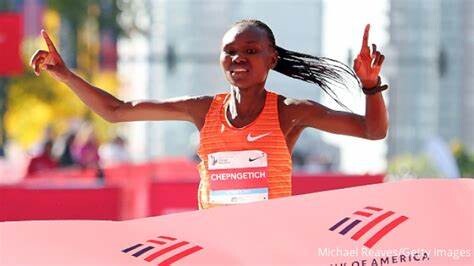
Jepkosgei, who won the London Marathon in 2021 and New York City Marathon in 2019, finished fourth in Chicago last year in 2:17:23.
She improved by one place when returning to marathon action in London in April, setting a PB of 2:16:24.
It’s Kebede who leads this season’s top list, thanks to the PB of 2:15:55 she set to win the Tokyo Marathon in March. That puts her at No.8 all time and she will be hoping to make the most of the fast course in Chicago.
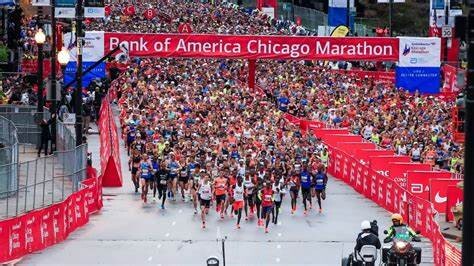
“After seeing what my teammate Kelvin Kiptum did last year, I want to come to Chicago to do something great,” said Kebede, who finished 15th in last year’s race.
Kiptum, who was part of Kebede’s training group, died in a road traffic accident in February, just four months after he set his world marathon record of 2:00:35 in Chicago. This year, the event will honour Kiptum’s legacy with a moment of silence at the start line.
Joining Chepngetich, Jepkosgei and Kebede on that start line will be three more women with PBs under 2:18 – Ethiopia’s Degitu Azimeraw, Ashete Bekere and Hiwot Gebrekidan – plus Kenya’s Irine Cheptai, who ran 2:18:22 in Hamburg in April.
The field also features the second and third fastest ever US women’s marathon runners, Keira D’Amato and Betsy Saina, who have also dipped under 2:20. They are joined in this competitive field by their compatriots Sara Hall and Emma Bates.
Ethiopia’s Legese leads the men’s field with the PB of 2:02:48 he ran in Berlin in 2019. That performance puts him sixth on the men’s world marathon all-time list but since then his highest marathon finish has been a third place, achieved in Rotterdam with a 2:05:16 run in April.
The two-time Tokyo Marathon champion will want to return to winning ways when he heads back to Chicago, where he placed 10th when making his World Marathon Majors debut in 2018, but he faces tough opposition.
Six other men in the field have PBs faster than 2:06, including Kenya’s Amos Kipruto, Vincent Ngetich and John Korir, and Ethiopia’s Dawit Wolde, Amedework Walelegn and Mohamed Esa.
Kipruto, the 2019 world bronze medallist, and Ngetich have matching PBs of 2:03:13. Kipruto won the London Marathon in 2022 and trains with Benson Kipruto, who won that year’s Chicago Marathon, while Ngetich was second in the Berlin Marathon last year, five places ahead of Kipruto. He was also third at this year’s Tokyo Marathon.
Korir ran his PB of 2:05:01 when finishing third in Chicago in 2022, while Wolde ran 2:03:48 in Valencia last year, Esa has a best of 2:05:05 from Amsterdam in 2022 and Walelegn clocked 2:04:50 in Rotterdam in April, finishing runner-up – one place ahead of Legese.
Looking to join them at the front of the field will be Kenya’s Daniel Ebenyo, the world 10,000m and half marathon silver medallist who makes his marathon debut. The 29-year-old ran a 59:30 half marathon in Berlin in April, 26 seconds off his PB set in Manama in 2022.
Ethiopia’s Jemal Yimer Mekonnen, who finished fourth in the half marathon at last year’s World Road Running Championships behind runner-up Ebenyo, is back in marathon action after his win in Seoul in March.
Among the athletes racing on home soil are USA’s Zach Panning, CJ Albertson and Brian Shrader.
Elite fields
WomenRuth Chepngetich (KEN) 2:14:18Sutume Kebede (ETH) 2:15:55Joyciline Jepkosgei (KEN) 2:16:24Degitu Azimeraw (ETH) 2:17:58Ashete Bekere (ETH) 2:17:58Hiwot Gebrekidan (ETH) 2:17:59Irine Cheptai (KEN) 2:18:22Keira D'Amato (USA) 2:19:12Betsy Saina (USA) 2:19:17Sara Hall (USA) 2:20:32Emma Bates (USA) 2:22:10Buze Diriba (ETH) 2:23:11Sara Vaughn (USA) 2:23:24Susanna Sullivan (USA) 2:24:27Gabi Rooker (USA) 2:24:35Lindsay Flanagan (USA) 2:24:43Stacey Ndiwa (KEN) 2:25:29 Lauren Hagans (USA) 2:25:56Annie Frisbie (USA) 2:26:18Jackie Gaughan (USA) 2:27:08Dominique Scott (RSA) 2:27:31Diane Nukuri (USA) 2:27:50Makena Morley (USA) 2:30:25Anne Marie Blaney (USA) 2:30:43Amy Davis-Green (USA) 2:33:09Aubrey Frentheway (USA) debut
MenBirhanu Legese (ETH) 2:02:48Amos Kipruto (KEN) 2:03:13Vincent Ngetich (KEN) 2:03:13Dawit Wolde (ETH) 2:03:48Amedework Walelegn (ETH) 2:04:50John Korir (KEN) 2:05:01Mohamed Esa (ETH) 2:05:05Jemal Yimer (ETH) 2:06:08Kyohei Hosoya (JPN) 2:06:35Toshiki Sadakata (JPN) 2:07:05Tatsuya Maruyama (JPN) 2:07:50Yuichi Yasui (JPN) 2:08:48Jorge Castelblanco (PAN) 2:09:24Zach Panning (USA) 2:09:28Brian Shrader (USA) 2:09:46CJ Albertson (USA) 2:09:53Tomoki Yoshioka (JPN) 2:10:03Reed Fischer (USA) 2:10:34Nathan Martin (USA) 2:10:45Colin Mickow (USA) 2:11:22Kevin Salvano (USA) 2:11:26Jacob Thomson (USA) 2:11:40Turner Wiley (USA) 2:11:59Shadrack Kipchirchir (USA) 2:13:02JP Flavin (USA) 2:13:27Charlie Sweeney (USA) 2:13:41Ben Kendell (USA) 2:15:49Phil Parrot-Migas (CAN) 2:15:53Aaron Gruen (USA) 2:15:56Daniel Ebenyo (KEN) debutPeter Lynch (IRL) debutAlex Maier (USA) debutAlex Masai (USA) debut
by World athletics
Login to leave a comment
Bank of America Chicago
Running the Bank of America Chicago Marathon is the pinnacle of achievement for elite athletes and everyday runners alike. On race day, runners from all 50 states and more than 100 countries will set out to accomplish a personal dream by reaching the finish line in Grant Park. The Bank of America Chicago Marathon is known for its flat and...
more...Tadese Worku, Faith Chepkoech top finishers at rainy Beach to Beacon
For the first time in the 26-year history of the race, started by 1984 Olympic marathon gold medalist and Cape Elizabeth native Joan Benoit Samuelson, runners left the starting line as rain fell. On Friday night, with thunderstorms expected Saturday morning, organizers pushed the start back an hour. Still, it poured as wheelchair racers took off at 8:50 a.m., and the rain was still steady when the elite women’s field started 10 minutes later.
“If anything, it was just going to be a true race, and we weren’t going to worry about times,” said Susanna Sullivan of Reston, Virginia, who finished fourth in the women’s race. “It takes a little bit of the pressure off, too, when you know it’s just going to be a race and not a time trial.”
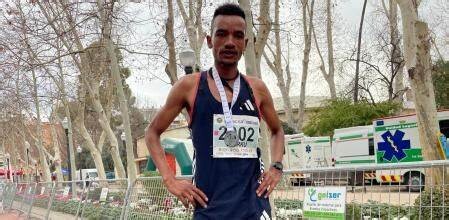
Making her Beach to Beacon debut, Kenya’s Faith Chepkoech, 21, won the women’s race in 32 minutes, 5 seconds – 12 seconds ahead of 44-year-old Edna Kiplagat (32:17), another Kenyan who placed fifth in last year’s race. Cintia Chepngeno, also of Kenya, was third (32:20), two seconds ahead of Sullivan, the top American finisher.
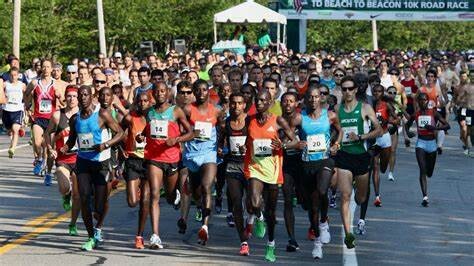
The men’s winner, Tadese Worku of Ethiopia, also made his Beach to Beacon debut. Worku, 22, won in 28:12, pulling away from runner-up Peter Mwaniki Aila (28:25) down the stretch. Mathew Kimeli, who won the Beach to Beacon in 2022, placed third (28:31). Biya Simbassa of Flagstaff, Arizona, was the top American male finisher, taking fourth in 28:34 for his third consecutive top-five finish.
The weather didn’t keep fans from cheering for runners along the course. Runners were serenaded by Dolly Parton’s “9 to 5” at around the 2 1/2-mile mark. A mile later, runners were greeted by a bagpiper. Mile after mile, there were loud cheers for the 6,072 participant.
by Tadese Worku, Faith Chepkoech
Login to leave a comment
TD Beach to Beacon 10K
Joan Benoit Samuelson, a native of Cape Elizabeth, Maine, won the first-ever women's Marathon at the 1984 Olympics in Los Angeles and is founder and chair of the TD Bank Beach to Beacon 10K. "A long time dream of mine has been realized" says Samuelson. "I've always wanted to create a race that brings runners to some of my most...
more...For Betsy Saina, the U.S. Olympic Trials Marathon Presents a Chance to Represent Her Son
For much of last year, Betsy Saina had a plan. She would race the Chicago Marathon in October, eager to run alongside Emma Bates (who placed fifth at last year’s Boston Marathon in a new personal best of 2:22:10) in pursuit of breaking Emily Sisson’s American record of 2:18:29, set the previous year at that same race.
Saina, 35, a naturalized U.S. citizen who represented Kenya in the 2016 Olympics in Rio de Janeiro—she placed fifth in the 10,000 meters 30:07.78—had reason to be confident. Last spring, she set a new personal best of 2:21:40 with her fifth-place finish at the Tokyo Marathon, which wound up being the fastest marathon by an American woman in 2023 and made her the eighth-fastest U.S. female marathoner of all-time, solidifying her position as a top U.S. Olympic marathon team contender.
The Chicago Marathon had assured Saina’s agent, Tom Broadbent, that she was in for the race. But when the elite field was announced in August, Saina learned she had not been accepted, which not only threw a wrench in her fall training plans, but made for a lot of stress as she was planning her U.S. Olympic Marathon Team Trials buildup.
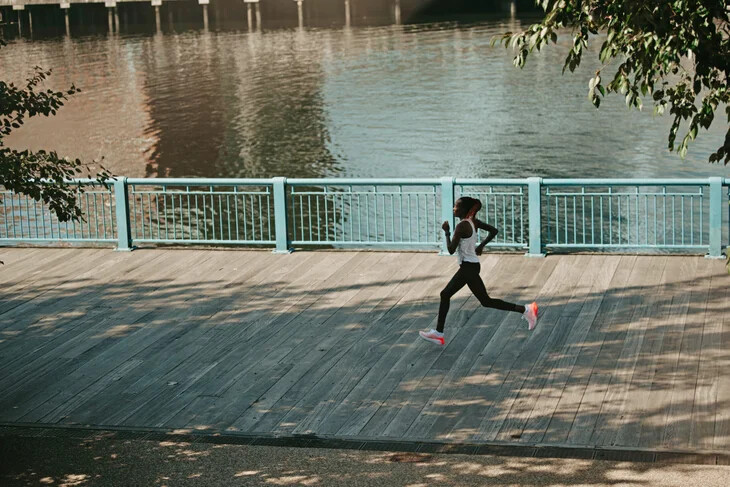
“I was shocked and spent three days looking at myself and trying to find any mistakes I made to not make the field, especially after running 2:21 in Tokyo,” Saina says. “I had never been rejected from a race before, and never got a response or an explanation as to why I didn’t make it. Being denied to run in Chicago honestly was one of the most disappointing things I’ve experienced in my career.”
Saina looked into entering the Berlin Marathon the following month, but had no such luck getting in with it being so late in the game. She was ultimately accepted into the Sydney Marathon (which shares its sponsor, ASICS, with Saina) on September 16. Unlike Chicago—with its fast, flat course that ended up having ideal racing conditions with temperatures in the 40s—Sydney has a hilly course and race-day weather was on the hotter side, with a starting temperature of 68 degrees.
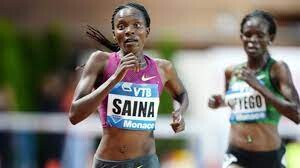
Despite the conditions, Saina proved herself once again, winning the race in 2:26:47. This sealed her confidence as she began to look ahead to the Olympic Trials in Orlando on February 3. If she’s one of the top three finishers in the women’s race in Florida, she’ll earn a spot on the U.S. team that will compete in the marathon at the Paris Olympics on August 11.
“Challenges make people strong, and running a good marathon on a harder course made me come back feeling motivated,” she says. “[Even though it wasn’t the faster time I originally wanted], it didn’t stop me from being a better version of myself.”
Transcendent Transplant
Despite her impressive performances in 2023, Saina has remained largely under the radar in terms of media coverage and fan predictions leading up to the Trials in Orlando, similarly to what fellow Kenyan-born marathoners Aliphine Tuliamuk and Sally Kipyego (both of whom made the last Olympic marathon team) experienced in 2020. The lack of attention relative to her competitors hasn’t fazed Saina, however.
“I know how to deal with pressure, having been in the sport since 2013, so as long as my training is going well, I don’t pay too much attention to what people say,” Saina says. “I’m just more excited to see many of the U.S. women [who are also] my friends, like Emily Sisson, Sara Hall, and Keira D’Amato, and to be racing so many amazing U.S. athletes for the first time.”
Saina’s result in Tokyo was only about a minute faster than her debut at the distance at the 2018 Paris Marathon, which she won in 2:22:56 (after dropping out of the 2017 Tokyo and New York City Marathons). It was also a confidence boost for Saina because it was also her first marathon since giving birth to her son, Kalya, now two, in December 2021, after previously running 2:22:43 and 2:31:51 at the 2019 Toronto Waterfront and Honolulu Marathons, respectively.
Saina—who originally came to the U.S. to attend Iowa State University where she trained alongside Tuliamuk and was a three-time individual NCAA champion and 11-time NCAA All-American—has remained in her hometown of Iten, Kenya, for the majority of the time since having her son, as her husband, Meshack Korir, is a doctor completing his postgraduate education there.
Although Saina became a U.S. citizen in late 2020 and has a home base in Colorado Springs, she made the decision to return to Kenya to have additional family support and childcare as she worked to come back from pregnancy and childbirth to prepare for the Olympic Trials, which she’ll return for just a few days before the race. Saina also keeps busy managing a couple of guesthouses, which she regularly rents out to visiting athletes and tourists. She also works with Cross World Africa, a nonprofit that sponsors underprivileged children in pursuing secondary and higher education.
“Before I came from Kenya, my family was struggling and we had to fundraise for my flight ticket to come to the U.S. Being here has changed my family in a different way—I have two sisters who are now nurses in the U.S., and my parents can now more easily fly to visit us, and while it is not where I began running, the U.S. where I began competing at such a high level,” she says. “My son also gives me so much motivation and is my inspiration. When I see him, I see beauty in myself and see myself getting better when I’m running. So I am excited both to compete and represent my son, and to hopefully wear the U.S. uniform because it has so much meaning for me.”
Back in Iten, Saina has been training in a group with personal pacemakers alongside 2019 New York City Marathon champion Joyciline Jepkosgei, which she describes as game-changing for her progress in the marathon. Both Saina and Jepkosgei, who is also the former world-record holder in the half marathon and Saina’s best friend from high school, are coached by Jepkosgei’s husband, Nicholas Koech.
“Sometimes you will train with people who don’t want to help someone else get better, but [Jepkosgei], who has run 1:04 [in the half marathon] and 2:17 [in the marathon] is unique in that she has sacrificed a lot, which I don’t think a lot of women will ever do for each other, and I don’t think I would either,” Saina says. “But she has been pushing me a lot since the first day I joined her, and I think that’s the reason I came back and I’ve had better races. I have someone to chase and it’s like competition in training, but in a good way.”
American Original
Saina returned to the U.S. twice last year, to race the USATF 25K Championships in Grand Rapids, Michigan, (where she took the win in 1:24:32 for her first U.S. title, narrowly beating D’Amato) and to be inducted into Iowa State’s Athletics Hall of Fame in September. Saina had planned to do some shorter U.S. races, including the Bolder Boulder 10K in May and the NYRR Mini 10K in June, following her national championship title in the 25K. However, she ultimately decided she couldn’t bear to be away from her son any longer.
“As a mom, when you’re away, you are so worried because you’re like, ‘How is he doing right now? How can I handle the pressure, being away from him?’” Saina says. “This year, it’s really different for me because the only race I want to travel to without Kalya is the Olympic Trials. He is growing now and getting better, so I want to travel with him afterward to compete in the USATF circuit. That’s the biggest goal for 2024, to travel with my son.”
Later this year, Saina hopes to also run the April 7 Cherry Blossom 10-Miler in Washington, D.C., the Mini 10K on June 8 in New York City, and a fast spring half marathon to pursue the current American record (which was broken yet again by Weini Kelati on January 14 in Houston), before running another marathon in the fall. In the meantime, she noted that she is especially eager to compete in one of the deepest fields ever assembled for the Trials.
Although Bates withdrew from the Trials, Saina figures to be one of the favorites in Orlando along with Sisson, Hall, Tuliamuk, D’Amato, and Seidel. However, Lindsay Flanagan (ninth in last summer’s world championships), Sara Vaughn, Susanna Sullivan, Gabriella Rooker, Dakotah Lindwurm, and Nell Rojas are all sub-2:25 marathoners, and thus top contenders, too.
“The U.S. is no longer small and non-competitive. Look at Molly Seidel. She got bronze at the Tokyo Olympics, and I remember when Amy [Cragg] was a bronze medalist at the 2017 World Championships. If you put that in perspective, it has changed even more right now compared to that time,” she says. “The competition [to make the U.S. team] is no longer as easy as the way some people [thought], and I’m super excited to be competing with a lot of solid women. There is no difference between the U.S. and other countries right now—it’s not just to go compete at the Olympics; they’re going to compete for the medals, just like other countries.”
by Emilia Benton
Login to leave a comment
2028 US Olympic Trials Marathon
Most countries around the world use a selection committee to choose their Olympic Team Members, but not the USA. Prior to 1968, a series of races were used to select the USA Olympic Marathon team, but beginning in 1968 the format was changed to a single race on a single day with the top three finishers selected to be part...
more...Defending Champions, American Record Holders & Global Stars Highlight 2023 B.A.A. Half Marathon Professional Field
The Boston Athletic Association (B.A.A.) announced today a star-studded professional field for the 2023 B.A.A. Half Marathon presented by Dana-Farber Cancer Institute and the Jimmy Fund. Defending champions Viola Chepngeno, Geoffrey Koech, and Jenna Fesemyer all return, while American half marathon record holder Keira D’Amato will take on the challenging course for the first time on Sunday, November 12. The B.A.A. Half Marathon starts and finishes at Franklin Park and runs along the Emerald Necklace Park System.
“As one of the most competitive half marathons in the country, we’re eager to bring many of the best open, wheelchair, and Para athletes in the world to Boston for November’s B.A.A. Half Marathon presented by Dana-Farber Cancer Institute and the Jimmy Fund,” said Jack Fleming, President and CEO of the B.A.A. “Nearly 9,000 athletes will take to the roads, led by some of the fastest and most decorated competitors in event history.”
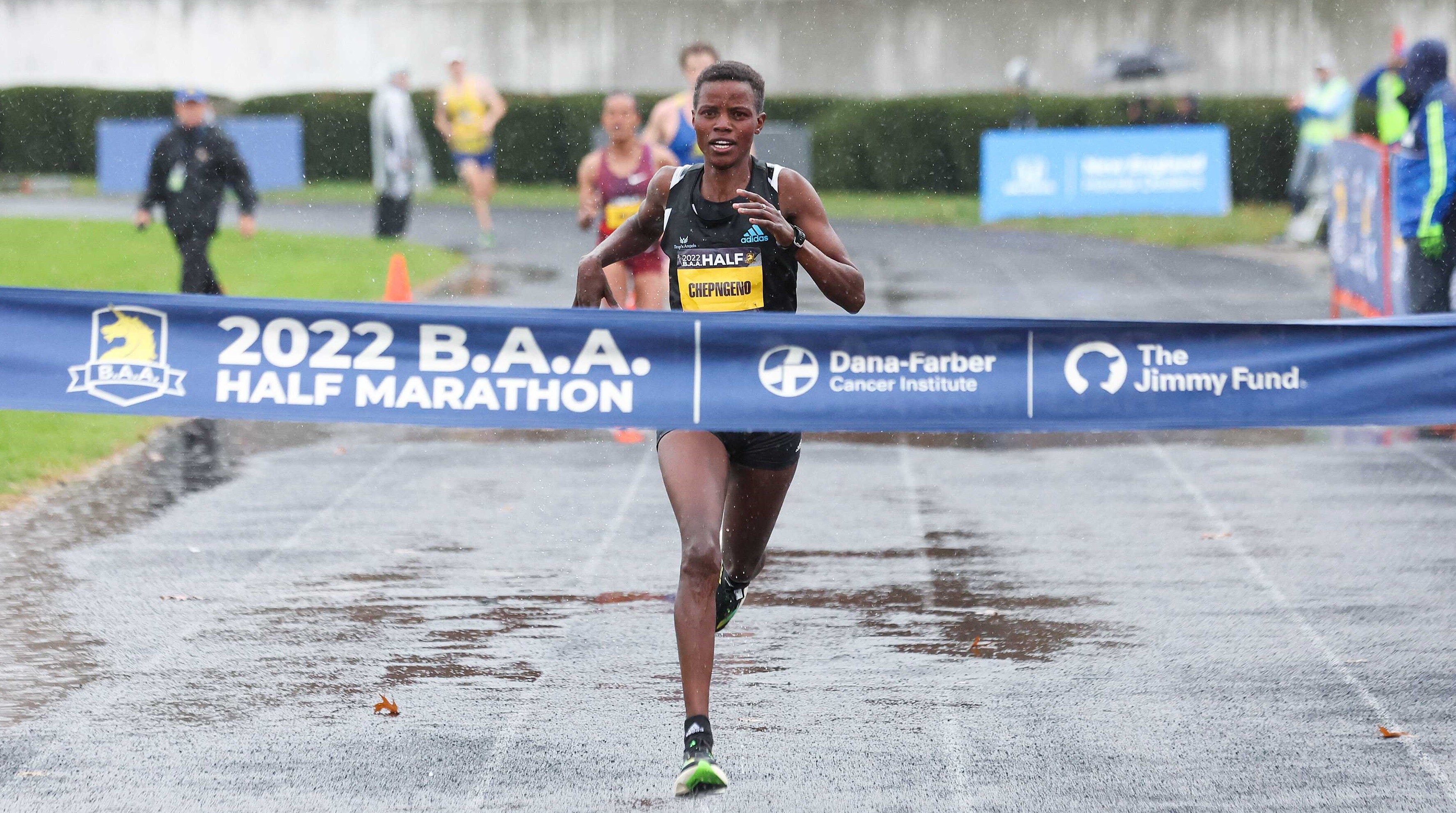
In 2022, Chepngeno (Kenya), Koech (Kenya), and Fesemyer (USA) won the women’s open, men’s open, and women’s wheelchair divisions, respectively, while Marko Cheseto and Jacky Hunt-Broersma (both USA) persevered through rain to finish atop the podium in the Para Athletics Division. To repeat the feat, all will square off against a field that includes national record holders and global medalists.
Senbere Teferi of Ethiopia, the 2022 B.A.A. 5K champion and three-time world championships medalist, looks to continue her winning ways in Boston. She’ll battle Tokyo Marathon champion Rosemary Wanjiru, 2019 B.A.A. 10K winner Fancy Chamutai, world cross country silver medalist Tsigie Gebreselama, last year’s runner-up Bosena Mulatie, and two-time B.A.A. Half Marathon second place finisher Cynthia Limo.
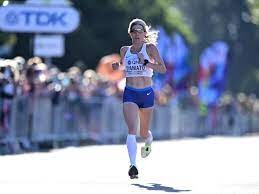
Four Americans who competed at the World Athletics Championships in Budapest in August will toe the line, including D’Amato, Lindsay Flanagan, Susanna Sullivan, and Natosha Rodgers. D’Amato set the national half marathon record of 1:06:39 at this year’s Gold Coast Half Marathon in Australia, and along with Flanagan and Sullivan made up Team USA at the World Championships Marathon. Rodgers raced the 5,000m and 10,000m on the track in Budapest, finishing 14th in the latter event. Rachel Schneider Smith, a 2021 Olympian at 5,000m for Team USA, will be making her B.A.A. Half Marathon debut.
Ten men with sub-61 minute personal bests will line up for the B.A.A. Half Marathon. Abel Kipchumba owns the fastest lifetime best in the field (58:07), while Shadrack Kimining of Kenya, second fastest in the field, placed fifth in 2022. Mohamed El Aaraby (Morocco), Yemane Haileselassie (Eritrea), Pat Tiernan (Australia), and Amanuel Mesel (Eritrea) bring international expertise. The fastest American men’s entrants are Nadir Yusuf (1:03:23), Kevin Koski (1:03:35) and Ryan Cutter (1:03:54) and sub-2:10 marathoner Ian Butler.
Dedham, Mass.-native Brian Reynolds, who set a world record at last year’s B.A.A. Half Marathon in the T62 (lower-limb impairment) category, returns, as does Marko Cheseto (T62) who ran 1:24:54 in 2022. Jacky Hunt-Broersma, last year’s women’s T62 champion, and Liz Willis, a three-time Boston Marathon T62 winner, will compete as well.
In the wheelchair division, Fesemyer set a course record 59:50 in 2022 to become the first women’s wheelchair athlete ever to break one hour in race history. Fellow 2022 women’s wheelchair podium finishers Yen Hoang (second place) and Michelle Wheeler (third) return as well.
James Senbeta and Hermin Garic, veterans of many B.A.A. events, headline the men’s wheelchair field. Garic was victorious at this year’s B.A.A. 10K.
The B.A.A. Half Marathon course runs along the picturesque Emerald Necklace Park System, past landmarks such as the Arnold Arboretum, Jamaica Pond, and Franklin Park Zoo, before finishing at White Stadium in Franklin Park. The B.A.A. Half Marathon is a family-friendly event for athletes and spectators of all ages. Free youth events will be offered on race morning within Franklin Park, including races and medals for all.
Dana-Farber Cancer Institute and the Jimmy Fund has partnered with the B.A.A. Half Marathon since 2003 as the race’s presenting sponsor and exclusive charity team. Through this relationship, Dana-Farber runners have collectively raised more than $8 million to support groundbreaking cancer research, and enabled Dana-Farber scientists and clinicians to positively impact the lives of cancer patients around the world. In advance of the 2023 event, 640 Team Dana-Farber athletes have raised $375,000 to date.
Login to leave a comment
B.A.A. Half Marathon
Dana-Farber and the Jimmy Fund have partnered with the B.A.A. in the Half Marathon for 13 years as the race’s presenting sponsor. Through this relationship, team members have collectively raised more than $5 million to support groundbreaking cancer research, and enabled Dana-Farber scientists and clinicians to positively impact the lives of cancer patients around the world. Dana-Farber runners often participate...
more...The Road to the Paris Olympics and here is What You Need to Know.
American runners are about to begin training for the U.S. Olympic Trials Marathon
It’s early October, which means it’s the peak marathon season for many runners. But with an Olympic year on the horizon, it also means America’s top marathoners are about to hit the road to Paris.
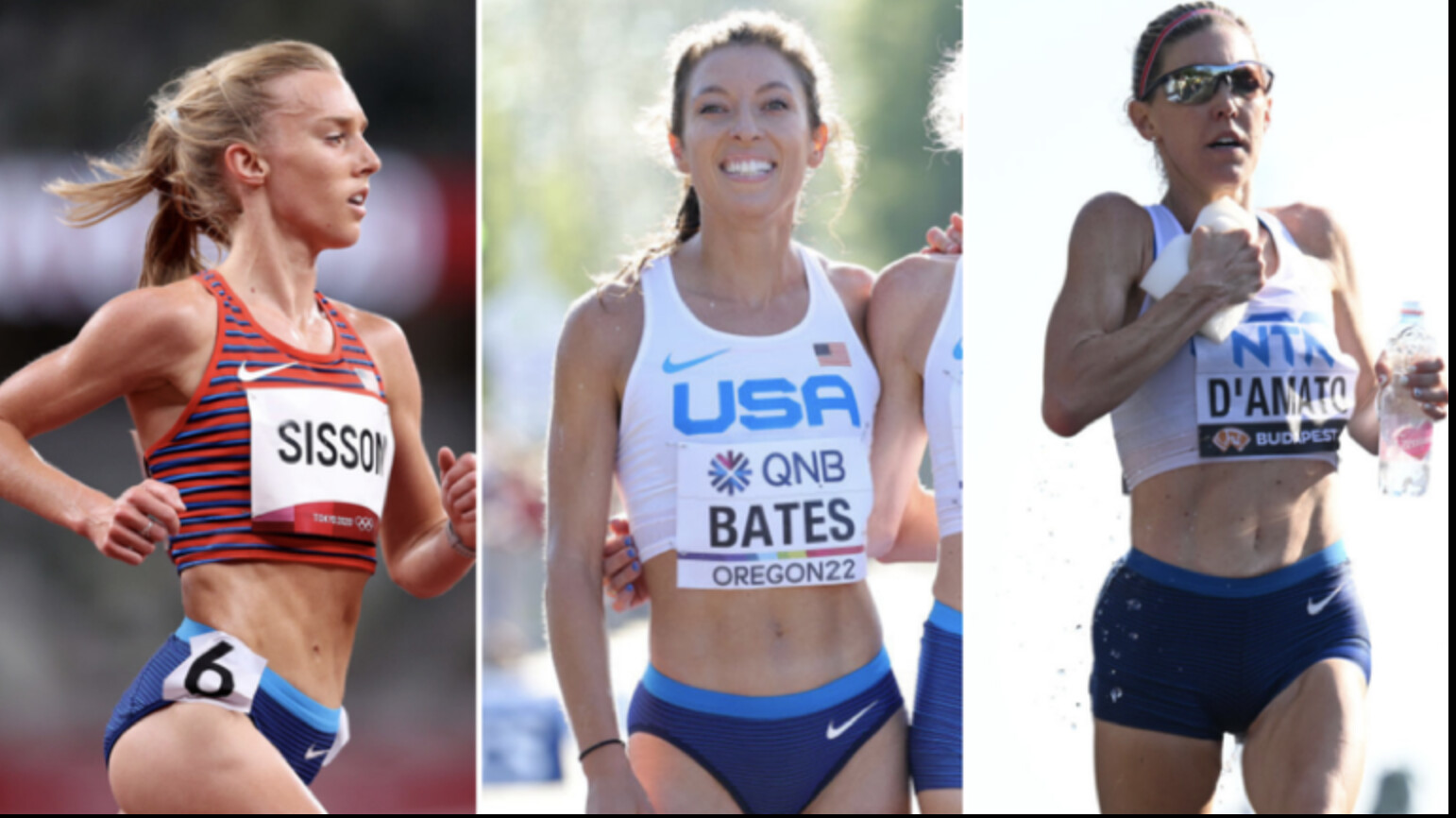
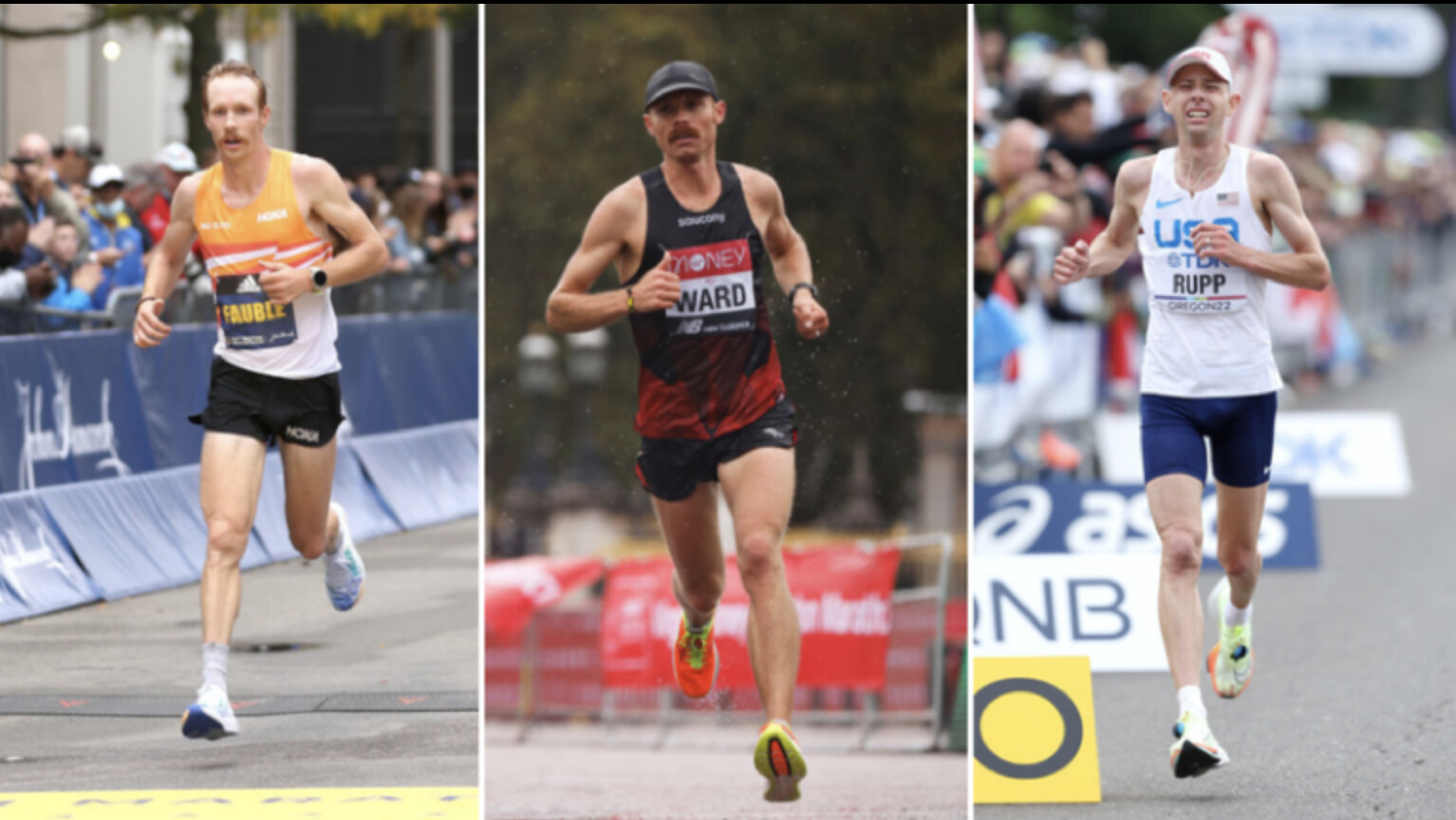
More specifically, the men’s and women’s 2024 U.S. Olympic Trials Marathon races—scheduled for February 3 in Orlando, Florida—are just four months away. And that means the top U.S. runners hoping to represent their country at next summer’s Olympics are about to begin preparing for the all-or-nothing qualifying race that decides which six runners will represent Team USA next summer on the streets of Paris.
Although several top American runners are racing the Chicago Marathon on October 8, even they have their eyes on a much bigger prize next February.
“There’s nothing in my mind that compares with being an Olympian and being in the Olympic Games,” says 26-year-old Utah-based Nike pro Conner Mantz, who returns to Chicago after finishing seventh last year in 2:08:16 in his debut at the distance. “So putting that first has been the plan for a long time. We’re just putting that first and we’re working backwards through the season with other races.”
Registration will open for the U.S. Olympic Trials Marathon in early November for runners who have surpassed the qualifying times in the marathon (2:18:00 for men, 2:37:00 for women) or half marathon (1:03:00 for men, 1:12:00 for women). The qualifying window extends through December 3—the race date of the last-chance California International Marathon, which for decades has been one of the most popular Olympic Trials qualifying races.
In 2020, a record 708 runners—465 women and 243 men—qualified for the U.S. Olympic Trials Marathon in Atlanta just before the onset of the Covid-19 pandemic. But USA Track & Field lowered the women’s qualifying standard by eight minutes from the more attainable 2:45:00 plateau, which means there will most likely be a much smaller women’s field this year.
But even so, amid the handful of runners who have a legitimate shot at making the Olympic team, there will also be dozens of dreamers, wannabes, and just-happy-to-be-there elite amateurs who have worked hard, put in the miles, and earned the chance to be on the start line of the deepest and most competitive U.S. distance-running races that only happen once every four years.
The men’s and women’s races will run simultaneously with the men beginning at 12:10 P.M. EST. and the women starting 10 minutes later. Runners have complained that a high noon start means they will be forced to race in hot, humid conditions. Over the past decade, the average temperature on February 3 in Orlando has been 69.6 degrees Fahrenheit at noon, rising to 73.3 at 4 PM. But actual temperatures have varied drastically, from 81 degrees Fahrenheit at 2 P.M. last year to 56 at the same time the year before. USATF officials have responded by saying that the start times are to accommodate live coverage on NBC and to match the expected conditions in Paris.
Here’s an update and overview of what’s next, who the top contenders are, the course, and what to expect in the next four months.
The 26.2-mile U.S. Olympic Trials course runs through downtown Orlando and consists of one 2.2-mile loop and three eight-mile loops. The marathon course will run through several neighborhoods, main streets, and business districts in Orlando, including Central Business District, City District, South Eola, Lake Eola Heights Historic District, Lake Cherokee Historic District, Lake Davis Greenwood, Lake Como, North Quarter, Lawsona/Fern Creek, SoDo District, and the Thornton Park neighborhood. It will then head east to and around The Milk District neighborhood and Main Street. (Notably, the course will come close to Disney World, which is about 15 miles to the southwest.)
Unlike the Olympic Marathon course in Paris, which will challenge runners with significant hills in the middle, the Orlando course is mostly flat. Each loop has a few minor variations in pitch, but only 38 feet separate the high and low points on the course. Ultimately, though, it’s a spectator-friendly route with chances for family, friends, and fans of runners to see the action several times.
The top women—based on personal best times and recent race results—are Emily Sisson, Emma Bates, Keira D’Amato, Betsy Saina, and Lindsay Flanagan. But the U.S. Olympic Trials races almost always produce surprises with a few great runners having off days and a few good runners having exceptional days, so there is reason to expect the unexpected.
Sisson lowered the American record to 2:18:29 last year when she finished second in the Chicago Marathon. She’s running Chicago again on October 8 along with Bates, who has said she’s hoping to break the American record. In January, Sisson, 31, chopped her own American record in the half marathon in Houston with a 1:06:52 effort, and most recently won the U.S. 20K Championships (1:06:09) on September 4 in New Haven, Connecticut. Bates, also 31, hasn’t raced at all since her sterling fifth-place effort at the Boston Marathon in April, when she slashed her personal best to 2:22:10.
While Chicago will be another good place to test themselves, both have unfinished business after Bates was seventh at the 2020 Trials and Sisson dropped out near the 21-mile mark.
The same goes for Flanagan, 32, who has been one of America’s best and most consistent marathoners for the past five years. She placed 12th at the trials in 2020. She had a breakthrough win (2:24:43) at the Gold Coast Marathon in 2022 followed by a strong, eighth-place finish (2:26:08) at the Tokyo Marathon earlier this year. In August, she ran perhaps the best race of her career, when she finished ninth (2:27:47) at the world championships in Budapest amid hot, humid conditions.
The 38-year-old D’Amato, meanwhile, just capped off another strong season with a 17th-place showing (2:31:35) at the World Athletics Championships in Budapest, a year after finishing eighth in the world championships and setting an American record 2:19:12 at the 2022 Houston Marathon. She was 15th at the Trials in 2020 in 2:34:24, just two years into her competitive return to the sport after having two kids and starting a career in real estate in her early 20s.
“It’s such a huge goal of mine to become an Olympian,” says D’Amato, who lowered Sisson’s U.S. record in the half marathon with a 1:06:39 effort at the Gold Coast Half Marathon on July 1 in Australia. “It’s really hard for me to put words into this because my whole life, wearing a Team USA jersey has been like a huge dream. And when I left the sport (temporarily), I felt like I said goodbye to that dream and I kind of mourned the loss of being able to represent my country. I feel like it’s the greatest honor in our sport to be able to wear our flag and race as hard as possible.”
Saina, a 35-year-old Kenya-born runner who ran collegiately for Iowa State University, became a U.S. citizen in late 2021. She placed fifth in the 10,000-meters at the 2016 Olympics in Rio de Janeiro while competing for Kenya. She’s spent the past several years splitting time between Kenya and Nashville, Tennessee, where she gave birth to a son, Kalya, in December 2021.
She’s returned with a strong fourth-place 1:11:40 result at the Tokyo Half Marathon last October and a fifth-place 2:21:40 showing at the Tokyo Marathon in February. In May, Saina won the U.S. 25K Championships in Michigan. Two weeks ago she broke the tape at the Blackmores Sydney Marathon in Australia in 2:26:47.
Other top contenders include but are not limited to Tokyo Olympics bronze medalist Molly Seidel (who’s personal best is 2:24:42), 2022 U.S. Olympic Trials champion Aliphine Tuliamuk (2:24:37, 11th in Boston this year), Susanna Sullivan (2:24:27 personal best, 10th in London this year), two-time Olympian and 2018 Boston Marathon winner Des Linden (2:22:38), and Sara Hall (2:20:32, fifth at last year’s world championships), plus Kellyn Taylor (2:24:29), Nell Rojas (2:24:51), Sarah Sellers (2:25:43), Lauren Paquette (2:25:56), Dakotah Lindwurm (2:25:01), Annie Frisbie (2:26:18), Sara Vaughn (2:26:23), Tristin Van Ord (2:27:07), and Jacqueline Gaughan (2:27:08).
The list of potential men’s top contenders isn’t as clear-cut, partially because there are so many sub-2:11 runners and several fast runners who are relatively new to the marathon. But all that suggests a wide-open men’s race where more than a dozen runners are legitimately in the mix for the three Olympic team spots. That said, the top runners on paper, based on both time and consistent results over the past few years, are Scott Fauble, Jared Ward, Galen Rupp, Conner Mantz, Leonard Korir, Matt McDonald, and C.J. Albertson.
The 31-year-old Fauble, who was 12th in the Olympic Trials in 2020 and owns a 2:08:52 personal best, has finished seventh in the Boston Marathon three times since 2019 and also finished seventh in the New York City Marathon in 2018. Ward is a 2016 U.S. Olympian and has three top-10 finishes at the New York City Marathon and a 2:09:25 personal best from Boston in 2019. He’s 35, but he just ran a 2:11:44 (27th place) at the Berlin Marathon in late September.
Rupp, who won the past two U.S. Olympic Trials Marathons and earned the bronze medal in the marathon at the 2016 Olympics, is nearing the end of his competitive career. He boasts a 2:06:07 personal best and has run under 2:10 more than any American in history, including when he finished 19th at the world championships (2:09:36) last year. He’s a bit of a wild card because he’s 37 and hasn’t raced since his lackluster 17th-place showing at the NYC Half Marathon (1:04:57) in March, but the world will get a glimpse of his fitness in Chicago this weekend.
Mantz followed up his solid debut in Chicago last fall with a good Boston Marathon in April (11th, 2:10:25) and solid racing on the track and roads all year, including his recent runner-up showings at the Beach to Beacon 10K in August and the U.S. 20K Championships in September.
McDonald, 30, who was 10th in the 2020 U.S. Olympic Trials, has quietly become one of the best marathoners in the U.S. while serving as a postdoctoral associate in chemical engineering at M.I.T. His last three races have clocked in at 2:10:35 (Boston 2022), 2:09:49 (Chicago 2022), and 2:10:17 (Boston 2023). The only other runner who rivals that kind of consistency is Albertson, 29, who has run 2:10:23 (Boston 2022), 2:10:52 (Grandma’s Marathon 2022) and 2:10:33 (Boston 2022) in his past three marathons and was seventh in the U.S. Olympic Trials in 2020 (2:11:49).
The men’s race will likely have a mix of veteran runners and newcomers who have run in the 2:09 to 2:10 range since 2022. Among those are 2020 U.S. Olympic Trials runner-up Jake Riley (2:10:02 personal best), who is returning from double Achilles surgery; 2016 U.S. 10,000-meter Olympian Leonard Korir (2:07:56), who ran a 2:09:31 in Paris in April; Zach Panning (2:09:28, plus 13th at the world championships in August); U.S. 25K record-holder Parker Stinson (2:10.53); Futsum Zienasellassie who won the California International Marathon last December in his debut (2:11:01) and then doubled-back with a new personal best (2:09:40) at the Rotterdam Marathon in the spring; Abbabiya Simbassa, who ran a solid debut marathon (2:10:34) in Prague this spring; and Eritrean-born Daniel Mesfun (2:10:06) and Ethiopian-born Teshome Mekonen (2:10:16), who both received U.S. citizenship within the past year; and solid veterans Nico Montanez (2:09:55), Elkanah Kibet (2:10:43) and Nathan Martin (2:10:45).
Additional sub-2:12 runners who will be in the mix are Andrew Colley (2:11:26), Clayton Young (2:11:51), Brendan Gregg (2:11:21), Josh Izewski (2:11:26), Jacob Thompson (2:11:40), and Kevin Salvano (2:11:49).
As noted previously, some top contenders will season their marathon legs one final time at the flat and fast Chicago Marathon on October 8. An even more select few will opt for the New York City Marathon on November 5. After that, nearly every American with eyes set on an Olympic berth will double-down over the holiday season for that one final, critical marathon training cycle. Expect to see a wide range in heat training, from sauna protocols, to warm weather training trips, to simply an adjusted race day strategy.
Of course, with the Olympic Marathon falling under the purview of World Athletics, qualifying for the U.S. Olympic Marathon team is not quite as simple as finishing on the podium in Orlando. Any American looking to have a breakout performance and finish within the top three at the U.S. Olympic Trials Marathon will need to have run under 2:11:30 for men and 2:29:30 for women within the qualification window, which spans from November 1, 2022 to April 30, 2024. Given the possibility of oppressively hot and humid temps on February 3 in Orlando, they’re best bet is to secure that time now.
These qualification standards are in accordance with a new rule from World Athletics, which allows national Olympic committees to circumvent the typical Olympic qualification process of running under 2:08:10 for men and 2:26:50 for women, or being ranked among the top 65 in the world on a filtered list of the top three athletes from each country. The catch, though, is that three other runners from said country must have met one of these two standards. If this sounds complicated, that’s because it is.
For the hundreds of elite amateurs on the cusp of hitting that coveted U.S. Olympic Trials qualifying time, it’s do or die mode. While a few made the cut at the Berlin Marathon on September 24, one of those opportunities was lost when the Twin Cities Marathon was canceled on October 1 because of excessive heat. Temperatures are shaping up for an auspicious day in Chicago this weekend, and many more will give it a final shot at the Columbus Marathon on October 15; Indianapolis Monumental Marathon on October 28; the Philadelphia Marathon on November 18; and the last-call California International Marathon, a point-to-point race ending in Sacramento, California on December 3.
Ultimately, only six American runners will likely continue on along the road to Paris and earn the chance to run in the men’s and women’s Olympic marathons next August 10-11. For a handful of younger runners, the 2024 U.S. Olympic Trials will be a motivation to reinvigorate the Olympic dream or keep a faint hope alive, at least until the 2028 U.S. Olympic Trials that will determine the team for the Los Angeles Olympics. But for many runners, the journey to the U.S. Olympic Trials in Orlando will lead to the end of their competitive road running careers as new jobs, young families, a switch to trail running, and other priorities will take hold.
“I think the Olympic Trials is an important part of American distance running,” says Kurt Roeser, 36, a two-time U.S. Olympic Trials Marathon qualifier who works full-time as a physical therapist in Boulder, Colorado. “I’m glad that they kept it the same event for this cycle and hopefully for future cycles because it gives people like me a reason to keep training. I’m older now and I’m not going to actually have a chance to make an Olympic team, but for somebody that’s fresh out out of college and maybe they just barely squeak in under the qualifying time, maybe that’s the catalyst they need to start training more seriously through the next cycle. And maybe four years from now, they are a serious factor for making the team.”
by Outside Online
Login to leave a comment
Too Mentally Fried on a Run? Here’s How to Motivate Yourself to Keep Going
New research shows that motivational self-talk can counter brain drain.
Susanna Sullivan is no stranger to mental fatigue. From late August until early June, the 2:24 marathoner teaches pre-algebra to 104 sixth-graders—which, if you’ve ever dealt with middle schoolers, you’ll know can be exhausting.
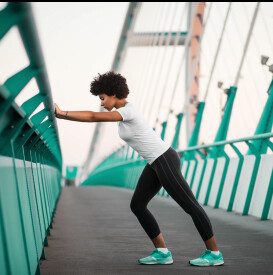
“If a student asks, ‘Can I go to the office?’ I immediately have to make all these other considerations: Who else is out of the room? Do I trust the kid to go directly to the office? Are they distressed?” says Sullivan. “By the end of the day, my brain is toast.”
While her non-athletic colleagues may be able to go home and recharge after a long day, Sullivan needs to find a way to rally. Her coach, who is the head coach at George Mason University, holds practices in the evenings. Given that Sullivan is expected to make the American marathon team for the World Championships in August, these workouts matter... whether she’s mentally drained or not.
Much of the prevailing advice recommends doing your best to prevent mental fatigue. For runners like Sullivan, however, prevention isn’t a viable option. In that case, science suggests motivational self-talk might be the solution.
The Problem With Mental Fatigue
Anyone who has had a “long day” knows what mental fatigue feels like: you’re drained, you can’t concentrate, your self-regulation is trashed, and you probably have no interest in going for a run, never mind a hard workout. This comes from putting in the effort to pay attention to something while blocking out distractors—which research shows is tiring and kills your ability to self-regulate.
“There are a certain amount of effs you can give in a day. And if you give them all up, by the end of the day you’ve got none left to give,” says Shannon Baird, Ph.D., a certified mental performance consultant who works with the United States Army Special Forces.
Typically, Baird and others recommend finding ways to pause and recharge throughout the day to avoid creating a mental fatigue “deficit.” If you become mentally fatigued, the most common recommendations are to put off a hard workout or adjust your pace or intervals. Sometimes, however—as in Sullivan’s reality—mental fatigue is unavoidable, and you can’t reschedule. If you hit traffic on your way to a race, for instance, you can’t just move the race to a different day, and you probably don’t want to give up on your goals. In that case, according to a recent study published in the Journal of Applied Sport Psychology, try some motivational self-talk.
Why Motivation Is Important
According to Gleber Pereira, Ph.D., an associate professor in the physical education department at Universidade Federal do Paraná in Brazil and the lead author on the study, motivation is a key contributor to whether or not you’re willing to continue exercising, particularly at a given intensity.
“We have two reasons to explain how you stop or continue exercise: potential motivation, or your willingness to keep exerting yourself in exercise, and motivational intensity, which is how you perceive effort during the exercise,” he says. According to this model, a runner will slow down or stop when their perceived effort matches their level of willingness.
Mental fatigue has a double-whammy effect when it comes to potential motivation and motivational intensity:
First, researchers theorize that it may decrease your potential motivation before you ever start exercising.
Second, it makes you perceive the effort as more difficult sooner than if you were mentally fresh.
Therefore, Pereira and his colleagues hypothesized that if they could manipulate athletes’ motivation levels, they could offset these performance-impairing effects of mental fatigue. They decided to test an intervention that is freely available to every athlete: self-talk.
Testing Motivational-Self Talk
The researchers took 12 men who typically exercised three to five days per week and had them perform three identical cycling tests to exhaustion several days apart. In the first two sessions, participants spent 30 minutes prior to the cycling test either relaxing in a comfortable chair (the control condition) or performing a mentally fatiguing activity called the Stroop task.
During this task, participants identified the display color of words that appeared on a computer screen while ignoring the color that the letters spelled out. (So if the word “red” appeared in green ink, the participant was supposed to press the green button.) The researchers then used a brainwave-measurement technique called electroencephalography and asked participants to self-report their level of fatigue to confirm that, in the mental fatigue condition, they were in fact mentally fatigued.
In the third session, participants were trained how to perform motivational self-talk—essentially redirecting negative thoughts by using short motivational phrases such as “Let’s go!” and “You can do it!” They then performed their final cycling test, which used the same setup as the mental fatigue (Stroop task) condition; this time, however, they were instructed to use motivational self-talk cues whenever they had negative thoughts, felt tired, or otherwise wanted to stop.
It Works!
When the subjects were mentally fatigued, their endurance performance worsened (i.e., they quit sooner) by approximately 19 percent compared to the control condition. However, when the subjects were mentally fatigued and practiced self-talk during exercise, their endurance performance remained similar to the control condition—meaning that despite being mentally fatigued, they were able to maintain their effort for longer.
Pereira and his colleagues speculate that motivational self-talk works in two ways. First, it helps you maintain or increase your potential motivation, i.e., your willingness to exert yourself.
“Mental fatigue may decrease your potential motivation from before you exercise,” says Pereira. “But when you use motivational self-talk, you might increase your willingness to exert.”
Second, it affects your perception of effort. The researchers found that while mental fatigue increased participants’ ratings of perceived exertion (RPE) and feelings of displeasure at the outset of the test (compared to control), the participants reached their peak RPE and feelings of displeasure—which would lead to slowing down and stopping—later in the test when they used motivational self-talk than when they didn’t.
Put another way, motivational self-talk helped them to delay feelings of maximal exertion (“This is so hard, I can’t keep going”) and displeasure (“I hate this, it isn’t worth it”), which improved their performance.
How to Develop Motivational Self-Talk
According to Baird, motivational self-talk is all about manipulating your internal environment.
“Your body is crying for attention because you’re pushing your body. But you don’t have to listen to the thoughts. You don’t have to board that train.” Instead, she says, “you want to facilitate your brain to be an asset, not a detriment.” One way to do that is through motivational-self-talk.
ID Your Negative Thoughts
To replace debilitating thoughts with ones that will enhance your performance, start by identifying the thoughts that are your most common detractors from performance. Maybe they have to do with physical sensations (“This hurts”), boredom (“When will this be over”), or despondency (“I’m a terrible runner; I’m never going to achieve my goal”). Wherever your brain tends to go, you want to be able to quickly recognize these thoughts when the arise.
Choose Motivational Phrases
Once you are prepared to recognize your negative thoughts, write down several motivational self-talk cues that resonate with you. Some examples from Pereira’s study include “Do your best,” “Go to your maximum,” and “Keep going.” He recommends keeping the sentences short and referring to yourself as “you” rather than “I.”
Sullivan finds her motivation in comparing the task at hand to other hard things. “You only have to run for two more minutes” or “Just make it up this hill” works because, as she says, “That seems so much more manageable than 104 sixth graders. A hill is nothing compared to them.”
Practice
Finally, it’s time to practice using your phrases. “Every time your thought goes to some wish to stop or decrease the pace—that’s when you need to use it,” says Pereira. “If you can do it in practice, you can be ready to do it in a race.”
by Runner’s World
Login to leave a comment
Who Will Run the World Championships Marathon for the U.S. This Summer?
The three men and three women are selected by a descending order time list. But not everyone accepts their spot. Over 9 days in August, the World Athletics Championships will take place in Budapest, Hungary. The women’s marathon is scheduled for August 26, and the men’s is August 27, the last day of competition.
USA Track and Field (USATF) uses different selection procedures for this event than it does for the Olympic Games. Instead of using a Trials race, as it does for the Olympics, USATF offers spots to athletes using a descending order time list for certain marathons run between December 1, 2021, and May 30, 2023, as long as those athletes have met the qualifying criteria set by World Athletics. (The rules are complicated. For instance, the Boston Marathon is not on the list of “World Athletics approved” courses, but USATF is allowing times run at Boston in 2022 and 2023 for the descending order list.)
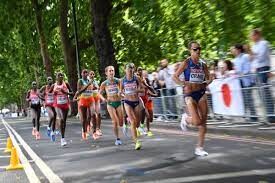
Not every American athlete will accept a spot, if offered. Some instead will choose to focus on a fall marathon, where they can earn substantial appearance fees and prize money that aren’t offered at worlds. Others won’t race at all this summer or fall, and instead they’ll train for the Olympic Marathon Trials in February 2024. How is it likely to shake out? Runner’s World reached out to the top seven men and women currently on the list or their coaches or agents to inquire about their plans. The window to run a qualifying time, however, remains open until the end of May. So a top performance in the next month could shake up the list.
Here’s what they said:
Women
Emily Sisson, 2:18:29, 2022 Chicago Marathon: Not likely, per her agent, Ray Flynn
Keira D’Amato, 2:19:12, 2022 Houston Marathon: Yes, if offered a spot
Betsy Saina, 2:21:40, 2023 Tokyo Marathon: No, she is focusing on a fall marathon
Sara Hall, 2:22:10, 2022 World Championships marathon: Has not yet decided
Emma Bates, 2:22:10, 2023 Boston Marathon: Not likely, per her agent, Ray Flynn
Susanna Sullivan, 2:24:27, 2023 London Marathon: Yes, if offered a spot
Aliphine Tuliamuk, 2:24:37, 2023 Boston Marathon: Will consider if offered a spot, per her agent, Hawi Keflezighi
Wild card: Will Molly Seidel run a May marathon?
Men
Conner Mantz, 2:08:16, 2022 Chicago Marathon: Not likely, per his agent, Ray Flynn
Scott Fauble, 2:08:52, 2022 Boston Marathon: No Elkanah Kibet, 2:09:07, 2022 Boston Marathon: Yes, currently deployed with the U.S. Army in Poland but will accept a spot if offered
Zachery Panning, 2:09:28, 2022 Chicago Marathon: Yes, per coach Kevin Hanson
Leonard Korir, 2:09:31, 2023 Paris Marathon: Did not immediately respond to a message from Runner’s World
Galen Rupp, 2:09:36, 2022 World Championships marathon: No, will run a fall marathon, per his agent, Ricky Simms
Futsum Zeinasellassie, 2:09:40, 2023 Rotterdam Marathon: Will consider if offered a spot, per his agent, Hawi Keflezighi
Wild card: Biya Simbassa runs the Prague Marathon, his debut, on May 7.
by Runner’s World
Login to leave a comment
USA Record For Hillary Bor Yields $59,000 Payday At Cherry Blossom 10 Mile
The 50th edition of the Credit Union Cherry Blossom 10 Mile here this morning ended with a bang when Olympic steeplechaser Hillary Bor not only won the men’s division of the USATF 10 Mile Championships, but also claimed a $50,000 bonus for breaking Greg Meyer’s 40-year-old national record by just two seconds.
Bor, 33, who represents Hoka One One and wore bib 13, clocked 46:11, three seconds behind overall race champion Tsegay Kidanu of Ethiopia. Including his prize money, Bor collected a total of $59,000.
“I came here to break the record and the weather wasn’t going to stop me,” Bor told Race Results Weekly, referring to the unusually cold temperatures and strong winds. “It’s something I’ve been working for since October last year.”
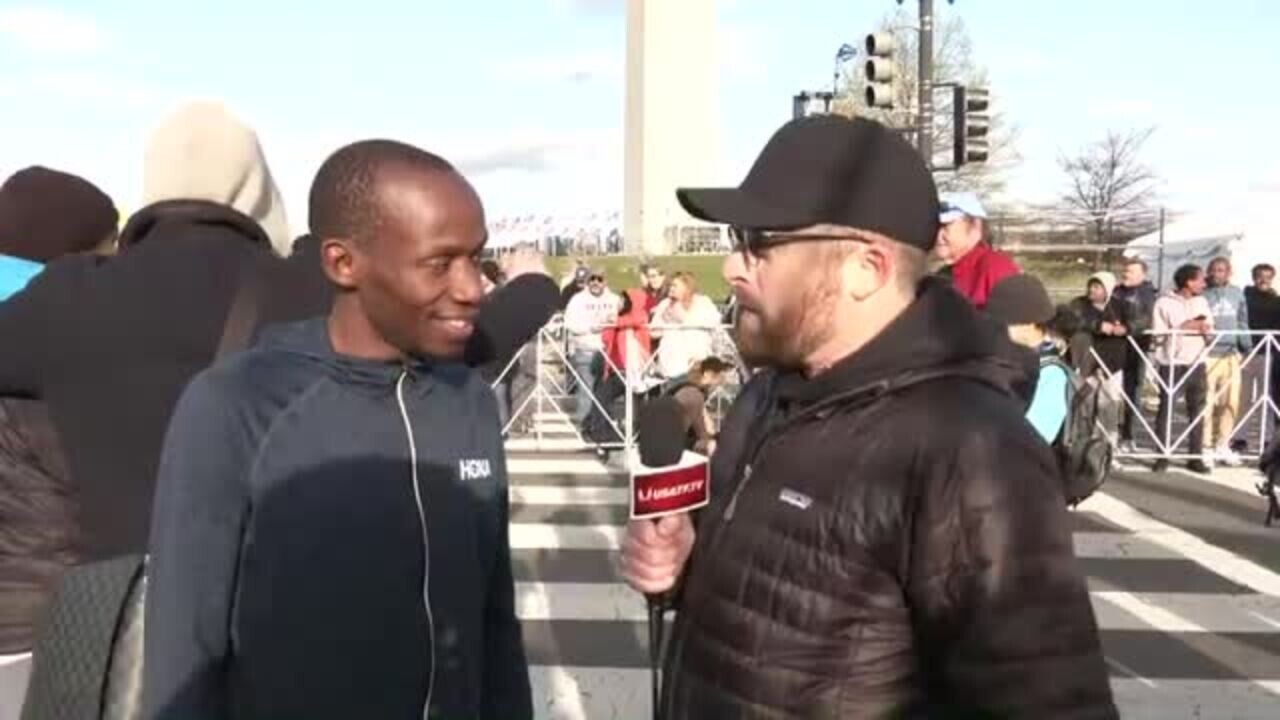
Last October Bor won the USATF 10 Mile Championships in St. Paul, Minn. He ran 46:06 in that race, a championships and course record, but that course was 31 meters downhill and not eligible for record setting. However, Bor and coach Scott Simmons realized that breaking Meyer’s mark was within his capabilities, especially because a faster time run by two-time Olympic medalist, Galen Rupp, was never ratified by USATF. Rupp ran a 10 mile split of 45:54 at the Row River Half-Marathon in Dorena, Ore., in October, 2020, but the paperwork for verifying that record was never completed or approved.
“My coach knew I was in really good shape to run 45 (minutes),” Bor said. “But, the weather’s not good today. The last two miles was just the wind on our face the whole time.”
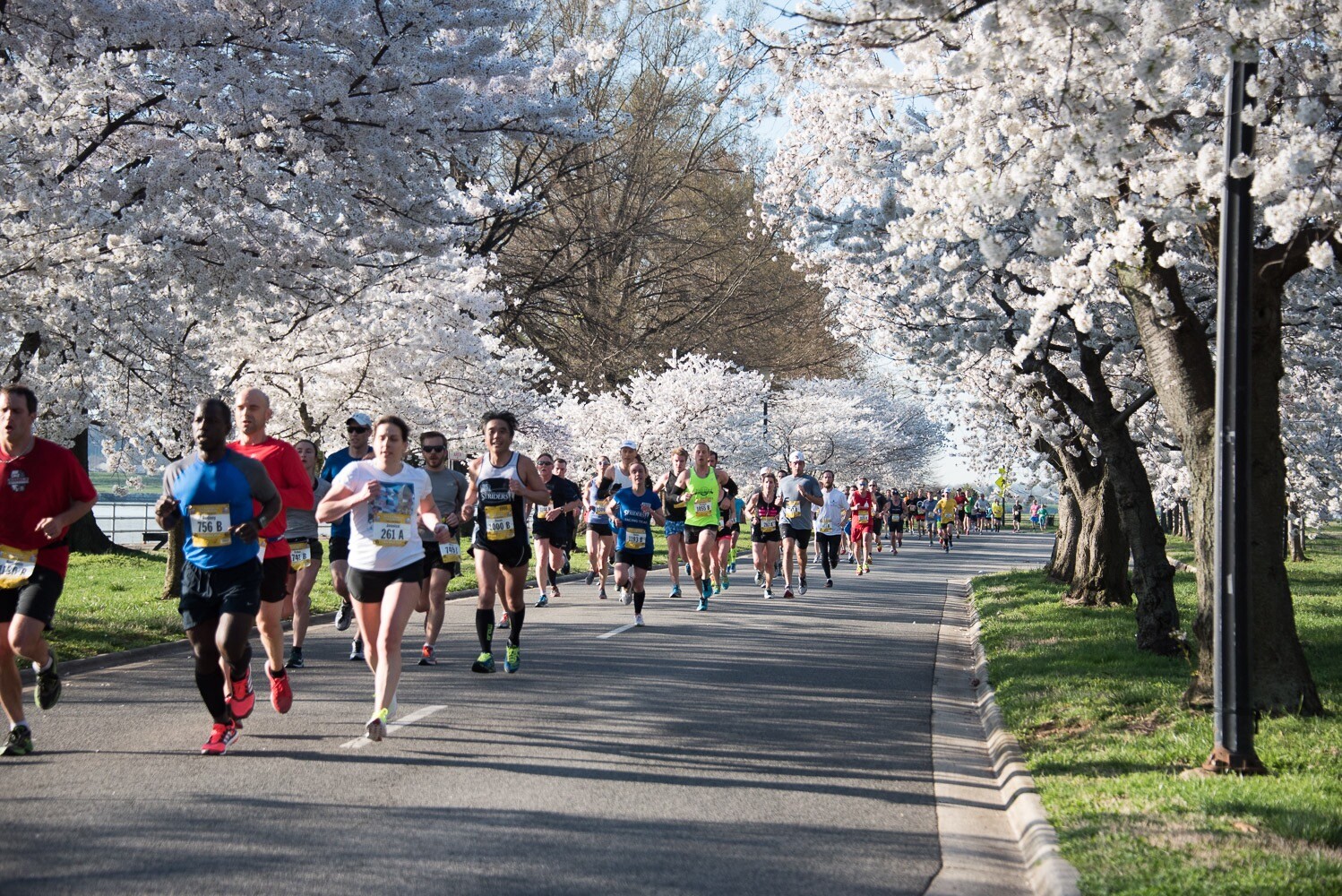
Indeed, it was in those last two miles that Bor and Kidanu did their best to push each other. Kidanu, who represents Asics, was just trying to keep up the pressure on Bor.
“The wind was very strong and it made it very tough,” Kidanu told Race Results Weekly through a translator. He continued: “At the beginning there were a lot of us, but later only a few of us. But the wind made it very difficult. Two of us were able to prevail and we battled one another. In the end, I was able to win.”
In the final sprint to the line, Bor wasn’t really sure where he stood against the clock. The wind was so strong that the 9-mile marker blew down, despite being weighted with sandbags. Also, Bor started the race without his watch.
“Today, I didn’t have my watch so that was not really good because I didn’t know the splits,” Bor said, looking slightly embarrassed. “When I saw the split at 8 miles I knew I needed to run 4:45, but the wind was too much. I just put my head down and just grind, and grind, and grind.”
Biya Simbassa (Under Armour) finished a distant third in 47:09 and finished second in the national championships division. Kenya’s Charles Langat (Asics) was fourth in 47:25, and Jacob Thomson (Under Armour) took fifth –and third in the national championships– in 47:27.
Bor, who will return to the steeplechase during the track season, said that today’s race was all about self-belief.
“It shows if you put something in your head you can accomplish it,” he said.
The women’s competition was a tale of two races.
In the overall competition, Uganda’s Sarah Chelangat (Nike) surged away from the field just before the five mile mark. Her six-mile split was a snappy 4:56, and that put her 22 seconds ahead at that point. Despite running directly into the wind (and alone) in the final miles, she was able to extend her lead to 30 seconds by the ninth mile, and 33 seconds by the finish. Her winning time of 52:04 was excellent given the conditions, but she fell well short of the 51:23 world best for an all-women’s race which would have given her a share of the race’s $50,000 bonus pool.
Behind Chelangat, there was a heated battle for both second place overall and the USATF title. In the ninth mile, Emma Grace Hurley (Atlanta Track Club Elite), Sara Hall (Asics), Nell Rojas (Nike), and Molly Grabill (Unattached) separated themselves from the rest of the pack, all of them trying for the national title. As they crested the final hill before the course turns slightly downhill to the finish line, Hall and Rojas were locked in a sprint for the win. Hall, who is running the Boston Marathon in 15 days, got the best of Rojas, 52:37 to 52:38.
Hall, who turns 40 on April 15, almost skipped today’s race. She just returned from a family trip to Ethiopia where her training didn’t go well because she got sick.
“Honestly, I feel so thankful for today because four days ago I wasn’t going to race,” Hall told Race Results Weekly. “I had COVID last week and training was just so rough. I had a fever. I had two different viruses back to back.”
But like Bor, Hall had the power of self-belief working for her today.
“I think my whole career I’ve just chosen to show up,” Hall said, wrapped in an American flag. “So, just today I decided to show up and I’m really glad I did, especially with Asics sponsoring this event.”
While the wind –which Rojas called “nasty”– was a challenge, Hall saw it as an opportunity to prepare mentally for Boston where conditions can be difficult, too. She thought about the 2018 race where temperatures were just above freezing and athletes had to run through a driving rain storm.
“I was thinking about Boston because, you know, 2018 with that headwind and the storm,” Hall said. “I have Boston in two weeks, so this is just a good time to practice.
Like Bor, Hall had thought about trying for a share in the record bonus pool, but discarded that idea when she felt the power of the wind.
“Normally, I would have wanted to go for the record out here, but with the significant wind I didn’t know if that was going to be in the cards, so I just chose to compete,” she said. “I think this was a great opportunity to do that with Boston coming up.”
With her win here today, Hall has won a total of 12 national titles, four at 10 miles (2017, 2018, 2019, and 2023).
Hurley finished fourth (third American) in 52:41, and Grabill got fifth (fourth American) in 52:42. Defending champion Susanna Sullivan, who led most of the first half of the race, finished seventh (sixth American) in 53:25. She’s running the TCS London Marathon in three weeks and has been doing heavy mileage.
“I’m ready to run a marathon,” she said, smiling, as she changed into warm clothes in the athlete recovery area.
Some 16,000 runners competed today after about 6,000 ran the companion 5-K yesterday (which took place in the rain). Several former race champions were on hand to celebrate the 50th edition, including Kathrine Switzer (1973), Greg Meyer (1983), Eleanor Simonsick (1982 and 1983), and Bill Rodgers (1978 through 1981). Race director Phil Stewart reflected on how the race had endured for so many years and through so many cultural and political changes.
“Through Watergate, gas crises, the fall of the Berlin Wall, the invention of the internet, the first and second Iraq Wars, the 2008 financial crisis, America’s first Black President, two impeachments, an insurrection and the War in Ukraine, runners have returned each spring for what is known as the ‘Runners Rite of Spring,'” Stewart said at last night’s pre-race dinner.
by David Monti
Login to leave a comment
Cherry Blossom Ten Mile Run
The Credit Union Cherry Blossom is known as "The Runner's Rite of Spring" in the Nation's Capital. The staging area for the event is on the Washington Monument Grounds, and the course passes in sight of all of the major Washington, DC Memorials. The event serves as a fundraiser for the Children's Miracle Network Hospitals, a consortium of 170 premier...
more...Defending Champions Return to Run 50th Anniversary Credit Union Cherry Blossom 10 Mile
Organizers of the 50th annual Credit Union Cherry Blossom 10 Mile (CUCB) announced today the first of two rounds of news about this year’s invited field; look for the second announcement to come out on Wednesday, March 29. Today’s announcement features past champions and top-5 finishers expected to toe the respective men’s and women’s starting lines on Sunday, April 2. (The elite women will start first, at 7:18 a.m., followed by the men and the masses at 7:30 a.m.)
Three past champions are part of the women’s elite field: Susanna Sullivan, last year’s women’s champion from Reston, VA; 2021 champion Nell Rojas from Boulder, CO; and 2013 champion Caroline Rotich, a Kenyan who lives in Colorado Springs, CO. As part of the 50th celebration two additional former champions are entered: Colleen De Reuck from Boulder, CO, who won the race in 1998 and still holds the women’s course record of 51:16; and 1973 winner Kathrine Switzer.
Other top women finishers from past 10 Miles include: Carrie Verdon from Boulder, CO, who placed second last year; Paige (Stoner) Wood, last year’s third place finisher from Flagstaff, AZ; Sara Hall, also from Flagstaff, who placed fourth in 2014; and Flagstaff’s Diane Nukuri, who was fifth in 2018.
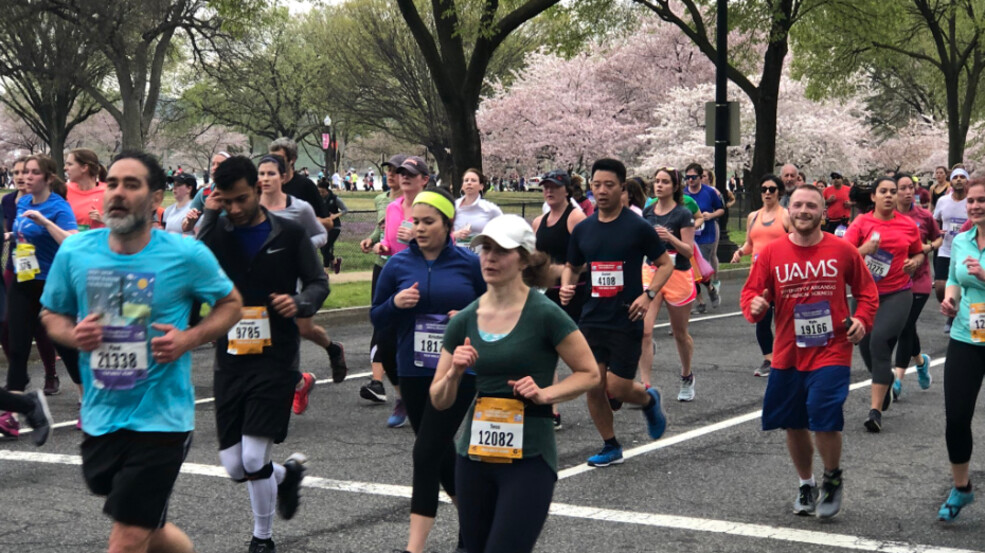
In the men’s race, the top-three finishers from 2022 return. All hailing from Kenya, they include champion Nicholas Kosimbei, second-place runner Wilfred Kimitei, and third-place finisher Shadrack Kimining. They’ll be joined on the starting line by second-place finisher in 2021 Abbabiya Simbassa from Flagstaff, AZ. Returning for the 50th running and starting a little bit farther back in the pack will be Bill Rodgers, from Boxborough, MA, who won the race four consecutive times between 1978 and 1981; placed second in 1982 and third in 1983; and has run CUCB a total of 22 times. Greg Meyer, whose American record of 46:13 still stands 40 years later, will be present for the 50th celebration, and will be holding the tape for the first American male finisher, who will be in hot pursuit of Greg’s mark — there’s a $50,000 shared bonus on the line for any American Records or World Bests set at the event.*
“It’s always a vote of confidence in the reputation of the event to see a large number of top finishers from previous years coming back. I am excited about this year’s set of repeaters, both past and present. This is another factor that will make our 50th anniversary special,” said Event Director Phil Stewart.
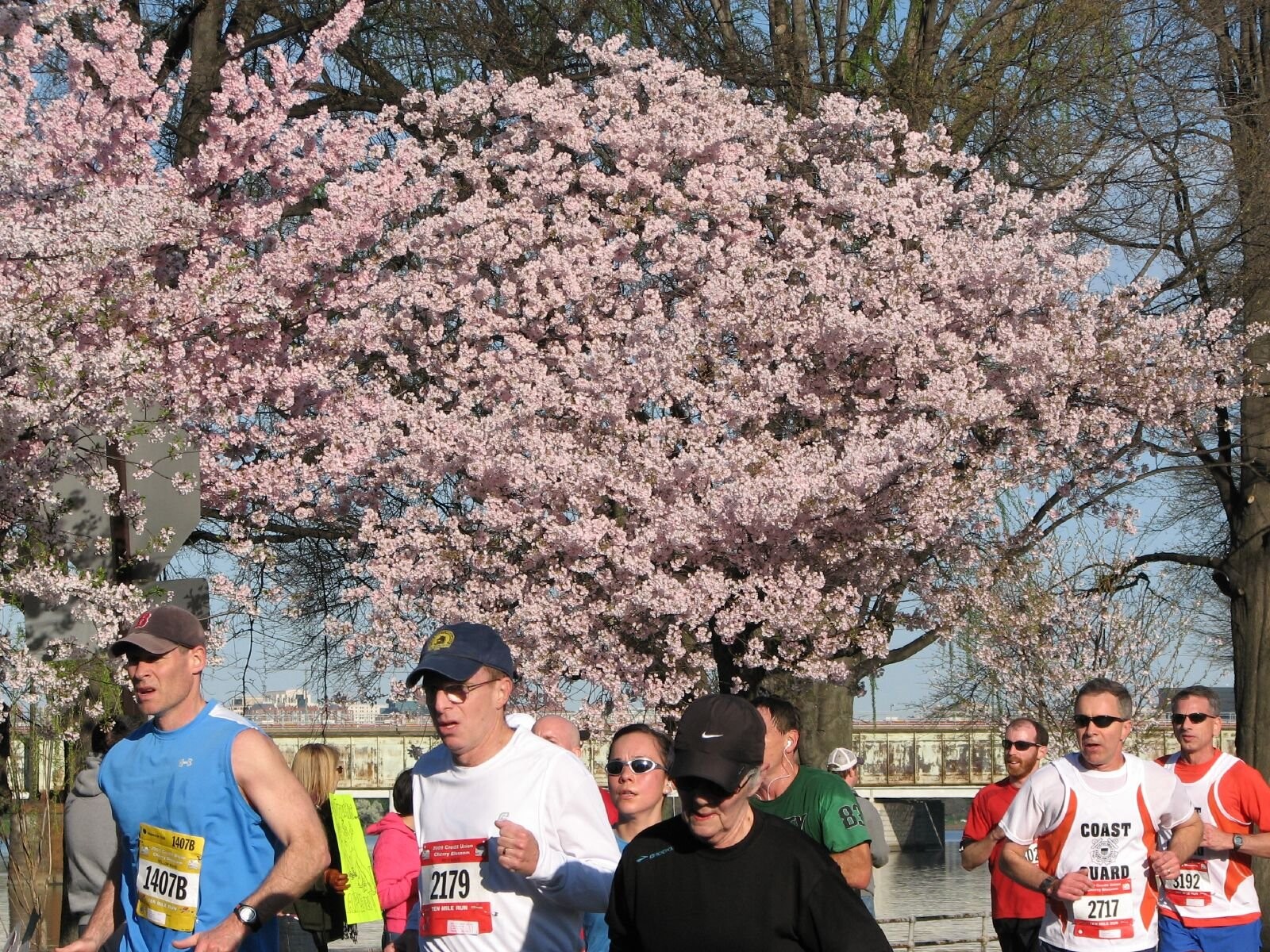
This year, international elite runners will be competing for $40,000 in prize money. The prize purse for Americans totals $25,000, and American runners placing in the top-10 overall are eligible to receive both open and American-only prize money. There is an additional $6,000 in RRCA RunPro Alumni Development Awards — runners eligible for the RRCA awards can also collect top-10 open and/or top-10 American payouts.
There is also a time-based set of bonus payments on offer for fast times:
• $50,000 to be shared by any runners setting a World Best or American Record*• Time incentives of $1,000 for the 1st male to run sub-46 minutes and 1st female to run sub-52 minutes, with an additional $750 on offer should a second male and/or female achieve those same sub-46 and sub-52 minute milestones.
The 10 Mile will serve as the USATF 10 Mile Championships, the RRCA National 10 Mile Championships, and the 2022-2023 Professional Road Racing Organization (PRRO) Circuit Championship.
Winners of the individual 2022-2023 PRRO Circuit events will be eligible for the $10,000 PRRO Super Bonus by winning the PRRO Championship (the bonus is split if an eligible male and female win the Championship). Susanna Sullivan and Nicholas Kosimbei are eligible for the PRRO Super Bonus. Any non-eligible winner of the PRRO Championship Super Bonus will earn $2500.
* If World Best times and American Records for men and women are set by the winners at the event (e.g. four records set), the $50,000 record bonus would be split into four $12,500 shares. If only one World or American record is set for either men or women, the athlete setting the record would get the full $50,000. If an American sets an American record and no other World or American records are set, he or she would receive the entire $50,000 as well. Currently, the times to beat are as follows:• Haile Gebreselassie’s (ETH) World Athletics Best of 44:24, run at the Tilburg 10 Mile in Tilburg, Netherlands, September 4, 2005;• Keira D’Amato’s World Athletics Best in a women’s only race of 51:23, run at the UpDawg 10 Mile in Washington, DC, November 24, 2020;• Greg Meyer’s American Record of 46:13, run at the Cherry Blossom 10 Mile in Washington, DC, March 27, 1983; and• Keira D’Amato’s previously mentioned World Best 51:23, which is also the American Record for a women’s only race.
For reference, the fastest CUCB time among the men’s field announced today is Kosimbei’s 45:15, which tied the event record set by Kenya’s Allan Kiprono in 2012. Among the elite women, Nell Rojas’s 52:13 from 2021 is the best CUCB finish time among this year’s elite entrants. Abbabiya Simbassa’s 46:18 from 2021 is the best CUCB mark among the American men, while Nell’s 52:13 is, of course, the leading mark among the American women.
The inaugural Cherry Blossom Ten Mile in 1973 was won by Sam Bair, in a time of 51:22; the women’s winner was Kathrine Switzer, in a time of 1:11:19; 127 men and 12 women ran that first race. Bill Rodgers holds the honor of most victories, with four consecutive wins between 1978 and 1981. Three women have each won the race three times: Julie Shea (1975-77), Lisa Weidenbach (1985, '89 and '90) and Lineth Chepkurui (2008-10). Ben Beach leads all Cherry Blossom finishers with an active streak of 49 years. A comprehensive media guide detailing a wide variety of statistics from the first 49 CUCB races is available here.
Thanks to Credit Union Miracle Day’s title sponsorship since 2002, the Credit Union Cherry Blossom Run has raised over $10.2 million for the Children’s Miracle Network Hospitals, including $323,000 in 2022.
About the Credit Union Cherry Blossom 10 Mile:
The Credit Union Cherry Blossom races, organized by Cherry Blossom, Inc., a 501c(3) chapter of the Road Runners Club of America, are known as “The Runner’s Rite of Spring®” in the Nation’s Capital. The staging area for Sunday’s 10 Mile is on the Washington Monument Grounds, and the course passes in sight of all of the major Washington, DC Memorials. In 2023, the reimagined Saturday 5K will stage on Freedom Plaza and traverse the route of Presidential Inaugurations down Pennsylvania Avenue before crossing the National Mall in the shadow of the Capitol Building and returning by the same route. The Kids Run is staged on the grounds of the National Building Museum. All events serve as a fundraiser for the Children’s Miracle Network Hospitals, a consortium of 170 premier children’s hospitals across North America. About one-third of the funds raised support Washington, DC’s own Children’s National (“Children’s Hospital”). The event also funds the Road Runners Club of America’s “Roads Scholar” program designed to support up-and-coming U.S. distance running talent.
Credit Union Miracle Day, Inc., a consortium of credit unions and credit union suppliers, is the title sponsor of the Credit Union Cherry Blossom 10 Mile, 5K, Kids Run and Virtual Run. Current presenting sponsors include ASICS, REI Co-op and Wegmans; supporting sponsors include CACI, Co-op Solutions, CUNA Mutual Group, FinisherPix, Gatorade Endurance, Guayaki, MedStar Health, PSCU, Potomac River Running, Suburban Solutions, The MO Apartments and UPS.
The 10 Mile is a proud member of the PRRO Circuit (PRRO.org), a series of this country’s classic non- marathon prize money road races with circuit stops in Washington, DC; Spokane, WA; and Utica, NY. The 2023 10 Mile will serve as the 2022-2023 PRRO Championship.
In addition to being sanctioned by USA Track & Field and the Road Runners Club of America, the Credit Union Cherry Blossom races have earned Gold Level Inspire Certification from the Council for Responsible Sport in recognition of its legacy of commitment to sustainability and thoughtful resource management.
To learn more, visit CherryBlossom.org and follow the event on social media @CUCB and #CUCB2023.
by David Monti
Login to leave a comment
Cherry Blossom Ten Mile Run
The Credit Union Cherry Blossom is known as "The Runner's Rite of Spring" in the Nation's Capital. The staging area for the event is on the Washington Monument Grounds, and the course passes in sight of all of the major Washington, DC Memorials. The event serves as a fundraiser for the Children's Miracle Network Hospitals, a consortium of 170 premier...
more...Eilish McColgan (30:00.87) and Alicia Monson (30:03.82) Break National Records At The TEN
The British and American records in the women’s 10,000 meters both went down late Saturday night in California as Eilish McColgan outdueled Alicia Monson over the final lap of The TEN in San Juan Capistrano. McColgan, the Commonwealth Games champion at 10,000 who is building up for her marathon debut in London on April 23, was only added to the field this week but felt confident in her fitness after five weeks of altitude training in Colorado. It proved an inspired decision as she ran 30:00.87 to narrowly break Paula Radcliffe’s British record of 30:01.09 set in August 2002.
A few seconds behind McColgan, Alicia Monson nabbed her second American record of 2023, running 30:03.82 to smash the previous record of 30:13.17 set by Molly Huddle in the 2016 Olympic final in Rio. Three weeks ago, Monson ran 8:25.05 at the Millrose Games to break the American indoor (and overall) record for 3,000 meters.
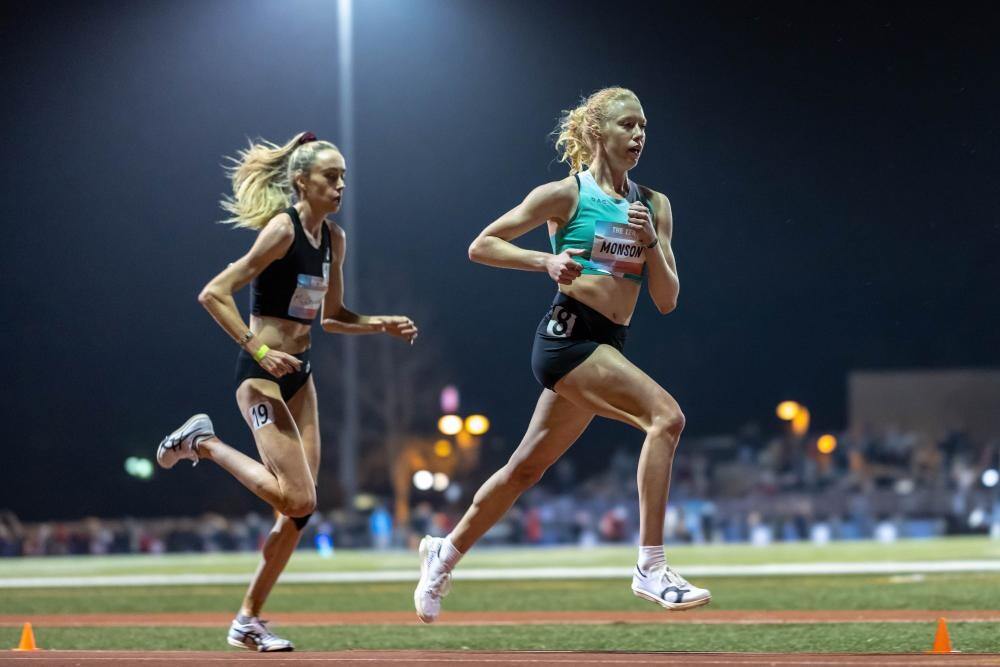
Both women were also safely under the 30:40 standard for the 2023 World Championships and 2024 Olympics on a good night for running fast (50-degree temps, still conditions).
Monson and her camp had billed the race as an American record attempt and they enlisted her On Athletics Club teammate Josette Andrews (a 14:51 5k runner) to handle pacing duties, along with Eleanor Fulton. When Andrews dropped out at 5k (15:09 for McColgan and Monson), they were actually a few seconds behind AR pace, but Monson took over and righted the ship, dropping the pace from 73-second laps to 72’s, then 71’s. By the bell, which Monson reached in the lead thanks to a 70.45 penultimate lap, the question was not whether the AR would go down, but whether either woman would break 30:00 – and of course, who would win the race?
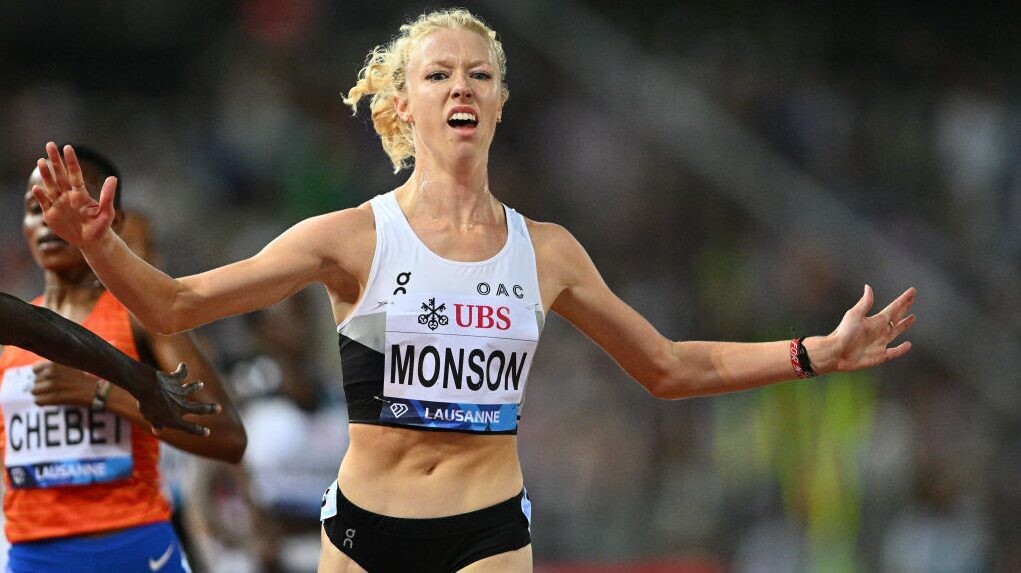
McColgan, who had clung faithfully to Monson throughout the race, finally went wide on the backstraight of the bell lap and passed Monson, and the American had no response as McColgan powered to victory with a 64.87 last 400m. Monson could not match that speed, closing out her effort in 67.99, and though she did not win, her American record was very well-deserved after so much grinding from the front.
No one else earned the World/Olympic standard, but a trio of Americans earned big personal bests in 3rd-4th-5th. Running just her second 10k, 2021 NCAA 5k champ Elly Henes won the battle for 3rd in 30:48.26 to edge 2022 Worlds team member Natosha Rogers (30:48.69) as both women moved ahead of Emily Sisson (30:49.57) and Deena Kastor (30:50.32) into 6th and 7th on the all-time US list. Rogers’ Puma Elite teammate Fiona O’Keeffe also got a pb in 5th, running 30:55.05 to become the 11th American woman to go sub-31.
Results (Analysis at bottom)
1 Eilish McColgan Asics 30:00.86 #$WRLD
2 Alicia Monson On Athletics Club 30:03.82 #$WRLD
3 Elly Henes Adidas 30:48.26
4 Natosha Rogers Puma Elite 30:48.69
5 Fiona O’Keeffe Puma Elite 30:55.05
6 Laura Galvan Hoka 31:04.08
7 Dominique Scott Adidas 31:14.00
8 Carrie Verdon TEAM Boulder 31:52.94
9 Susanna Sullivan unattached 31:55.80
10 Amy Davis-Green Hansons-Brooks ODP 32:10.59
11 Katie Izzo Adidas 32:22.47
12 Jeralyn Poe Tracksmith 32:39.10
Men’s race
The men’s race came down to a battle of the last two US 10,000-meter champions: Woody Kincaid and Joe Klecker. Just as he did five weeks ago over 5,000 meters in Boston, Kincaid earned the victory, though he made his move slightly earlier this time around, taking the lead with 900m to run and holding off Klecker on the last lap, closing in 55.96 to Klecker’s 56.92 as Kincaid ran 27:06.37 to Klecker’s 27:07.57. Both men ran personal bests (they now sit #5 and #7 on the all-time US list) and both hit the 2023 World Championship standard of 27:10, but neither was able to earn the Olympic standard of 27:00.
Klecker and Kincaid both went in with the aim of hitting the Olympic standard and joining Grant Fisher, Galen Rupp, and Chris Solinsky as the only American members of the sub-27:00 club. Klecker’s OAC teammate Ollie Hoare was the main pacemaker (though there were several: Ehab El-Sandali, Amon Kemboi, and Athanas Kioko all helped out) and he took them through 5k in 13:35, at which point British Olympian Sam Atkin, running with the lead pack, surprisingly dropped out.
When Hoare stepped off after covering 6400m in 17:23.90 (27:11 pace), sub-27:00 was within striking distance. But Klecker, despite working hard, could not increase the pace, and Kincaid showed no interest in sharing the lead despite Klecker motioning for him to do so.
By a mile to go, Klecker and Kincaid had dropped everyone else, and Kincaid, sensing the World standard slipping away, hit the front with 900 to go. Klecker stuck right with him, however, and it wasn’t until the final turn that Kincaid was able to gain real separation as both men closed well to get under the World standard – though not the Olympic standard.
Kioko, who stayed in the race, was the best of the rest, running 27:23.84 for 3rd, holding off Conner Mantz, who ran 27:25.30 in the midst of his Boston Marathon buildup (just .07 off his personal best from this meet last year).
Results (analysis below results) *Lap by lap splits
1 Woody Kincaid Nike 27:06.37 WRLD
2 Joe Klecker On Athletics Club 27:07.57 WRLD
3 Athanas Kioko pacer 27:23.84
4 Connor Mantz Nike 27:25.30
5 Jonas Raess On Athletics Club 27:26.40
6 Ren Tazawa Komazawa Univ 27:28.04
7 Nils Voigt Puma 27:30.01
8 Sam Chelagna US Army WCAP 27:38.02
9 Luis Grijalva Hoka 27:42.56
10 Alex Masai Hoka NAZ Elite 27:42.80
11 Wesley Kiptoo Hoka NAZ Elite 27:45.81
12 Ben Flanagan On Running 27:49.67
13 Kanta Shimizu Subaru 27:51.23
14 Benjamin Eidenschink unattached 27:51.74
15 Tatsuhiko Ito Honda 27:54.64
16 Aaron Bienenfeld unattached 27:55.96
17 Ahmed Muhumed unattached 27:56.99
18 Frank Lara Altra/Roots Running Project 28:00.75
19 Emmanuel Bor unattached 28:01.09
20 Alberto Gonzalez Mindez Guatemala 28:30.63
21 Zach Panning Hansons-Brooks ODP 28:35.52
Login to leave a comment
The Ten
The world's fastest 10,000m races each year have taken place in a sleepy little coastal town in southern California. More national records were broken in 2022 than any other race on the planet as the best in the western hemisphere launched into rarified zones of time and space. The best return to San Juan Capistrano this year to cap off...
more...Defending champions Chepngetich and Tura face strong opposition in Chicago
Ruth Chepngetich and Seifu Tura will defend their Bank of America Chicago Marathon titles on Sunday (9) but will take on stronger fields than they faced last year at the World Athletics Elite Platinum Label road race.
Chepngetich, the 2019 world champion, has won six of the eight marathons she has completed to date, and has finished on the podium in the other two. The Kenyan’s most recent victory came in Nagoya earlier this year when she smashed the course record with 2:17:18, just 10 seconds she of the PB she set in Dubai in 2019.
She has set PBs at a range of distances this year, on the road and track, so she could be in form to improve on her marathon best this weekend, provided she doesn’t go out too hard like she did in Chicago last year.
Ruti Aga looks to be one of Chepngetich’s strongest opponents. The Ethiopian has won just one marathon to date, but she has reached the podium in six other races, including New York in 2019 and three times in Berlin. Her PB of 2:18:34 was set in the German capital four years ago, while her last completed marathon was in Valencia in 2020.
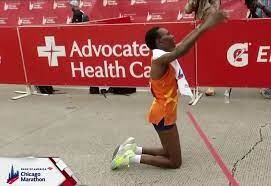
Kenya’s Celestine Chepchirchir heads into this weekend’s race in good form, having taken a few minutes off her PB to finish fourth in Seoul earlier this year in 2:20:10.
Compatriot Vivian Kiplagat won in Milan earlier this year in a PB of 2:20:18. She will be keen to improve upon her fifth-place finish in Chicago last year.
Haven Hailu is still a relative newcomer to the marathon, having contested just four races at the distance. She won in Rotterdam earlier this year in 2:22:01, not far off her 2:20:19 PB set in Amsterdam last year. Fellow Ethiopian Waganesh Mekasha is also one to watch. A 2:22:45 performer at her best, she will be contesting her first marathon in the US.
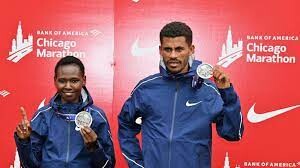
US women occupied two places on the podium in Chicago last year, and this Sunday Emily Sisson hopes to follow in those footsteps. A relative newcomer to the marathon, she clocked 2:23:08 on her debut at the distance in London in 2019. Earlier this year she broke the US half marathon record with 1:07:11 and has also set PBs for 15km, 20km and five miles.
One year on from his Chicago Marathon triumph, Tura returns to the US in good form as the Ethiopian aims to become the first back-to-back winner of the men’s race for more than a decade.
Tura, whose PB of 2:04:29 was set in Milan last year, started 2022 with a half marathon PB of 58:36 in Ras Al Khaimah. He followed that with a runner-up finish in Paris (2:05:10) and then went on to place sixth at the World Championships in Oregon.
Compatriot Herpasa Negasa has the fastest PB of the field, having clocked 2:03:40 in Dubai in 2019. He came close to that when finishing second in Seoul earlier this year in 2:04:49, but he is yet to win a marathon so he will be highly motivated this weekend.
Bernard Koech is another experienced marathon runner who has not yet won a race over the classic distance. He hasn’t raced since last October when he finished second in Amsterdam in a PB of 2:04:09.
Fellow Kenyan Elisha Rotich, meanwhile, is a winner of six international marathons. His most recent race over the distance was his 2:04:21 victory in Paris last year.
Former 1500m specialist Dawit Wolde, who represented Ethiopia in that event at the 2012 and 2016 Olympic Games, has transitioned to the marathon in recent years. He was third in Rotterdam last year in 2:04:27 and has finished on the podium in his past four marathons, including a win in Prague in 2019.
Stephen Kissa is even newer to the marathon. The Ugandan track specialist made a promising debut in Hamburg earlier this year, setting a national record of 2:04:48, which is also the fastest season’s best of this weekend’s line-up.
Others to look out for include 2021 Boston winner Benson Kipruto, Ethiopian half marathon record-holder Jemal Yimer, Daegu marathon champion Shifera Tamru, fellow Ethiopian Abayneh Degu, and Kenya’s Eric Kiptanui.
Elite fields
Women
Ruth Chepngetich (KEN) 2:17:08
Ruti Aga (ETH) 2:18:34
Celestine Chepchirchir (KEN) 2:20:10
Vivian Kiplagat (KEN) 2:20:18
Haven Hailu Desse (ETH) 2:20:19
Waganesh Mekasha (ETH) 2:22:45
Emily Sisson (USA) 2:23:08
Delvine Meringor (ROU) 2:24:32
Laura Thweatt (USA) 2:25:38
Sara Vaughn (USA) 2:26:53
Susanna Sullivan (USA) 2:26:56
Diane Nukuri (USA) 2:27:50
Men
Herpasa Negasa (ETH) 2:03:40
Bernard Koech (KEN) 2:04:09
Elisha Rotich (KEN) 2:04:21
Dawit Wolde (ETH) 2:04:27
Seifu Tura (ETH) 2:04:29
Stephen Kissa (UGA) 2:04:48
Abayneh Degu (ETH) 2:04:53
Benson Kipruto (KEN) 2:05:13
Shifera Tamru (ETH) 2:05:18
Eric Kiptanui (KEN) 2:05:47
Kyohei Hosoya (JPN) 2:06:35
Hamza Sahli (MAR) 2:07:15
Amanuel Mesel (ERI) 2:08:17
Hiroto Fujimagari (JPN) 2:08:20
Guojian Dong (CHN) 2:08:26
Kiyoshi Koga (JPN) 2:08:30
Riki Nakanishi (JPN) 2:08:51
Jemal Yimer (ETH) 2:08:58.
by World Athletics
Login to leave a comment
Bank of America Chicago
Running the Bank of America Chicago Marathon is the pinnacle of achievement for elite athletes and everyday runners alike. On race day, runners from all 50 states and more than 100 countries will set out to accomplish a personal dream by reaching the finish line in Grant Park. The Bank of America Chicago Marathon is known for its flat and...
more...Jemal Yimer and Rosemary Wanjiru take wins at Utica Boilermaker
Jemal Yimer Mekonnen of Ethiopia won the 45th running of the Boilermaker 15K Road Race presented by Excellus BlueCross Blue Shield, smashing a 12-year-old course record by 8 seconds in the race's return to its traditional first Sunday in July. Rosemary Wanjiru of Kenya took home the women's crown and a $10,000 Super Bonus as part of the Professional Road Racing (PRRO) 25th Championship.
Mekonnen won the 9.3 mile race with a time of 42:38, overtaking Edwin Kimutai of Kenya in the final mile and taking the win by 2 seconds. Mekonnen took home $7000 for winning the Boilermaker and a $2500 bonus for winning the PRRO Championship. He was not eligible for the PRRO Super Bonus, which requires a win in a previous series race.
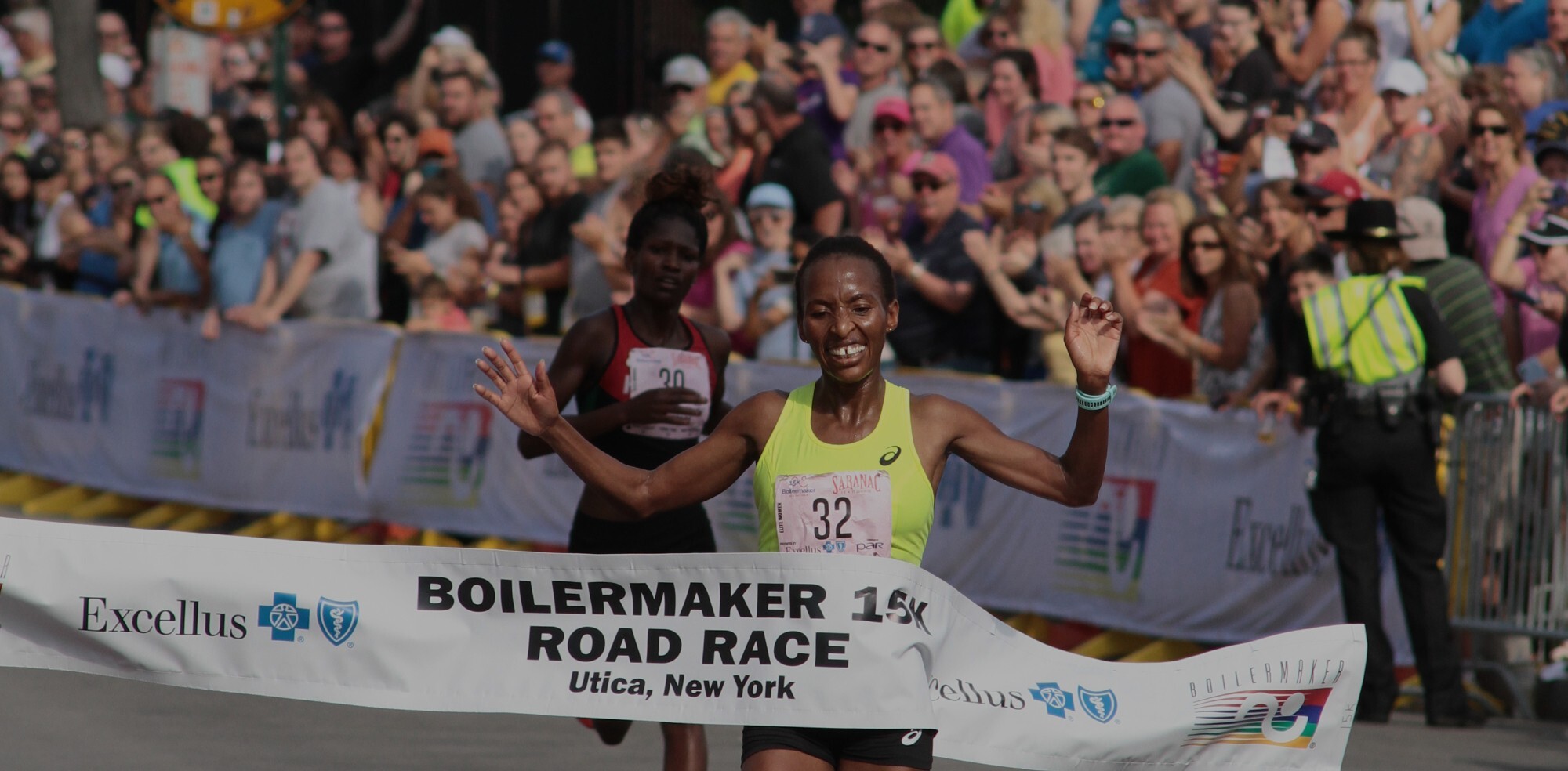
Mekonnen bested the Men's Open record of 42:46 set by Lelisa Desisa of Ethiopia in 2010.
Wanjiru, who previously won the Bloomsday Run in 2019, bested fellow-Kenyan Veronica Nyaru Wanj by nearly 20 seconds, finishing the race in 48:54. The women's course record is held by Edna Kiplagat of Kenya, who won the 2010 race with a time of 47:57.
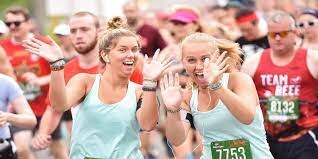
Wanjiru leaves the race as the PRRO Series Champion, winning $7000 from the Boilermaker in addition to the super bonus prize money from PRRO.
Sam Chelanga of Columbia, SC, the top American male, finished third overall with a time of 43:09, while the top American woman was Carrie Verdon of Boulder, CO. Verdon was the fifth overall female, finishing in 49:37.
As part of the PRRO Championship, runners who were eligible for the PRRO Super Bonus who finish in positions 2-10 in the men's and women's open divisions receive a $1500 bonus. On the men's side, Kimutai earned the $1500 PRRO bonus for his second-place finish in the men's open division, in addition to $4000 from the Boilermaker. On the women's side, Birukayit Degafa earned the $1500 PRRO bonus, in addition to $1500 for her fourth-place Boilermaker finish, while Susanna Sullivan takes home the $1500 PRRO bonus to go along with the $1000 she won for finishing sixth.
Last year's men's open winner, Syracuse native Stephen Rathbun, who now lives in Springfield, NJ, finished 23rd with a time of 47:15. Interestingly, Rathbun's finishing time was 17 seconds faster than his winning time from the October 2021 race. New Hartford native Savannah Boucher of San Antonio, TX, who won the women's open race in 2021 with a time of 56:24 was 14th in the women's open division with a time of 54:40.
Daniel S. Romanchuk of Champaign, IL, the world's top ranked wheelchair athlete, won the Boilermaker Men's 15K Wheelchair Race presented by Sitrin and NBT Bank with a time of 31:33, besting his own course record, set in 2018, by one second. Local favorite Hermin Garic of Utica finished second in the men's wheelchair division with a time of 35:25.
Jenna Fesemyer of Champaign, IL, won the women's race with a time of 43:01. Emily Sweeney of Montrose, NY successfully completed the Sitrin Wheelchair Challenge, finishing in 1:14:15, earning a custom-made racing wheelchair.
The race returned to its traditional second Sunday in July for the first time since 2019. A total of 5848 runners finished the 15K presented by Excellus BlueCross BlueShield, while 2848 finished the 5K presented by Utica National.
Michael Hennelly of Suffern, NY won the men's 5K with a time of 16:04, while Tricia Longo of Waterford, NY won the women's race in 17:49.
by Glen Andrews
Login to leave a comment
Boilermaker 15k
The Boilermaker 15K is the premier event of Boilermaker Weekend. This world krenowned race is often referred to as the country's best 15K. The Boilermaker 15K is recognized for its entertaining yet challenging course and racing's best post-race party, hosted by the F.X. Matt Brewing Company, featuring Saranac beer and a live concert! With 3 ice and water stops every...
more...Branna MacDougall joins Silvia Ruegger as the only Canadian woman to run under 2:29:00 before the age of 25
On the shores of Lake Superior in Duluth, Minn., Canada’s rising marathon star, Branna MacDougall, ran a five-minute personal best of 2:28:36 to place fifth at the 2022 Grandma’s Marathon. Her time is one minute under the world marathon standard of 2:29:30 and the seventh-fastest ever among Canadian women.
(First photo) Branna MacDougall of Kingston, Ont., approaches the finish line at the Muskoka Half-Marathon in 2020.
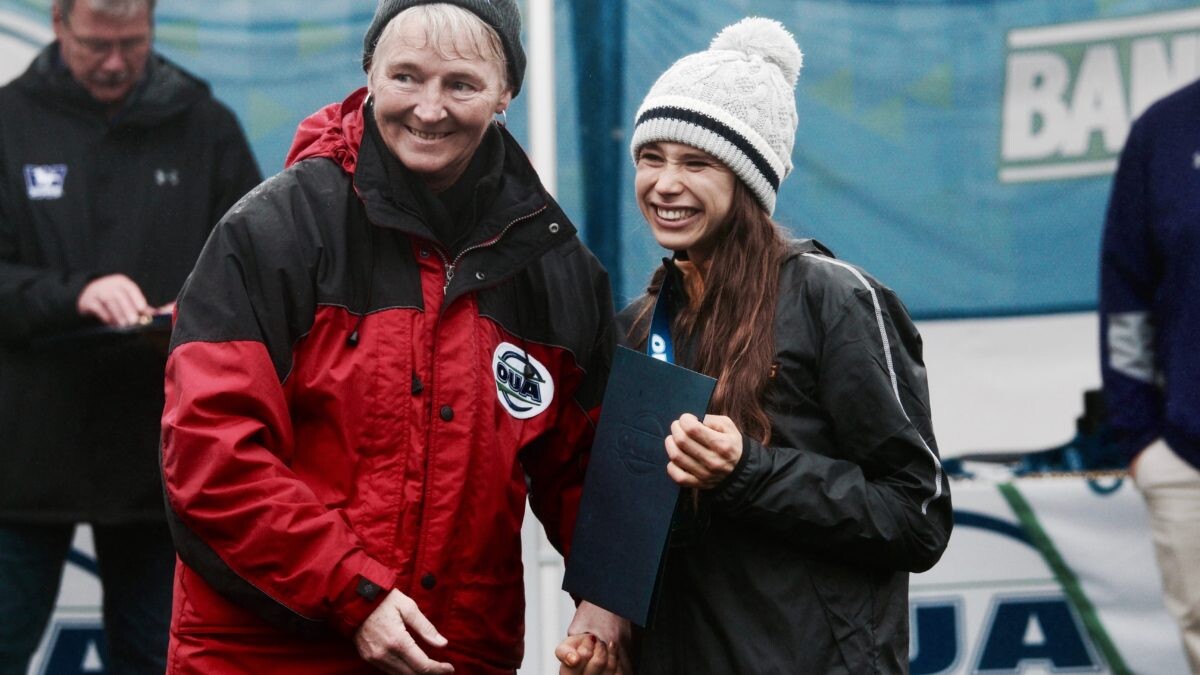
Although MacDougall had only tackled the marathon distance once before, she ran the race like a seasoned veteran. She negative split the second half of the race in 1:14:13, moving up to fifth from seventh place. Her first marathon, last fall, was in Muskoka, Ont., where she ran a solo 2:33:40.
MacDougall, 23, had a prolific cross-country career at Iowa State University and Queen’s University, winning the U Sports team title in 2019. Since then, she has continued her training in Kingston under former Queen’s coach Steve Boyd and Physi-Kult.
U.S. marathoner Dakota Lindwurm become the first Minnesotan to successfully defend her title, winning in a personal best time of 2:25:01, which is four minutes faster than her previous winning time of 2:29:04.
Sarah Sellers, who finished second at the Boston Marathon in 2018, and school teacher Susanna Sullivan of the U.S., rounded out the top three in 2:25:43 and 2:26:56, respectively.
MacDougall’s time is the second-fastest time by a Canadian woman this year, only behind Malindi Elmore’s 2:27:56 at the 2022 Boston Marathon. Although MacDougall’s time is under the 2022 world championship standard, the qualification period closed on May 29 and Canada’s team has already been named.
The 2022 Commonwealth Games qualification window closed on June 19, therefore, there’s a chance MacDougall could be selected to represent Canada in Birmingham, U.K., or considered for the 2023 World Championships in Budapest.
by Running Magazine
Login to leave a comment
Grandmas Marathon
Grandma's Marathon began in 1977 when a group of local runners planned a scenic road race from Two Harbors to Duluth, Minnesota. There were just 150 participants that year, but organizers knew they had discovered something special. The marathon received its name from the Duluth-based group of famous Grandma's restaurants, its first major sponsor. The level of sponsorship with the...
more...Sunday marked the first Cherry Blossom Ten Mile Run since 2019
A local runner won the Cherry Blossom Ten Mile Run for the first time since 1983.
Susanna Sullivan of Reston, Virginia, won the elite women’s race on Sunday.
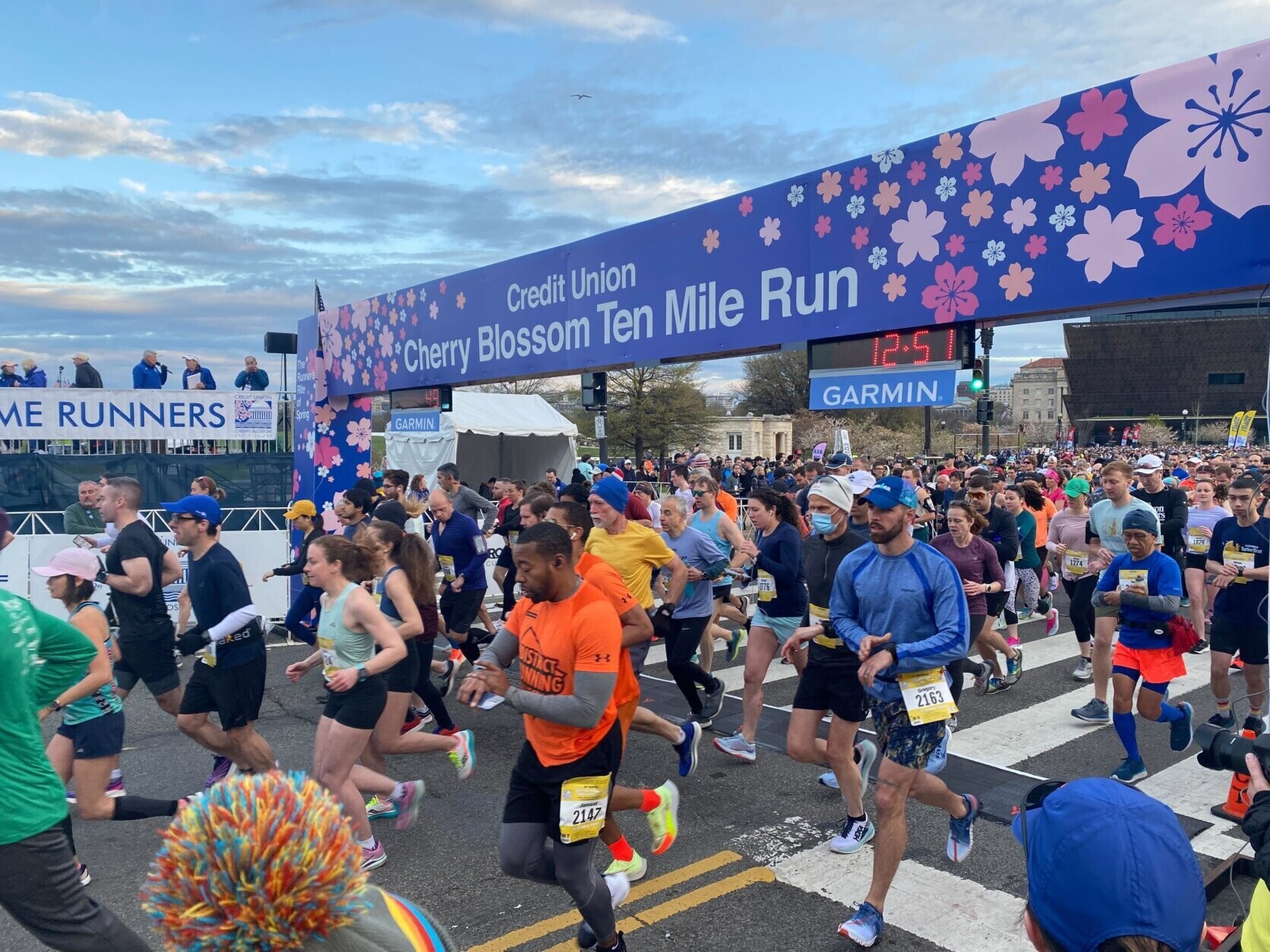
“It’s indescribable, I mean, I dreamed of this and it just kind of came together,” Sullivan told WTOP shortly after crossing the finish line. “I felt great coming into the race, training’s been going well, I run these roads every weekend. Crucial. The conditions were perfect. I had close friends and teammates out on the course. So it was just amazing.”
Her unofficial time clocked in at 52 minutes and 32 seconds, making it a personal record for the long distance athlete who is also a fifth grade teacher at Haycock Elementary School in Fairfax County.
“It’s almost a two-minute PR. And that doesn’t happen when you’re 31,” said Sullivan “I feel like I’ve gotten a lot stronger in the last few years. I think the pandemic gave me time to really focus on not racing and building a really strong base. And they’re just doing more strength stuff. And that’s really helped.”
Nicolas Kosimbai of Mill Valley, Kenya, won the elite men’s race and tied the course record with a time of 45 minutes and 15 seconds.
Sullivan and Kosimbai were joined by 17,000 other eager runners on the chilly April morning. The course and weather made for a lot of personal best times for many of the amateur racers.
“I knew I did well, because I had nothing left when I crossed the finish line and I wanted to collapse,” said Alex Crisafulli, who lives in Washington D.C.
Login to leave a comment
Cherry Blossom Ten Mile Run
The Credit Union Cherry Blossom is known as "The Runner's Rite of Spring" in the Nation's Capital. The staging area for the event is on the Washington Monument Grounds, and the course passes in sight of all of the major Washington, DC Memorials. The event serves as a fundraiser for the Children's Miracle Network Hospitals, a consortium of 170 premier...
more...World Record Holders, Olympians, National Champions set to Race B.A.A. 5K
The B.A.A. 5K and B.A.A. Invitational Mile will make a triumphant return to Patriots’ Day weekend, with professional fields featuring world record holders, Olympians, Paralympians, national champions, and local standouts. Held on Saturday, April 16, the B.A.A. 5K and B.A.A. Invitational Mile will kick-off festivities leading up to the 126th Boston Marathon on April 18.
“The B.A.A. 5K and B.A.A. Invitational Mile are two events entrenched in the fabric of Boston Marathon weekend, and each features a field which will lead to fast competition,” said Tom Grilk, President and Chief Executive Officer of the B.A.A. “With three years having passed since our last in-person edition of these races, we’re eager to return to the roads to crown champions.”
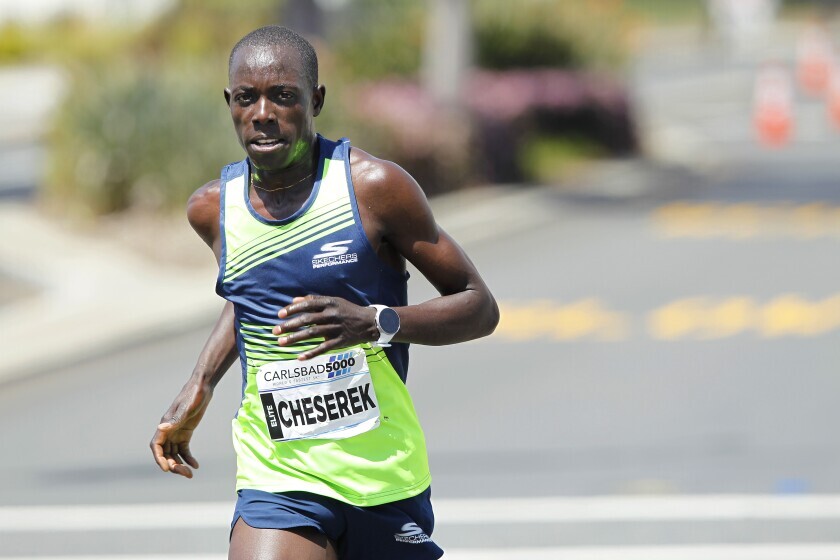
In the B.A.A. 5K, Ethiopia’s Senbere Teferi will make her Boston road racing debut. A two-time Olympian and two-time World Athletics Championships silver medalist, Teferi holds the women’s-only 5K world record of 14:29. She’ll be up against recently crowned American marathon record holder Keira D’Amato, 2021 U.S. Olympians Emily Sisson and Rachel Schneider, reigning U.S. 5K national champion Weini Kelati, and B.A.A. High Performance Team member Erika Kemp. The B.A.A. 5K course and American record of 14:50 –set by Molly Huddle in 2015—could very well be in jeopardy.
On the men’s side, 2019 B.A.A. 10K champion David Bett and 17-time NCAA champion Edward Cheserek, both of Kenya, will square off against New Zealand 5,000m indoor national record holder Geordie Beamish and 2021 U.S. Olympians Mason Ferlic and Joe Klecker. Stanley Kebenei, a World Athletics Championships finalist in the 3000m steeplechase, will also be part of the strong American charge. The B.A.A. 5K course and American record is 13:20, established by Ben True in 2017.
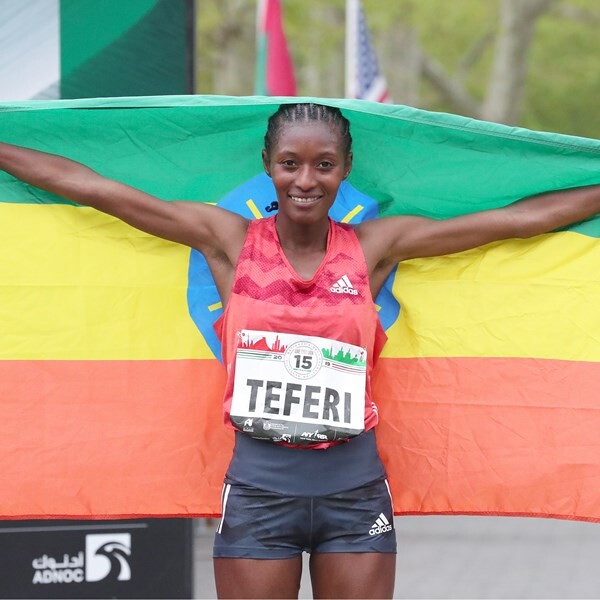
Boston Marathon wheelchair division champions Marcel Hug, Daniel Romanchuk, and Joshua Cassidy will all compete in the B.A.A. 5K less than 48 hours in advance of racing the 126th Boston Marathon. Vanessa de Souza, Shelly Oxley-Woods, and Jenna Fesemyer are top women’s wheelchair entrants.
Following the B.A.A. 5K, the B.A.A. Invitational Mile will take center stage on Boylston Street. U.S. Olympian, Bostonian, and reigning indoor 1,500m national champion Heather MacLean will race for the first time on the three-lap course that finishes at the Boston Marathon finish line. Among her competitors are B.A.A. High Performance Team member Annie Rodenfels, 2019 runner-up Emily Lipari, and Great Britain Olympian Katie Snowden. MacLean and Rodenfels won’t be the only Massachusetts residents toeing the line, as Belmont High School standout Ellie Shea will race among the professionals. Shea ran 9:08.54 for 3,000m during the indoor season, a time that stands as No. 5 on the all-time high school list and is a Massachusetts state record.
Shane Streich, fresh off an indoor American record at 1,000m, will lead the American men in the B.A.A. Invitational Mile along with 3:54 miler Colby Alexander. Neil Gourley of Great Britain is entered, as are Canadian William Paulson, the 2019 Pan-Am 1500m bronze medalist, B.A.A. racing team member Kevin Kelly of Ireland, and local standout James Randon of Rhode Island.
A complete professional field list for the B.A.A. 5K and B.A.A. Invitational Mile can be found below. Preceding the professional divisions of the B.A.A. Invitational Mile will be a scholastic mile and middle school 1K featuring student-athletes from the eight cities and towns along the Boston Marathon route. Entries for the high school and middle school events will be available on race weekend.
2022 B.A.A. 5K WOMEN’S FIELD (NAME, COUNTRY, ROAD 5K PB, TRACK 5000M PB)
Carmela Cardama-Baez, Spain, N/A, 15:25.41 (NR)
Kim Conley, USA, 15:29, 15:05.20
Keira D’Amato, USA, 15:08, 16:09.86
Emily Durgin, USA, 16:05, 15:24.19
Annie Frisbie, USA, 16:35, 16:05.78
Sammy George, USA, 15:53, 15:19.66
Tori Gerlach, USA, 15:56, 15:44.13
Marielle Hall, USA, 15:08, 15:02.27
Elly Henes, USA, N/A, 15:03.27i
Emma Grace Hurley, USA, 16:13, 15:57.23
Katie Izzo, USA, 16:00, 15:41.33
Weini Kelati, USA, 15:18, 14:58.24
Erika Kemp, USA, 15:45, 15:10.10
Melissa Lodge, USA, N/A, 15:53.81i
Sharon Lokedi, Kenya, 15:48, 15:13.04i
Betty Sigei, Kenya, N/A, 15:37.80
Emily Sisson, USA, 15:38, 14:53.84
Rachel Smith (Schneider), USA, N/A, 14:52.04
Emma Spencer, USA, 16:41, 16:04.95
Susanna Sullivan, USA, 16:35, 15:42.59i
Senbere Teferi, Ethiopia, 14:29 (WR), 14:15.29
Abbey Wheeler, USA, N/A, 15:40.67i
2022 B.A.A. 5K MEN’S FIELD (NAME, COUNTRY, ROAD 5K PB, TRACK 5000M PB)
Eric Avila, USA, 13:55, 13:18.68
Geordie Beamish, New Zealand, N/A, 13:12.53i (NR)
David Bett, Kenya, 13:54, 13:06.06
Ben Blankenship, USA, 13:56, 13:33.07
Robert Brandt, USA, N/A, 13:19.11
Sam Chelanga, USA, 13:43, 13:09.67
Edward Cheserek, Kenya, 13:29, 13:04.44
Adam Clarke, Great Britain, 13:42, 13:39.21
Graham Crawford, USA, 13:54, 13:22.68i
Aaron Dinzeo, USA, 14:25, 13:58.37
Brandon Doughty, USA, N/A, 13:39.06
Mason Ferlic, USA, 13:52, 13:24.94
Sydney Gidabuday, USA, 13:53, 13:22.66
Eric Hamer, USA, 14:43, 13:29.60
Brian Harvey, USA, 14:01, 14:13.93
Stanley Kebenei, USA, 13:53, 13:45.87
Joe Klecker, USA, N/A, 13:06.67
Kasey Knevelbaard, USA, 13:56, 13:24.98i
Lawi Lalang, USA, 13:30, 13:00.95
Matt McClintock, USA, 13:49, 13:47.68
Tim McGowan, USA, 14:11, 13:54.20
Reuben Mosip, Kenya, 13:34, 13:50.80a
Charles Philbert-Thiboutot, Canada, 14:04, 13:22.44
Brian Shrader, USA, 13:57, 13:29.13
Zouhair Talbi, Morocco, N/A, 13:18.17i
Aaron Templeton, USA, 13:48, 13:39.39
Josef Tessema, USA, 14:05, 13:22.28.
by Running USA
Login to leave a comment
B.A.A. 5K
The B.A.A. 5K began in 2009, and became an instant hit among runners from far and wide. Viewed by many as the “calm before the storm,” the Sunday of Marathon weekend traditionally was for shopping, loading up on carbohydrates at the pasta dinner, and most importantly- resting. But now, runners of shorter distances, and even a few marathoners looking for...
more...Fast times at the USATF Half Marathon Championships
The final stop on the 2021 USATF Running Circuit presented by Toyota did not disappoint, as Keira D’Amato and Conner Mantz came away victorious at the USATF Half Marathon Championships presented by Toyota in Hardeeville, South Carolina.
As the women’s race got underway, D’Amato, Allie Kieffer, and Natosha Rogers jumped to the front, putting a six-second gap on a chase trio of Erika Kemp, Makena Morley, and Lauren Paquette, coming through the 5 km split in 16:04.
The lead trio would run together until mile five, when D’Amato pushed the pace and was able to gap Rogers and Kieffer. D’Amato grew her lead quickly, coming through 10 km in 32:05, 12 seconds ahead of Kieffer, who had a nine-second lead on Rogers.
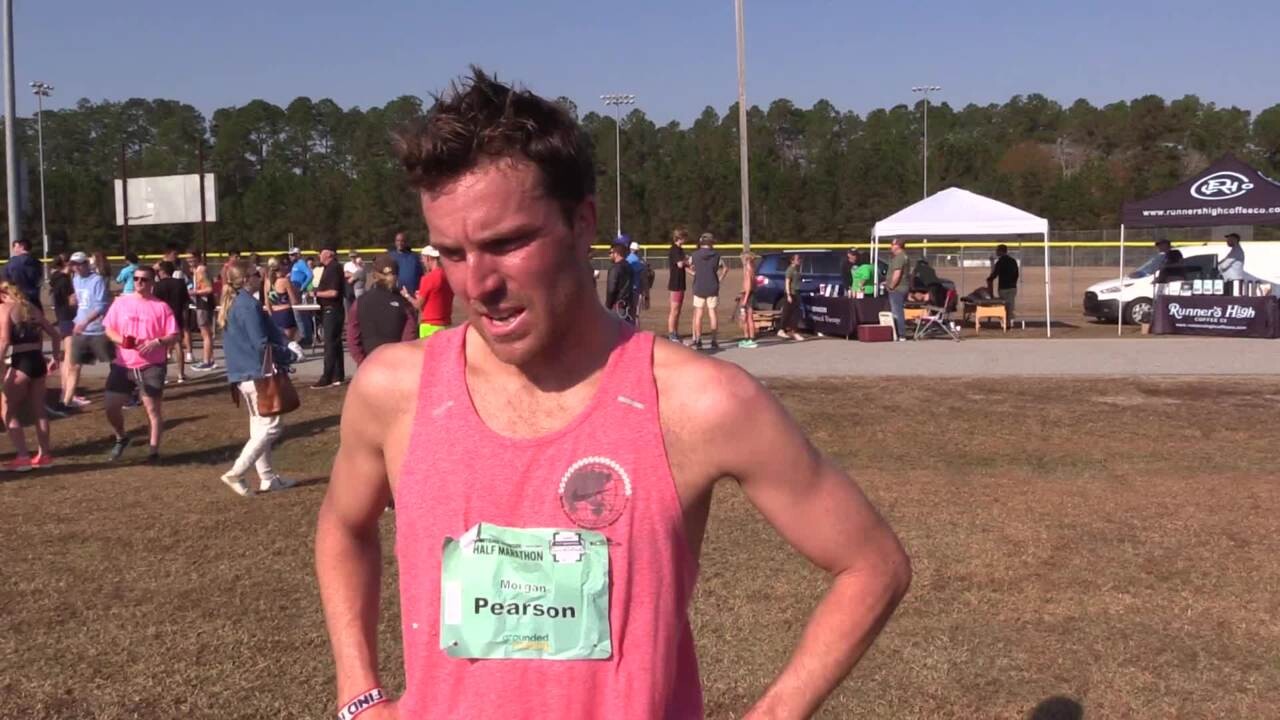
D’Amato would continue to grow her lead, running nearly a minute ahead of Rogers and Morley, who were running second and third. Kieffer sat in fourth a couple seconds back of the duo, as was Paquette.
Over the next 5 km, D’Amato grew her lead to 1:34 over Rogers and Dakotah Lindwurm, who ran a tremendous 10th and 11th mile to move up into the chase, while Paquette started to pull ahead of Morley for fourth.
With the finish line in sight, D’Amato pushed the pace once last time, crossing the finish line with her arms raised and a smile on her face, finishing the half marathon distance in 1:07:55.
Rogers held off the late-race push from Lindwurm to place second overall in 1:09:36, having yet another fine USATF Half Marathon Championship performance. Lindwurm ran an excellent back half of the race to take third in 1:09:40, just ahead of Paquette, who ran to a fourth-place time of 1:09:46, her debut at the half marathon distance.
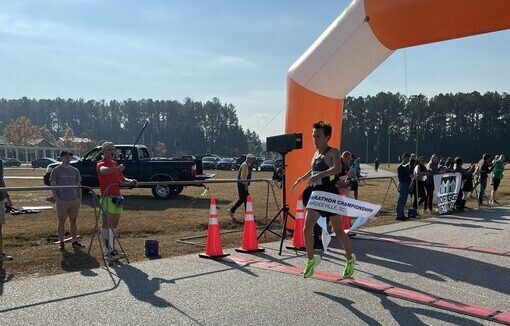
Morley held on over the final miles to place fifth in 1:09:57, edging out Erika Kemp, who placed sixth in 1:10:38. Kieffer faded a bit in the later stages of the race, but still place seventh overall in 1:10:44, while Maggie Montoya ran 1:11:21, Susanna Sullivan ran 1:11:58, and Jessie Cardin crossed in 1:12:08, as the trio took eighth through tenth.
While D’Amato ran a dominating performance to win Sunday, there was another race within a race, with Kemp and Morley battling for the 2021 USATF Running Circuit title. As the final race of the 2021 USATF Running Circuit season, Kemp entered Sunday’s action with a nine-point lead over Morley.
Early on Sunday, it seemed as though Morley might pull away and claim the overall title, but Kemp’s strong finish helped her outlast Morley. Kemp’s sixth-place effort claimed her the overall USATF Running Circuit title with 62.5 points, just ahead of Morley’s 55 points. Emily Durgin finished with 49 points to place third overall, while Lindsay Flanagan and Annie Frisbie earned fourth- and fifth-place finishes with 34 points and 30 points.
A large group led the men’s race early Sunday morning, with all of the pre-race top contenders in tow. Reigning NCAA Division 1 cross country champion Mantz led the way early, as Sam Chelanga, Lawi Lalang, and Augustus Maiyo also ran up front, as the pack found hit a groove, running 4:40 mile pace for the early miles.
As the men came through 10 km, Mantz continued to lead, with Chelanga, Maiyo and Morgan Pearson off his shoulder. Over the next 5 km, Pearson and Mantz would take turns pacing, while Maiyo and Chelanga right behind with Lalang.
As the lead group passed through mile 10, Lalang started to drop off, while Clayton Young and Nico Montanez moved up. The pace continued to ratchet down, as the group formed a single file line, with Mantz and Pearson pushing ahead.
With a mile to go, it was now a three-man race, with Mantz, Chelanga and Montanez running together. Chelanga tried to push the pace and break up the group, but Mantz hung tough and wouldn’t concede any ground to Chelanga.
In a furious kick to the finish, Mantz showed his championship-level form, pulling away from Chelanga to claim his first USATF title, crossing the finish in 1:00:55 in his debut over the half marathon distance.
Chelanga took home second place in 1:00:59, a strong finish to his 2021 USATF Running Circuit season, as Montanez placed an impressive third in 1:01:13, his second top three finish on the USATF Running Circuit season and less than two months after placing seventh at the Bank of America Chicago Marathon.
Clayton Young, who won the USATF 15 km Championship title, the first race of the USATF Running Circuit season, finished fourth overall on Sunday in 1:01:18. Futsum Zienasellassie had another strong performance to take fifth in 1:01:21, as Maiyo finished well to take sixth in 1:01:33.
Olympian Leonard Korir took home seventh in 1:01:43, just ahead of Pearson, who claimed eighth in 1:01:47. Frank Lara and Lawi Lalang rounded out the top ten crossing the finish in 1:02:19 and 1:02:49, respectively.
While he didn’t race Sunday, Abbabiya Simbassa claimed the 2021 USATF Running Circuit overall title with 77 points, well ahead of the rest of the field, after claiming two USATF victories and two runner-up efforts during the 2021 USATF Running Circuit season.
Chelanga’s runner-up finish in Hardeeville gives him 48 points and a second place finish in the overall USATF Running Circuit standings, followed closely by Young, who claimed third with 47.5 points. Montanez finishes fourth on the season with 37 points, while Fred Huxham places fifth on the season with 30 points.
Login to leave a comment
American Women Offer Most Intriguing Storyline of 2021 Credit Union Cherry Blossom Ten Mile Run
Jenny Simpson is the course record holder (4:16.1) and eight-time winner of the Fifth Avenue Mile — the farthest she’s ever raced on the roads. Jenny is also a three-time Olympian (2008, 2012 and 2016 bronze medalist) and three-time World Championship medalist (gold in 2011, silver in 2013 and 2017). Sara Hall, on the other hand, has run the second fastest marathon ever (2:20:32) for an American woman, and has won 11 USATF National Championships on the roads since 2006, including 10 mile titles in 2018 and 2019. Hall was 2nd American (52:54) when the USATF 10 Mile Championships were last hosted by the Credit Union Cherry Blossom Ten Mile (CUCB) in 2014.
But Simpson and Hall aren’t the only two American women entered in the 2021 USATF 10 Mile Championships Presented by Toyota. They just define the two extremes of road racing experience represented in what is sure to be an interesting and exciting race for the title of America’s best over 10 miles in 2021.
When Hall and Simpson line up for the women’s-only start at 7:18 a.m. this coming Sunday morning, September 12, they will be joined by Americans Diane Nukuri, Annie Frisbie, Natosha Rogers, Susanna Sullivan, and Bethany Sachtleben, among others. But no runner comes into the race with the same momentum Hall has as winner of three road races this summer, while setting a personal best for 10K on the roads (31:33) at the Mastercard New York Mini. Nukuri may have raced more frequently, with six top-10 road race performances over the last six months, but it was her 5th place result at CUCB 2018 (53:56) that best argues for her inclusion in the conversation about pre-race favorites.
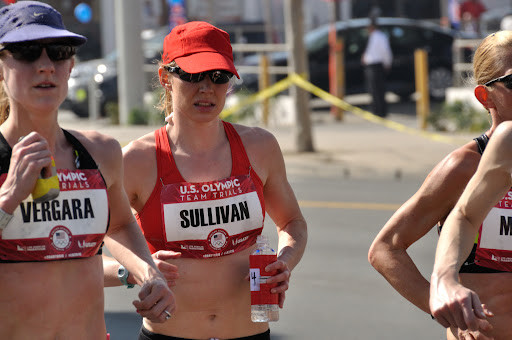
Hall is 38 years old, Simpson is 35 and Nukuri is 36, but this won’t just be a race among veterans if Annie Frisbie has her way. In fact, the 24 year-old Frisbie prevailed over Nukuri at two races this summer, and boasts a 54:00 personal best for 10 miles from the 2019 USATF 10 Mile Championships, when she placed 5th. Another sub-54 minute performer (53:45), Natosha Rogers (30), placed second at the 2017 USATF 10 Mile Championships and returns to the roads after a spring and summer of racing on the track in quest of an Olympic team slot in the 10,000m.
Top DC-area runners Susanna Sullivan (31) and Bethany Sachtleben (29) have proven themselves to be worthy competitors over the years, with Sachtleben placing 3rd among Americans at CUCB 2018 and 2nd among Americans in 2019. Sullivan was 4th American at CUCB in 2014, 5th in 2015 and 3rd in 2017.
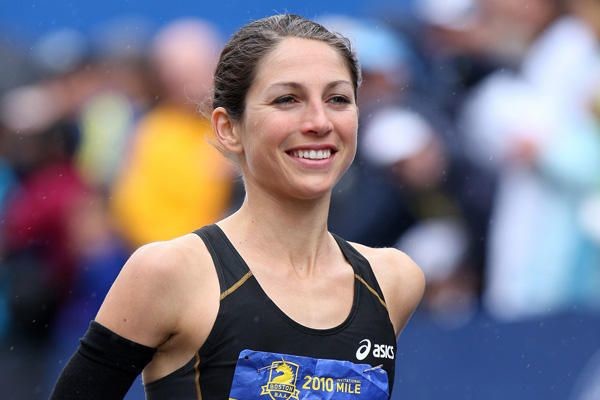
American runners will be competing for a total of $26,000 in U.S.-only prize money, from $5,000 for 1st place to $500 for 10th place, paid equally to men and women.
Of course, there’s an international component to the 2021 Credit Union Cherry Blossom Ten Mile as well. And Kenyans Iveen Chepkemoi (24) and Caroline Rotich (38) will lead the women’s chase for an international prize pool of $20,000, with $5,000 for 1st place down to $150 for 10th place, again paid equally to men and women. American runners placing in the top-10 overall are able to “double-dip” and claim the appropriate payment from both international and U.S.-only prize pools.
Chepkemoi boasts the fastest 10-mile personal best among all the women (51:43), while Rotich won CUCB in 2013 (52:46).
So, who will prevail? The rookie Simpson? One of the 38 year-old veterans, Hall or Rotich? Or one of the 24 year-old up-and-comers, Frisbie or Chepkemoi? There’s an all-out 10-mile race between here and the answer.
A stellar field of American and international men will take to the same 10-mile course at 7:30 a.m. this Sunday, in pursuit of the same titles, prize money and bonuses as the women. Bonuses on offer include $10,000 for a World Record (44:23 men/51:23 women), another $10,000 for an American Record (45:54 men/51:23 women) — either of which will be split evenly among any men and women record breakers — as well as time bonuses of $1,000 and $750 for the first two runners to break 46:00 for men or 52:00 for women. Finally, there is a special prize pool of $1500/$1000/$500 for both men and women who have taken part in the Road Runners Club of America (RRCA) RunPro Camp or Roads Scholar programs.
Chris Derrick (30) comes into the USATF 10 Mile Championships with the fastest personal best among the American men (46:53), which he ran at CUCB 2018, placing 5th. He, like many of the other men and women in the race, however, has his sights set on one of the many fall marathons this year, and may be racing on tired legs.
Abbabiya Simbassa (30) will also be racing on tired legs, having run the 2021 USATF 20K Championships on Labor Day in New Haven, CT, where he placed 2nd, just one-second shy of the title. Add that to the 2nd places he ran at the 2021 USATF 15K Championships in March, and the recent Asics Falmouth Road Race, and you can imagine how Simbassa’s legs feel going into CUCB 2021. Simbassa was also 2nd American at CUCB 2018 and 2nd at the 2019 USATF 10 Mile Championships (46:57).
A cluster of other American men with 10-mile personal bests that should be competitive include Kiya Dandena (46:58), Augustus Maiyo (47:05), Elkaneh Kibet (47:15), Willie Milam (47:18), Noah Droddy (47:28), and Louis Serafini (47:35). Dandena (32) set his personal best at CUCB 2017, when he was 3rd American; he was also 5th American in 2019 and 7th in 2018. Maiyo (38) set his personal best at the 2019 USATF 10 Mile Championships, while placing 5th. Kibet (38) placed 3rd at the 2017 EQT Pittsburgh 10 Miler. Milam (29) ran his best time at CUCB 2019. Serafini (29) was the 6th American at CUCB 2019, and set his personal best at the 2019 USATF 10 Mile Championships, while Droddy (30) ran his best at the 2016 USATF 10 Mile Championships, placing 2nd.
Despite the presence of so many competitive American men, Kenyan runners typically dominate the overall race up front. Stephen Sambu (33) comes into the race with a personal best of 45:29 from his first CUCB victory in 2014. Sambu clearly has the most experience on DC roads of anyone in the field, with wins in 2014 and 2015, a 4th place finish in 2013, and a 5th in 2019.
Two other Kenyans, Dominic Korir (28) and Edwin Kimutai (28), are also very worthy of mention. Dominic Korir was 6th overall in CUCB 2017 in a time of 46:45. Kimutai ran 2:08:15 for 4th place at the Harmony Geneva marathon for UNICEF last May. Sadly, Kimutai’s wife passed away on August 23rd — he’ll be running in her memory, and for a young daughter suddenly left without a mother.
The top American man and woman will each earn a spot on Team USA for the 2022 World Athletics Half Marathon Championships, to be held in Yangzhou, China, on March 20, 2022. Should the winning American man or woman decline their Team USA slot, the second place finisher will be offered the slot; there will be no “rolling down” beyond second place.
by Running USA
Login to leave a comment
Cherry Blossom Ten Mile Run
The Credit Union Cherry Blossom is known as "The Runner's Rite of Spring" in the Nation's Capital. The staging area for the event is on the Washington Monument Grounds, and the course passes in sight of all of the major Washington, DC Memorials. The event serves as a fundraiser for the Children's Miracle Network Hospitals, a consortium of 170 premier...
more...48th Edition of Credit Union Cherry Blossom Ten Mile Run to Feature Strong Men’s and Women’s Fields
It has been a long time coming — too long — and America’s finest distance runners are eager to toe the starting line at the 2021 Credit Union Cherry Blossom Ten Mile (CUCB), to be held in our Nation’s Capital on Sunday, September 12. With $26,000 in U.S. championship prize money on offer as well as a $10,000 bonus for an American Record (the bonus will be split if both the male and female break the American records), road racing fans can look forward to hotly contested races among both the men and women.
“It has been nearly two years since the last time the U.S. Ten Mile Championships for men and women were held,” said event director Phil Stewart. “I know a host of talented Americans are eager to take an important middle-distance test as most of them prepare for fall marathons, of which there are plenty, with all six World Marathon Majors events taking place over a six-week period between September 26 and November 7.”
This will be the third time one or more of the USATF 10 Mile Championships have been hosted by CUCB alongside the traditional international competition: the women’s championships were part of the 2013 Credit Union Cherry Blossom Ten Mile, with Janet Bawcom winning the title in 53:28 while placing fourth overall. A year later in 2014, race organizers hosted both the men’s and women’s championships. Christo Landry (46:41) was the first American to cross the finish line—in sixth place overall—while Bawcom repeated as the U.S. women’s champion by placing second overall in 52:12. Both of Bawcom’s times established American records at the time.
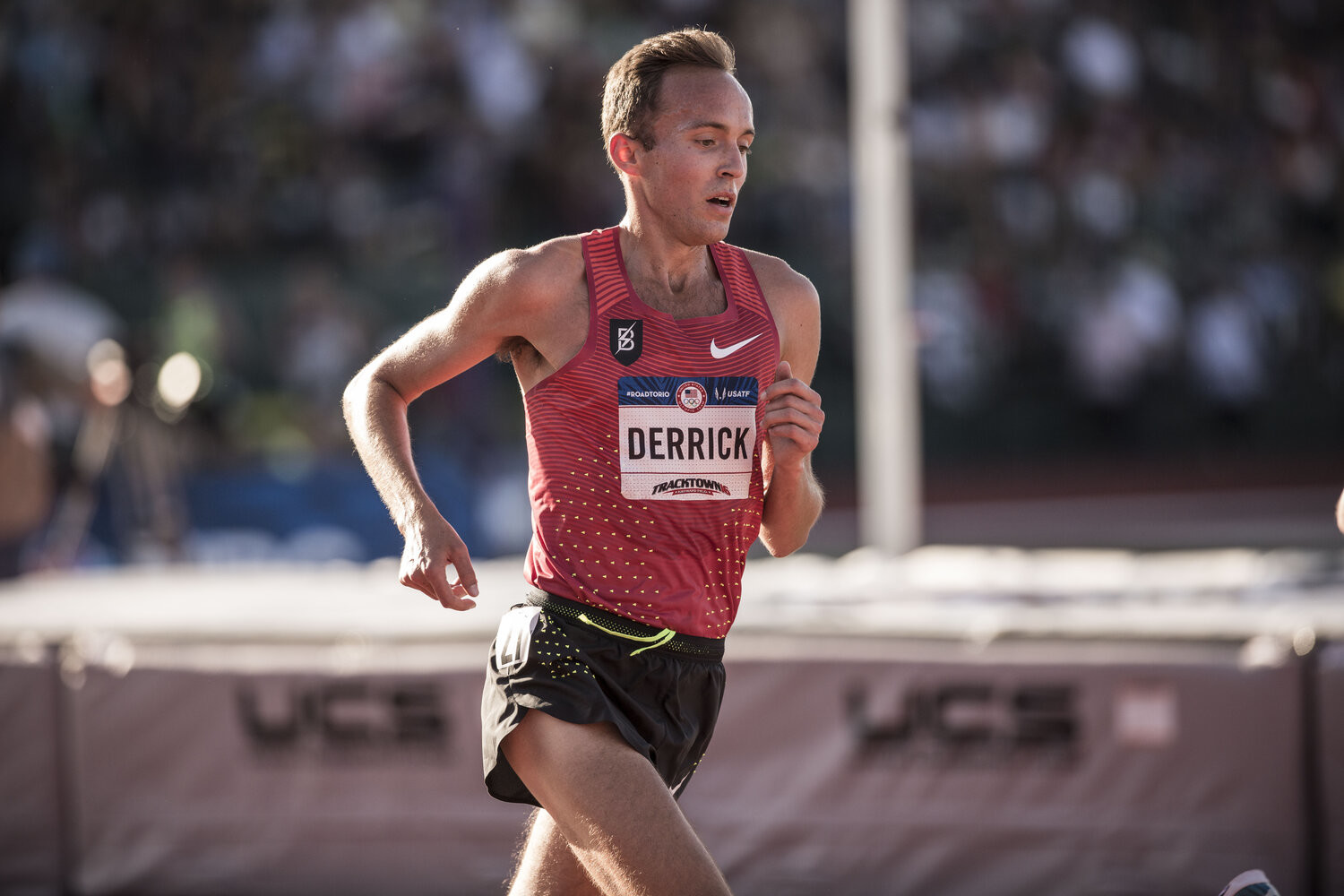
Keira D’Amato broke Bawcom’s American Record last fall at the Up Dawg Ten Mile, running 51:23 in a small invitational race organized by the Cherry Blossom Race Committee specifically for her to chase Bawcom’s record. D’Amato’s effort was recently verified as a women’s only World Record by the Association of Road Racing Statisticians as well. (ARRS is the only organization keeping world records at the 10-mile distance.)
D’Amato will be joined on the starting line by two American women who have broken 53 minutes for 10 miles: Jordan Hasay (52:49) and Emma Bates (52:51). Three other Americans have run 54:00 or faster: Natosha Rogers (53:45), Diane Nukuri (53:56), and Annie Frisbie (54:00).
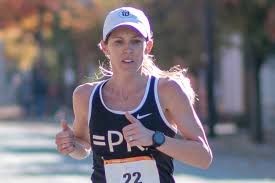
On the men’s side, Futsum Zienasellassie will be defending the USATF 10 Mile Championship he won in Minneapolis in 2019 (the last time American runners competed for this title, thanks to Covid-19). His winning time of 46:55 is one of four sub-47:00 marks among the American men entered in the race. Chris Derrick boasts the fastest personal best (46:53), which he ran at CUCB in 2018 when he was top American and fifth overall. Abbabiya Simbassa ran 46:57 to place second behind Zienasellassie in Minneapolis in 2019, and Kiya Dandena ran 46:58 in 2017 at CUCB. The current pending men’s American record is 45:54 set by Galen Rupp last fall. Rupp’s time bettered Greg Meyer’s time of 46:13 from the 1983 Cherry Blossom Ten Mile.
Here’s a complete listing of elite American athletes who have confirmed their entry into the 2021 Credit Union Cherry Blossom Ten Mile, with personal bests noted in parentheses:
Women:
Keira D’Amato (51:23)
Jordan Hasay (52:49)
Emma Bates (52:51)
Natosha Rogers (53:45)
Diane Nukuri (53:56)
Annie Frisbie (54:00)
Bria Wetsch (54:14)
Susanna Sullivan (54:22)
Bethany Sachtleben (54:42)
Grayson Murphy (54:51)
Carrie Verdon (56:57)
Danielle Shanahan (31:22.9 10K)
Amy Davis (32:13 10K)
Abbie McNulty (33:07 10K)
Stephanie Bruce (1:09:55 half marathon)
Nell Rojas (1:10:45 half marathon)
Men:
Chris Derrick (46:53)
Futsum Zienasellassie (46:55)
Abbabiya Simbassa (46:57)
Kiya Dandena (46:58)
Augustus Maiyo (47:05)
Elkanah Kibet (47:15)
Girma Mecheso (47:22)
Noah Droddy (47:28)
Louis Serafini. (47:35)
Emmanuel Bor (47:39)
Reed Fischer (47:50)
Shadrack Biwott (47:53)
John Raneri (47:53)
Tyler McAndless (47:56)
Dhruvil. Patel (48:37)
Frank Lara (48:37)
Joel Reichow (48:41)
Alex Monroe (48:57)
Willie Milam (49:10)
Robert Brandt (27:39.2 10K)
Brendan Gregg (44:25 15K)
Reid Buchanan (44:40 15K)
Emmanuel Roudolff (1:04:08 half marathon).
by Running USA
Login to leave a comment
Cherry Blossom Ten Mile Run
The Credit Union Cherry Blossom is known as "The Runner's Rite of Spring" in the Nation's Capital. The staging area for the event is on the Washington Monument Grounds, and the course passes in sight of all of the major Washington, DC Memorials. The event serves as a fundraiser for the Children's Miracle Network Hospitals, a consortium of 170 premier...
more...Keira D’Amato Is Trying to Break the American 10-Mile Record on Monday. It Could Cost Her Thousands of Dollars.
Since 2011, Keira D’Amato has been part of the race committee for the Credit Union Cherry Blossom Ten Mile Run, the famous Washington, D.C. road race held along the banks of the Potomac River. She’s held a few different roles over the years; recently she’s been responsible for coordinating speakers for clinics at the race expo. This year, Molly Huddle was one of the scheduled speakers, and D’Amato told her she believed Huddle could break the women’s-only American record of 52:12, set by Janet Bawcom at Cherry Blossom in 2014 (coincidentally, D’Amato held the finish line tape for that race). After telling Huddle about the record, D’Amato realized something: I can run that fast too.
Over the following six months, as D’Amato has risen from obscurity to one of the best distance runners in the United States, that statement has become blindingly obvious. After running a personal best 2:34:24 to finish 15th at the Olympic Marathon Trials in February, the 36-year-old has spent the summer and fall demolishing her pbs, from a 15:04 time trial 5,000 on the track in June to a 32:33 10,000 at the MVMNT Race Series in July to a 68:57 to win the Michigan Pro Half Marathon on October 28.
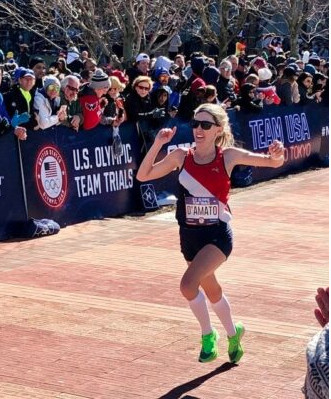
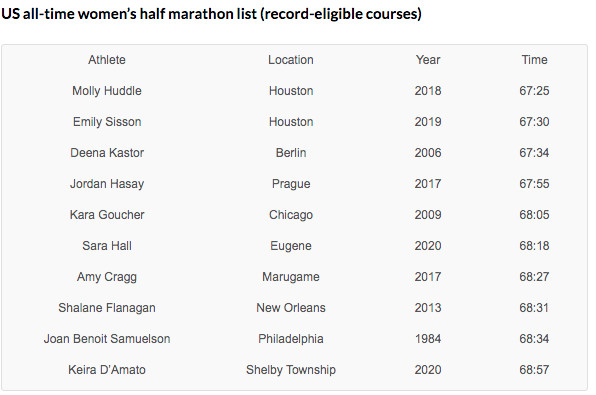
On Monday, D’Amato will try to back up her claim from the spring: she’s going for Bawcom’s record at the Up Dawg Ten Miler, where she’ll face a five-woman professional field that includes Olympian Molly Seidel. And that leads into one of the oddest statistics of a very odd year.
If D’Amato had broken the record at Cherry Blossom in April (which cancelled its 2020 edition due to COVID-19), she would have earned a $10,000 bonus.
If D’Amato breaks the record on Monday — or even if she doesn’t — she could end up out around $8,000.
That’s because D’Amato is covering most of the costs of the Up Dawg Ten Miler, which will take place in an undisclosed location in the DC area. Even though D’Amato is staging a race for five athletes rather than Cherry Blossom’s typical 17,000, several key expenses remain: getting the course USATF-certified and measured, securing park permits and road closures. It can add up quickly.
And then there is drug testing. USATF rules state drug testing is only required to ratify American records in events for which World Athletics recognizes an official world record. Since 10 miles is a “world best” distance, that means drug testing isn’t required to ratify an American record at the Up Dawg Ten Miler — but D’Amato is leaning toward including it anyway to avoid all doubts. However, based on the quote she received from USADA, it would run her an extra $3,000-$3,500. She hasn’t made a final decision yet.
There is an online store selling race merchandise to help offset the cost of the event. And around 20 members of the CUCB organizing committee have also chipped in a total of $2,000 — and, more importantly, their time — so that D’Amato can chase the record.
“If there was a way to measure intensity per person, this race would be much more intense [than the Cherry Blossom Ten Mile Run],” says CUCB event director Phil Stewart. “We’re not dealing with getting 17,000 people entered in the race and moving them around or ordering as many porta potties or things like that, but this is a group of special individuals. I’ve spent a lot of time being consumed by making sure that we have all of the conditions set for the record to be accepted if the record is broken. If Keira or anybody breaks the record here, the worst nightmare would be that there was some little USATF rule that I didn’t know about that was required for an American record to be set.”
Stewart knows that feeling all too well; last year, Stanley Kebenei thought he had broken Greg Meyer‘s American 10-mile record at Cherry Blossom, only for it to be revealed that a set of cones had been improperly placed, making the course 240 feet short (CUCB still paid Kebenei the $10,000 bonus).
With no mass race entries to fund the Up Dawg Ten Miler, CUCB will lose money on the event. But it’s worth it to Stewart to support D’Amato, whose meteoric rise he has followed first-hand — Stewart was among a group of CUCB committee members who traveled to Atlanta to support her in the Trials in February.
“One of the things that has been fun about [this event] is that in a time when there’s so much downbeat news, I think a lot of people have gotten excited about working on something that’s upbeat,” Stewart says.
And D’Amato? Well, in keeping with her carefree, laid back demeanor, she’s trying not to think about the cost and electing to focus on the positives. Five fast women (Susanna Sullivan, Bethany Sachtleben, and Emily Durgin round out the field) are gathering on Monday at 8 a.m. to race 10 miles. There will be a free live stream, with commentary, on the CUCB Facebook page. This should be fun, right? No. This will be fun.
“For me, it’s not about the money at all,” D’Amato says. “Right now when everyone’s starving for motivation and opportunity, I felt like this would be a service to the running community. And it fell in line really perfectly with my training too.”
Keira D’Amato’s return to competitive running began with a joke. Which, if you know anything about D’Amato, could not be more fitting.
D’Amato loves all things humor. The name of Monday’s race, Up Dawg, was her idea — a nod to a joke from The Office. When D’Amato joined Strava a few years ago, she began using jokes or puns to title her runs. Sample entry: November 16. My cousin, a magician, decided to incorporate the use of trapdoors in his shows. But I think it’s just a stage he’s going through. She used to rely on her children’s popsicle sticks for material or by asking her Amazon Alexa, “Tell me a joke.” As she amassed Strava followers (she’s over 2,600 now), she began receiving suggestions from fans — which delights her to no end.
“You have no idea how awesome it is that when people hear a funny joke, they think, Oh, I need to send this to Keira,” she says.
D’Amato’s impishness was on display during Christmas 2016, when she decided to gift her husband, Anthony, an entry to the 2017 Shamrock Marathon, held in March in Virginia Beach.
“Who gives someone a gift of a marathon entry?” D’Amato says. “Because that means you have to start training a lot. It’s kind of a backhanded compliment gift, I guess. But then I felt a little bad, so I signed up too.”
D’Amato was no stranger to running. A four-time All-American at American University under coach Matt Centrowitz, she finished 6th at the 2005 NCAA XC champs as a senior, ahead of future stars Amy Cragg, Molly Huddle, and Jenny Simpson. She remains friendly with the Centrowitz family, and is even in a fantasy football league with Olympic 1500 champ Matthew Centrowitz — let’s just say both D’Amato and Centro are better runners than fantasy football managers.
“I think at one point, I was in second-to-last and he was dead last,” D’Amato says. “But I also think Centro does a whole bunch of them, so maybe in his other leagues he’s doing better. But it was either the first or second week, I played him, and I crushed him.”
After graduating in 2006, D’Amato (then known as Keira Carlstrom) spent a few years running for DC Elite, a post-collegiate group coached by Scott Raczko — better known as the coach of Alan Webb. By 2008, she had lowered her 1500 personal best to 4:22, but was in constant pain, beset by a series of stress fractures and ankle pain. Her issues were the result of a condition known as a tarsal coalition — an abnormal bridging of bones in the foot — but the surgery to correct it was not covered by her insurance.
So D’Amato “retired” and got a job at mortgage giant Freddie Mac. Even after undergoing surgery to correct her condition in 2009 (her new job had better insurance), D’Amato ran sparingly for the next seven years. In her first run back after giving birth to her daughter, Quin, in August 2016 (she also has a six-year-old son, Tommy), D’Amato couldn’t make it through a three-minute run without walking. Yet she steadily built up ahead of Shamrock, and despite hail, sleet, and brutal winds on race day, D’Amato blew past her pre-race goal of 3:25.
“I couldn’t run slow enough to do that pace,” says D’Amato, who ran 3:14.
D’Amato felt there was a lot left in the tank, and took her next marathon, in Richmond in November, more seriously. After running 2:47 there — just two minutes off the Olympic Trials standard — she knew it was time to return to serious training. She reunited with Raczko, and steadily dropped her times while balancing running with her career as a realtor. When she ran a pb of 2:34 to finish 15th at the Trials at age 35, it looked like the culmination of a remarkable three-year journey.
In reality, D’Amato was just getting started.
Since the Trials, D’Amato has run personal bests over almost every distance. Her 15:04 5,000 doesn’t officially count because it came in a time trial rather than a race, but it’s faster than the Olympic standard of 15:10 and would have ranked her 6th in the US during the 2020 outdoor season.
Her most impressive performance came in last month’s Michigan Pro Half Marathon, where she clocked 68:57, 47 seconds ahead of runner-up Emma Bates, a 2:25 marathoner who finished 7th at the Olympic Trials. That made D’Amato the second-fastest American half marathoner on the year, behind Sara Hall, and 10th on the US all-time list. She is now in very elite company.
by LetsRun
Login to leave a comment


